A page devoted to news items, snippets of (mainly) silent film information, unfounded rumours and the occasional moan!
2 January 2024
 Silent Film Live Events Preview – January The month opens at BFI Southbank with the first of three screenings of Murnau’s Sunrise; A Song of Two Humans (1927)albeit with just a recorded score. Thankfully there is live accompaniment at London’s Prince Charles Cinema from musician Hugo Max, playing along to The Cabinet of Caligari (1920). The Prince Charles is also screening Harold Lloyd classic Safety Last
Silent Film Live Events Preview – January The month opens at BFI Southbank with the first of three screenings of Murnau’s Sunrise; A Song of Two Humans (1927)albeit with just a recorded score. Thankfully there is live accompaniment at London’s Prince Charles Cinema from musician Hugo Max, playing along to The Cabinet of Caligari (1920). The Prince Charles is also screening Harold Lloyd classic Safety Last  (1923) with a recorded score. The Kennington Bioscope opens its 2024 season at The Cinema Museum with Phantom Of The Opera (1925), but perhaps not in a version you have seen before, being the rarely screened version restored by Photoplay Productions and released in 2003. The Cinema Museum also hosts the quarterly
(1923) with a recorded score. The Kennington Bioscope opens its 2024 season at The Cinema Museum with Phantom Of The Opera (1925), but perhaps not in a version you have seen before, being the rarely screened version restored by Photoplay Productions and released in 2003. The Cinema Museum also hosts the quarterly  meeting of the Blinking Buzzards, the UK Buster Keaton Society, who will be screening The Cameraman (1928).
meeting of the Blinking Buzzards, the UK Buster Keaton Society, who will be screening The Cameraman (1928).
Neil Brand has a busy January with five performances of his Presenting Laurel & Hardy show, in Chester, Litchfield, Newark, Basingstone and St Albans, which features two of the boys finest silent  shorts, Big Business and Liberty. The month ends with a Lubitsch gem at BFI Southbank, Lady Windermere’s Fan (1925), and Mary Pickford rarity Heart o’ the Hills (1919) at the Kennington Bioscope, both with live musical accompaniment.
shorts, Big Business and Liberty. The month ends with a Lubitsch gem at BFI Southbank, Lady Windermere’s Fan (1925), and Mary Pickford rarity Heart o’ the Hills (1919) at the Kennington Bioscope, both with live musical accompaniment.
Full details of all of these screenings are available here. Happy viewing folks and don’t forget to look out for our February preview, coming soon.
30 November 2023
 Silent Film Live Events Preview – December The nights may be drawing in and thoughts turning to Christmas but there is still plenty going on in the silent film world to pique your interest. First up is the very first Wareham Silent Film Weekender, which hopefully will become a regular feature on the silent film festival programme. The Weekender runs from Friday 1st to Sunday 3rd December. The subjects
Silent Film Live Events Preview – December The nights may be drawing in and thoughts turning to Christmas but there is still plenty going on in the silent film world to pique your interest. First up is the very first Wareham Silent Film Weekender, which hopefully will become a regular feature on the silent film festival programme. The Weekender runs from Friday 1st to Sunday 3rd December. The subjects  for this first weekender are 1920s Hollywood film royalty, Mary Pickford and Douglas Fairbanks. The programme kicks off on the Friday evening with Fairbanks at his swashbuckling best in The Mark of Zorro (1920) and concludes on the Sunday with him reprising this role in Don Q, Son of Zorro (1925). In between,
for this first weekender are 1920s Hollywood film royalty, Mary Pickford and Douglas Fairbanks. The programme kicks off on the Friday evening with Fairbanks at his swashbuckling best in The Mark of Zorro (1920) and concludes on the Sunday with him reprising this role in Don Q, Son of Zorro (1925). In between,  Mary Pickford appears in several of her biggest hits including Stella Maris (1918), Little Annie Roonay (1925) and Sparrows (1926) as well as earlier or much less well known films such as Fanchon The Cricket (1915) and Johanna (1918) plus several of her Biograph shorts. Meanwhile, Doug ditches his Zorro mask to appear in the brilliant comedy western (sort of!) Wild And Woolly (1917), the recently rediscovered When The Clouds Roll
Mary Pickford appears in several of her biggest hits including Stella Maris (1918), Little Annie Roonay (1925) and Sparrows (1926) as well as earlier or much less well known films such as Fanchon The Cricket (1915) and Johanna (1918) plus several of her Biograph shorts. Meanwhile, Doug ditches his Zorro mask to appear in the brilliant comedy western (sort of!) Wild And Woolly (1917), the recently rediscovered When The Clouds Roll  By (1917) and several of his classic shorts including The Half Breed (1916) and The Good-Bad Man (1916).
By (1917) and several of his classic shorts including The Half Breed (1916) and The Good-Bad Man (1916).
Meanwhile, in London, if you’ve seen Ridley Scott’s recent biopic of the dimunitive French chappie, then you really have to see how it should be done, with the great Able Gance’s Napoleon (BFI, 3 Dec), all five and a half hours worth, with the stupendous triptych ending and a newly  composed score by the sadly recently departed Carl Davis.
composed score by the sadly recently departed Carl Davis.
Being screened the same day at Brentford’s Musical Museum is the 1924 version of Peter Pan, an altogether darker version than that of 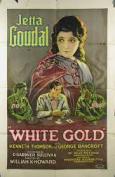 Walt Disney’s with organ accompaniment from Donald MacKenzie.
Walt Disney’s with organ accompaniment from Donald MacKenzie.
Screening on 6 December, the final film of this year’s Kennington Bioscope season, is a real rarity, The Jew Of Mestri, a German adaption of The Merchant of Venice, along with another little known American film, White Gold, based on the 1925 Broadway play of the same name by J. Palmer Parsons, produced by Cecil B. DeMille  and staring Jetta Goudal, Kenneth Thomson, George Bancroft and George Nichols.
and staring Jetta Goudal, Kenneth Thomson, George Bancroft and George Nichols.
Later in the month there are two opportunities (17th and 28th at the BFI) to see another classic silent melodrama, The Woman Of Paris, Charles Chaplin’s debut at United Artists as a director/producer. Unlike so much of his previous output this was a serious drama, a  tragic love story set in French high society and starring Chaplin’s long term collaborator Edna Purviance.
tragic love story set in French high society and starring Chaplin’s long term collaborator Edna Purviance.
Finally, if your thoughts turn to lighter faire, Neil Brand will be accompanying three silent comedy classics in a Silent Comedy Triple Treat at Bristol’s Watershed Cinema comprising Charlie Chaplin’s The Rink, Buster Keaton’s The High Sign and Harold Lloyd’s Never Weaken.
Full details of all of these screenings are available here. Happy viewing folks and don’t forget to look out for our January preview, coming soon.
6 November
 PickFair Coming To Wareham! What’s this you say, a new silent film festival? Do tell. Well, those great guys at South West Silents have got together with The Rex Cinema in Wareham to bring us the first Wareham Silent Film Weekender, which hopefully will become a regular feature on the silent film festival programme. The Weekender runs from Friday 1st to Sunday 3rd December.
PickFair Coming To Wareham! What’s this you say, a new silent film festival? Do tell. Well, those great guys at South West Silents have got together with The Rex Cinema in Wareham to bring us the first Wareham Silent Film Weekender, which hopefully will become a regular feature on the silent film festival programme. The Weekender runs from Friday 1st to Sunday 3rd December.
 For this first weekender they have chosen as their festival theme the veritable king and queen of 1920s Hollywood, Mary Pickford and Douglas Fairbanks. The programme kicks off on the Friday evening
For this first weekender they have chosen as their festival theme the veritable king and queen of 1920s Hollywood, Mary Pickford and Douglas Fairbanks. The programme kicks off on the Friday evening  with Fairbanks at his swashbuckling best in The Mark of Zorro (1920) and concludes on the Sunday with him reprising this role in Don Q, Son of Zorro (1925). In between, Mary Pickford appears in several of her biggest hits including Stella Maris (1918), Little Annie Roonay (1925) and Sparrows (1926) as well as earlier or much less well known films such as Fanchon The Cricket (1915) and Johanna (1918) plus several of her Biograph shorts. Meanwhile, Doug ditches his Zorro mask to appear in the brilliant comedy western (sort of!) Wild And Woolly (1917), the recently rediscovered
with Fairbanks at his swashbuckling best in The Mark of Zorro (1920) and concludes on the Sunday with him reprising this role in Don Q, Son of Zorro (1925). In between, Mary Pickford appears in several of her biggest hits including Stella Maris (1918), Little Annie Roonay (1925) and Sparrows (1926) as well as earlier or much less well known films such as Fanchon The Cricket (1915) and Johanna (1918) plus several of her Biograph shorts. Meanwhile, Doug ditches his Zorro mask to appear in the brilliant comedy western (sort of!) Wild And Woolly (1917), the recently rediscovered  When The Clouds Roll By (1917) and several of his classic shorts including The Half Breed (1916) and The Good-Bad Man (1916).
When The Clouds Roll By (1917) and several of his classic shorts including The Half Breed (1916) and The Good-Bad Man (1916).
Thanks to The Mary Pickford Foundation, most of the Pickford films being screened over the weekend will be the UK premiers of recently restored versions, some with newly composed recorded scores. For the rest of the screenings, there will be live improvised musical accompaniment from top notch musicians Meg Morley and Dominic Irving.
 And there couldn’t be a better setting for this weekender than the Rex Cinema in Wareham. Built in 1889 as an Oddfellows Hall, it provided various entertainments such as travelling theatre shows, banquets and concerts. It was converted into a full blown cinema in 1920, The Empire,
And there couldn’t be a better setting for this weekender than the Rex Cinema in Wareham. Built in 1889 as an Oddfellows Hall, it provided various entertainments such as travelling theatre shows, banquets and concerts. It was converted into a full blown cinema in 1920, The Empire,  whose interiors brought a touch of Art Deco to Wareham. Renamed The Rex in 1963, the cinema is now run by the Purbeck Film Charitable Trust and boasts state of the art projection and sound equipment (while still retaining its 35mm projectors) as well as some very plush seating, providing a comfortable and cosy atmosphere, just right for a weekend’s silent film entertainment.
whose interiors brought a touch of Art Deco to Wareham. Renamed The Rex in 1963, the cinema is now run by the Purbeck Film Charitable Trust and boasts state of the art projection and sound equipment (while still retaining its 35mm projectors) as well as some very plush seating, providing a comfortable and cosy atmosphere, just right for a weekend’s silent film entertainment.
All in all, this looks like being a very enjoyable weekend and hopefully one that will be repeated in future years (hopefully with a little more notice!). All screenings can be booked separately although at just £70 a ‘weekender pass’ covering all 11 screenings represents exceptional value for money. You can’t afford to miss it.
Full details are available from The Rex or from South West Silents. And full details of all of the screenings will shortly be in our live event listings page here.
29 October
Silent Film Live Events Preview – November Its another busy month, silent film wise, with 44 screenings across the country.
 The big event of the month is, of course, the Kennington Bioscope’s Silent Laughter Weekend (4/5th November), two days just packed with rare comedy gems (as well as a few timeless classics). Fresh from a well received screening at Pordenone there is Poker Faces starring comedy
The big event of the month is, of course, the Kennington Bioscope’s Silent Laughter Weekend (4/5th November), two days just packed with rare comedy gems (as well as a few timeless classics). Fresh from a well received screening at Pordenone there is Poker Faces starring comedy  stalwarts Edward Everett Horton and Laura La Plante. There is a rare outing for Max Linder comedy The Three Must-Get-Theres, his pastiche of The Three Musketeers, an even rarer outing for one of Mabel Normand’s few surviving features, The Floor Below, as well as the premier of a recently restored Monty
stalwarts Edward Everett Horton and Laura La Plante. There is a rare outing for Max Linder comedy The Three Must-Get-Theres, his pastiche of The Three Musketeers, an even rarer outing for one of Mabel Normand’s few surviving features, The Floor Below, as well as the premier of a recently restored Monty  Banks comedy, Play Safe.
Banks comedy, Play Safe.
There’s a fine selection of short comedies featuring some of the biggest silent stars from Europe, the UK premier of the complete The Way of All Pants starring Charley Chase amongst some rare Hal Roach shorts, a Laurel and Hardy compendium, some stars of the cinematic animal world and a tribute to the much missed film collector, historian and author Dave Wyatt.
All the films come with introductions by knowledgeable experts and live musical accompaniment from some of the best silent film accompanists around. And they’re all being 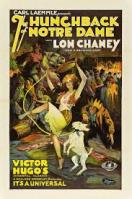 screened in the awesome Cinema Museum down in Lambeth.
screened in the awesome Cinema Museum down in Lambeth.
In contrast to this silent comedy weekend, much of the rest of November’s screenings focus of the scary, the supernatural and the downright creepy. The Hunchback of Notre Dame gets no less than seven outings over the month (2nd, 3rd, 4th, 6th, 10th and 25th) , there are three screenings of both Nosferatu (1st, 3rd and 12th) and The Cabinet of Dr Caligari (3rd, 6th  and 11th) and a single appearance of Dr Jekyll and Mr Hyde (11th).
and 11th) and a single appearance of Dr Jekyll and Mr Hyde (11th).
But if you’re not up for outright horror there are plenty of other thrills with screenings of both Alfred Hitchcock’s Blackmail (5th) and The Lodger (19th and 23rd), Anthony Asquith’s sublime thriller Underground (15th) as well as two outings for the rarely screened  The Flying Scotsman (10th and 16th), notable for star Pauline Johnson doing all her own stunts including hanging off the side of the moving train while wearing high heels!
The Flying Scotsman (10th and 16th), notable for star Pauline Johnson doing all her own stunts including hanging off the side of the moving train while wearing high heels!
But if you still have an appetite for more comedy, then it doesn’t come any funnier (or more thrilling) than Harold Lloyd in Safety Last (2nd). Then there is a comedy compendium down in Brixton (2nd) featuring Chaplin, Keaton and some French surrealism all accompanied by a 15 piece chamber  orchestra while Mr Neil Brand continues touring with his new show looking in to the lives and films of eternal comedy favourites Laurel and Hardy (5th, 9th and 15th).
orchestra while Mr Neil Brand continues touring with his new show looking in to the lives and films of eternal comedy favourites Laurel and Hardy (5th, 9th and 15th).
Up in Edinburgh, there is a look at life within the 1920s fishing community with John Griersen’s documentary Drifters (4th), Manchester gets to see World War 1 epic The Big Parade (11th) while Bristol and Southampton get to see Douglas Fairbanks buckling his  swash in The Mark of Zorro (13th and 14th). Then at the fantastic Wilton’s Music Hall in London, the Lucky Dog Picturehouse is screening Battleship Potemkin (16th) along with a compendium of Dickens on Silent Film (14th).
swash in The Mark of Zorro (13th and 14th). Then at the fantastic Wilton’s Music Hall in London, the Lucky Dog Picturehouse is screening Battleship Potemkin (16th) along with a compendium of Dickens on Silent Film (14th).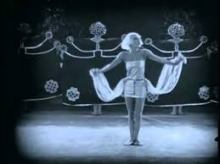
Lastly, if your taste is more for the outer limits of the avant-garde then Salome (19th) is the film for you, starring the incomparable Alla Nazimova, with a superb live accompaniment from Meg Morley.
Full details of all of these screenings are available here. Happy viewing folks and don’t forget to look out for our December preview, coming soon.
28 September
Silent Film Live Events Preview – October Well, October certainly is looking like a bumper month silent film wise, with no less than 47 screenings over the next 31 days.
 And pride of place this month must go to the Northern Silents Film Festival with 20 events scheduled all across the north of England.
And pride of place this month must go to the Northern Silents Film Festival with 20 events scheduled all across the north of England.  Particular highlights include the hugely enjoyable (and best version of) Chicago and a rare Walter Forde comedy Would You Believe It in Morecambe (1st October); the legendary Louise Brooks in Diary Of A Lost Girl (13th Oct in Newcastle upon Tyne); Russian Sci-fi epic Aelita – Queen of Mars (21st Oct in Sheffield); Keaton classic The General (23rd Oct in York);
Particular highlights include the hugely enjoyable (and best version of) Chicago and a rare Walter Forde comedy Would You Believe It in Morecambe (1st October); the legendary Louise Brooks in Diary Of A Lost Girl (13th Oct in Newcastle upon Tyne); Russian Sci-fi epic Aelita – Queen of Mars (21st Oct in Sheffield); Keaton classic The General (23rd Oct in York);  expressionist classic The Cabinet of Dr Caligari (22nd Oct in Leigh and 25th in Leeds); the uber smooth Lubitsch comedy So This Is Paris (24th Oct in Leyburn) another Chicago screening (28th Oct in Hull) and the festival wraps up with a timely Halloween screening of the one and only Nosferatu (31st in Sheffield).
expressionist classic The Cabinet of Dr Caligari (22nd Oct in Leigh and 25th in Leeds); the uber smooth Lubitsch comedy So This Is Paris (24th Oct in Leyburn) another Chicago screening (28th Oct in Hull) and the festival wraps up with a timely Halloween screening of the one and only Nosferatu (31st in Sheffield).
In addition, the festival includes numerous classic comedy shorts from Laurel and Hardy, Buster Keaton and Charlie Chaplin throughout the month. All of the films are being screened with live musical accompaniment and on 17th Oct there is an online  opportunity to hear from the festival musicians themselves who will discuss just how they go about creating new music for silent film.
opportunity to hear from the festival musicians themselves who will discuss just how they go about creating new music for silent film.
But if horror is more the genre for you then you will also be well served this month. The Cabinet Of Dr Caligari gets further multiple outings in October, at the Hippodrome in Bo’ness (7th Oct), the Prince Charles in London (16th and 28th) St Mary Redcliffe in Bristol (25th) and at Turnberries in Thornbury (29th). Nosferatu will also be putting in additional appearances at The Ultimate Picture Palace in Oxford (4th) and the Prince Charles in London (23rd). If witchcraft is more to your liking then docu-drama Haxan screens at the Regent Street Cinema in London (19th). Broadstairs’ delightful Palace Cinema is screening the creepy Hands Of Orlac (15th), The Phantom of the Opera pops up at Regent Street Cinema (29th) while Dr Jekyll and Mr Hyde screens at the Musical Museum in
in Oxford (4th) and the Prince Charles in London (23rd). If witchcraft is more to your liking then docu-drama Haxan screens at the Regent Street Cinema in London (19th). Broadstairs’ delightful Palace Cinema is screening the creepy Hands Of Orlac (15th), The Phantom of the Opera pops up at Regent Street Cinema (29th) while Dr Jekyll and Mr Hyde screens at the Musical Museum in  Brentford the same evening but if your taste is more for ‘the heart blood of virgins’, then it must be The Magician for you, screening at BFI Southbank (29th).
Brentford the same evening but if your taste is more for ‘the heart blood of virgins’, then it must be The Magician for you, screening at BFI Southbank (29th).
And talking of the BFI, they will be showing late Hitchcock silent Blackmail (25th Oct) but their highlight of the month must be a London Film Festival screening of the restored technicolor delight that is The Black Pirate starring everyone’s favourite swashbuckler, Douglas Fairbanks (15th Oct). Sadly, there is an unfortunate screening clash that same day with the Garden Cinema in London choosing to screen three Chaplin films as a  tribute to legendary silent film composer Carl Davis.
tribute to legendary silent film composer Carl Davis.
The Kennington Bioscope’s autumn programme picks up pace in October with two rarely screened European gems, Manolescu starring Russian emigre heartthrob Ivan Mouskojine (4th) and the German Merchant of Venice adaption, The Jew Of Mestri (25th). Among other classics screening during the month, the impossibly expressionistic and inter-title free The Last Laugh screens at The  Waterfront in Bristol (1st) as does the Weimar era classic Asphalt (22nd), Alla Nazimova pulls out all the theatrical stops as Salome at the Hippodrome up in Bo’ness and there are some Lotte Reiniger fairy tales at the Barbican in London (7th).
Waterfront in Bristol (1st) as does the Weimar era classic Asphalt (22nd), Alla Nazimova pulls out all the theatrical stops as Salome at the Hippodrome up in Bo’ness and there are some Lotte Reiniger fairy tales at the Barbican in London (7th).
And taking to the road in October is composer, writer, broadcaster and musician Mr Neil Brand with his latest show, Neil Brand Presents Laurel And Hardy, detailing the lives of this immortal comedy duo  and including a couple of their best silent shorts.
and including a couple of their best silent shorts.
Finally, probably the most obscure film you could see during the month screens on the 1st Oct at the Cinema Lumier in London. Presented as part of the London Georgian Film Festival, Bela is a virtually unknown melodrama made in the Soviet republic of Georgia in 1927. Little is known about the film but with live musical accompaniment from Mr John Sweeney its got to be worth a watch (and a listen). Give it a go!
Full details of all of these screenings are available here. Happy viewing folks and don’t forget to look out for our November preview, coming soon.
14 September
 September Preview – Last Minute Additions Having made a few recent additions to our listings for the second half of September, a couple of them are worth a special mention as they really are not to be missed. First up, on 23 September at the Hippodrome Cinema in Bo’ness, , there is a screening of
September Preview – Last Minute Additions Having made a few recent additions to our listings for the second half of September, a couple of them are worth a special mention as they really are not to be missed. First up, on 23 September at the Hippodrome Cinema in Bo’ness, , there is a screening of 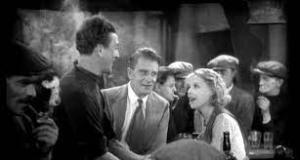 Alfred Hitchcock’s last silent film, The Manxman, a tempestuous melodrama about two inseparable friends who both fall in love with the same girl. Set on the Isle of Man (although actually filmed very spectacularly on the Cornish coast), Hitchcock was reportedly unhappy with the final product. Nevertheless, the film was a big commercial success at the time and is now regarded as one of his best silents and it shines even brighter thanks to the complex, sensual performance of Anny Ondra as the girl. Live
Alfred Hitchcock’s last silent film, The Manxman, a tempestuous melodrama about two inseparable friends who both fall in love with the same girl. Set on the Isle of Man (although actually filmed very spectacularly on the Cornish coast), Hitchcock was reportedly unhappy with the final product. Nevertheless, the film was a big commercial success at the time and is now regarded as one of his best silents and it shines even brighter thanks to the complex, sensual performance of Anny Ondra as the girl. Live  musical accompaniment for the film will also be of the highest quality, coming as it does from the multi-talented
musical accompaniment for the film will also be of the highest quality, coming as it does from the multi-talented Stephen Horne. Find out more here
Stephen Horne. Find out more here
Then, on September 28th at Cine Lumiere in London, there is a much rarer beast, with just the second ever UK screening of The Self Seeker (aka Shkurnik, aka A Profiteer). Released in 1929, this is a little known Soviet/Ukrainian avant-garde film, a comic tale of survival in the kaleidoscopic change of circumstances during the  civil war in Ukraine and a biting satire on the Soviet propaganda. For that last reason the film was banned barely a week after its first release by the Moscow authorities and spent the next 60 years buried in the archives of the State Film Fund in Moscow until it was rediscovered in the 1990s and restored by the Dovzhenko National Film Studios. I had the pleasure of being amongst an audience of barely 30 people when it got its
civil war in Ukraine and a biting satire on the Soviet propaganda. For that last reason the film was banned barely a week after its first release by the Moscow authorities and spent the next 60 years buried in the archives of the State Film Fund in Moscow until it was rediscovered in the 1990s and restored by the Dovzhenko National Film Studios. I had the pleasure of being amongst an audience of barely 30 people when it got its  first British screening 2017 and thought it was an absolute gem ( for my with spoilers review see here ) and hugely deserving of a wider audience. Its beautifully shot, very funny and as bitingly relevent now as it was when first released (not to mention the funniest camel co-star ever put on film!) So it is a real treat to see that The Self Seeker is being shown for a second time in Britain, this time at the as part of the London Georgian Film Festival. This is a film crying out for a wider audience and, with John Sweeney providing live piano accompaniment, it really is a must see. Don’t miss this opportunity. Find out more here.
first British screening 2017 and thought it was an absolute gem ( for my with spoilers review see here ) and hugely deserving of a wider audience. Its beautifully shot, very funny and as bitingly relevent now as it was when first released (not to mention the funniest camel co-star ever put on film!) So it is a real treat to see that The Self Seeker is being shown for a second time in Britain, this time at the as part of the London Georgian Film Festival. This is a film crying out for a wider audience and, with John Sweeney providing live piano accompaniment, it really is a must see. Don’t miss this opportunity. Find out more here.
Details of these and all other silent films being screened in September are available here
5 September 2023
 Its Goodbye to Yorkshire Silent Film Festival And Hello To Northern Silents Well, this seems to have slipped under my radar. The terrific Yorkshire Silent Film Festival appears to have morphed into Northern Silents. Founded in 2016 by musician and silent film enthusiast Jonny Best, The Yorkshire Silent
Its Goodbye to Yorkshire Silent Film Festival And Hello To Northern Silents Well, this seems to have slipped under my radar. The terrific Yorkshire Silent Film Festival appears to have morphed into Northern Silents. Founded in 2016 by musician and silent film enthusiast Jonny Best, The Yorkshire Silent  Film Festival hit the ground running that same year with a one month festival across the county screening over thirty silent films, all with live musical accompaniment. Since then, the festival has gone from strength to strength, with its fifth iteration in 2022 as well as a flourishing programme of silent screenings throughout the year.
Film Festival hit the ground running that same year with a one month festival across the county screening over thirty silent films, all with live musical accompaniment. Since then, the festival has gone from strength to strength, with its fifth iteration in 2022 as well as a flourishing programme of silent screenings throughout the year.
But as the Yorkshire Silent Film Festival has grown in scope it has also spread beyond its Yorkshire borders, with increasingly frequent screenings in adjacent counties Hence the change in name to reflect its broader Northern base. But its more than just a new name. The ethos of Northern Silents focuses on a reimagining – sometimes radically – of the relationship between film and live music.They can call upon the services of a growing and increasingly diverse range of musicians to provide musical accompaniment, including both  established names as well as those new to silent film accompaniment. They are also developing musical workshops to attract and encourage performers new to silent film while allowing others to hone their accompaniment skills. Northern Silents also presents and commissions innovative new composed music, including the first ever brass band score for silent film, Echoes of the North: Four Chapters in Time (2022/3)by celebrated composer Neil Brand.
established names as well as those new to silent film accompaniment. They are also developing musical workshops to attract and encourage performers new to silent film while allowing others to hone their accompaniment skills. Northern Silents also presents and commissions innovative new composed music, including the first ever brass band score for silent film, Echoes of the North: Four Chapters in Time (2022/3)by celebrated composer Neil Brand.
 But Northern Silents’ current focus is firmly fixed on its October film festival, taking place across the North of England, from Newcastle
But Northern Silents’ current focus is firmly fixed on its October film festival, taking place across the North of England, from Newcastle  Upon Tyne to Manchester and from Morecambe to Hull, highlights of which include the first (and best) version of Chicago, Louise Brooks in Diary Of A Lost Girl and Soviet sci-fi masterpiece Aelita: Queen Of Mars. Almost 20
Upon Tyne to Manchester and from Morecambe to Hull, highlights of which include the first (and best) version of Chicago, Louise Brooks in Diary Of A Lost Girl and Soviet sci-fi masterpiece Aelita: Queen Of Mars. Almost 20  films, to be screened at a variety of venues across the region, all with top notch live musical accompaniment. What isn’t there to like.
films, to be screened at a variety of venues across the region, all with top notch live musical accompaniment. What isn’t there to like.
So, to be clear, the Yorkshire Silent Film Festival might have firmly established silent film in Northern England, but its equally clear that Northern Silents is going to take it to another level. All power to them.
Check out the Northern Silents website Here or alternatively see Silent Film Calendar‘s regular listings Here for details of all of their forthcoming screenings.
1 September 2023
Silent Film Live Events Preview – September Well, the summer (such that there has been!) may be over, but the good news for silent film fans is that the end of summer brings with it the usual up-tick in silent screenings, as venues kick off their autumn programmes and this is already reflected in our September listings with almost 20 events across the country.
 Best news for September is the start of a season at BFI Southbank featuring the work of famed Japanese director Yasujiro Ozu. This extensive season covers Ozu’s entire oeuvre, from the 1920s to the
Best news for September is the start of a season at BFI Southbank featuring the work of famed Japanese director Yasujiro Ozu. This extensive season covers Ozu’s entire oeuvre, from the 1920s to the  1960s including many of his (sadly few) surviving silent films. His most well known (and perhaps best?) silent, I Was Born But… screens on 4th and 15th September. Other silents in the season include the delicately beautiful Story of Floating Weeds (9th and 23rd), the student comedy I Flunked But… together with surviving fragments of I Graduated But… (2nd and 13th) and his shomin-geki, or
1960s including many of his (sadly few) surviving silent films. His most well known (and perhaps best?) silent, I Was Born But… screens on 4th and 15th September. Other silents in the season include the delicately beautiful Story of Floating Weeds (9th and 23rd), the student comedy I Flunked But… together with surviving fragments of I Graduated But… (2nd and 13th) and his shomin-geki, or  “common people drama,” Tokyo Chorus (2nd and 17th). All of these screenings shuold come with live musical accompaniment.
“common people drama,” Tokyo Chorus (2nd and 17th). All of these screenings shuold come with live musical accompaniment.
And while we’re talking of Ozu at the BFI, on 10th September they are also screening King Vidor’s dark cinematic masterpiece The Crowd, a film which Ozu himself cited as an inspiration for his own Tokyo Chorus. Live musical accompaniment is by the brilliant Stephen Horne.
Another season kicking off in September is a monthly event presented by South West Silents and Pound Arts in Corsham, Wiltshire. Their first screening is the Cecil B DeMille epic (and  somewhat luridly melodramatic) The Ten Commandments (5th September). Made in 1923, it was Paramount’s highest grossing film until the 1956 remake starring Charlton Heston and Yul Brynner and directed once again by DeMille himself. Live
somewhat luridly melodramatic) The Ten Commandments (5th September). Made in 1923, it was Paramount’s highest grossing film until the 1956 remake starring Charlton Heston and Yul Brynner and directed once again by DeMille himself. Live  piano accompaniment for this and subsequent screenings comes from Meg Morley.
piano accompaniment for this and subsequent screenings comes from Meg Morley.
Also resuming after their summer break is the fabulous Kennington Bioscope, celebrating their 10th anniversary (doesn’t time fly when you’re enjoying yourself) and kicking off their autumn season with ‘It’ girl Clara Bow, starring in the film which gave her that very same title. It screens on September 13th, accompanied by a collection of Pathe 28mm format films projected by film historian Christopher Bird using an original restored 28mm projector and all with the usual top  notch live musical accompaniment down at Lambeth’s glorious Cinema Museum.
notch live musical accompaniment down at Lambeth’s glorious Cinema Museum.
Meanwhile, up at Manchester’s Stoller Hall, Northern Silents (previously known as The Yorkshire Silent Film Festival) continue their great work with a screening of G W Pabst’s classic Pandora’s Box (16th) starring the wonderful Louise Brooks and with live musical accompaniment by Frame Ensemble. In a lighter vein, Northern  Silents are also screening a Laurel & Hardy triple bill at Farsley in Yorkshire on the 10th.
Silents are also screening a Laurel & Hardy triple bill at Farsley in Yorkshire on the 10th.
And while we’re looking North, there is a screening of director F W Murnau’s American film debut, the darkly melodramatic Sunrise: A Song Of Two Humans (9th) at St Cuthbert’s Church in Norham, Berwick with live musical accompaniment from the Jane Gardner Quartet.
 Amongst other classics due an outing during September, Chaplin’s late silent Modern Times screens at London’s Garden Cinema on the 17th, Buster Keaton’s perhaps less well known but equally funny comedy The Three Ages screens on the same day at the Palace
Amongst other classics due an outing during September, Chaplin’s late silent Modern Times screens at London’s Garden Cinema on the 17th, Buster Keaton’s perhaps less well known but equally funny comedy The Three Ages screens on the same day at the Palace  Cinema in Broadstairs, with live piano accompaniment from Lillian Henley, while seminal horror classic Nosferatu screens on the 29th at London’s Prince Charles Cinema with live accompaniment from Hugo Max. There should also (TBC)
Cinema in Broadstairs, with live piano accompaniment from Lillian Henley, while seminal horror classic Nosferatu screens on the 29th at London’s Prince Charles Cinema with live accompaniment from Hugo Max. There should also (TBC) 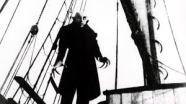 be a screening of British thriller A Cottage on Dartmoor (14th) appropriately enough at Newton Abbot on the very edge of Dartmoor itself, with live musical accompaniment from local musicians, Wurlitza.
be a screening of British thriller A Cottage on Dartmoor (14th) appropriately enough at Newton Abbot on the very edge of Dartmoor itself, with live musical accompaniment from local musicians, Wurlitza.
 The month ends with a meeting on the 30th at London’s Cinema Museum of the Live Ghost Tent, the quarterly meeting of The Laurel and Hardy Society which will include a showing of their 1925 silent, Twins.
The month ends with a meeting on the 30th at London’s Cinema Museum of the Live Ghost Tent, the quarterly meeting of The Laurel and Hardy Society which will include a showing of their 1925 silent, Twins.
Full details of all of these screenings are available Here. Happy viewing and don’t forget to look out for our October preview, coming soon.
31 July 2023
Silent Film Live Events Preview – August Although the summer months usually see a downturn in the number of silent film live events, there’s still lots of worthwhile events taking place in August.
 First up, early August sees the second half of The Lucky Dog Picture House’s silent comedians series. This opens with Harold Lloyd’s Safety Last (1 Aug) before focusing on some classic Buster Keaton with The Navigator (2 Aug) and Seven Chances (3 Aug). There is also a real treat with the rarely screened but equally funny Battling Butler (4 Aug), reputedly one of Keaton’s personal favourites, the financial success of which apparently convinced producer Joseph M. Schenck to fund Keaton’s greatest epic, The General. All of these screenings come with live musical accompaniment by The Lucky Dog Picture House and are being screened at the fantastic Wilton’s Music Hall in London’s East End.
First up, early August sees the second half of The Lucky Dog Picture House’s silent comedians series. This opens with Harold Lloyd’s Safety Last (1 Aug) before focusing on some classic Buster Keaton with The Navigator (2 Aug) and Seven Chances (3 Aug). There is also a real treat with the rarely screened but equally funny Battling Butler (4 Aug), reputedly one of Keaton’s personal favourites, the financial success of which apparently convinced producer Joseph M. Schenck to fund Keaton’s greatest epic, The General. All of these screenings come with live musical accompaniment by The Lucky Dog Picture House and are being screened at the fantastic Wilton’s Music Hall in London’s East End.
If you need another helping of Buster Keaton then get on down to Chichester and their International Film Festival which includes another two showings of Safety Last (3 and 26 Aug) as well as Steamboat Bill Jr (17 Aug). The festival  also includes Neil Brand’s all-new live show on the life and films of Laurel and Hardy (22 Aug) as well as Lon Chaney in Phantom of the Opera (25 Aug). But probably the silent film highlight of the festival is an all too rare screening of Rene Clair’s sublime comedy An Italian Straw Hat (15 Aug) with live piano
also includes Neil Brand’s all-new live show on the life and films of Laurel and Hardy (22 Aug) as well as Lon Chaney in Phantom of the Opera (25 Aug). But probably the silent film highlight of the festival is an all too rare screening of Rene Clair’s sublime comedy An Italian Straw Hat (15 Aug) with live piano  accompaniment from John Sweeney.
accompaniment from John Sweeney.
Just down the road from Chichester, in Arundel, there is an incredibly rare screening of British melodrama Tansy (17 Aug) one of the few surviving feature length films from director Cecil Hepworth, much of which was shot in and around the nearby village of Burpha on the Sussex Downs.
If your silent film forte tends more towards animal heroes, then get yourself up to Hebden Bridge where the Yorkshire Silent Film Festival is screening a selection of animal films  featuring dogs and cats, penguins and seals, bear cubs and more (not to mention some human stars including Laurel & Hardy, Mabel Normand, and Buster Keaton), all aimed primarily at the younger audience but with adults equally welcome. Live piano accompaniment comes
featuring dogs and cats, penguins and seals, bear cubs and more (not to mention some human stars including Laurel & Hardy, Mabel Normand, and Buster Keaton), all aimed primarily at the younger audience but with adults equally welcome. Live piano accompaniment comes  from Adam Fairhall and Jonny Best.
from Adam Fairhall and Jonny Best.
But if you taste turns more to animated animals then BFI Southbank has just the thing for you with an afternoon  of early Disney silent shorts (6 Aug), including a popular Alice comedy featuring an animated cat named Julius and Disney’s first big animated star, Oswald the Lucky Rabbit, a precursor to Mickey Mouse. All with live piano accompaniment from Costas Fotopoulos.
of early Disney silent shorts (6 Aug), including a popular Alice comedy featuring an animated cat named Julius and Disney’s first big animated star, Oswald the Lucky Rabbit, a precursor to Mickey Mouse. All with live piano accompaniment from Costas Fotopoulos.
And if you still haven’t had your fill of Safety Last, there is one last chance to catch it (20 Aug) at the Edinburgh Film Festival with live piano accompaniment by Mike Nolan.
Full details of all of these screenings are available Here. Happy viewing and don’t forget to look out for our September preview, coming soon.
3 November 2022
 Stuck for something to do on a miserable November weekend? The clocks have gone back, the nights are drawing in, the weather is getting colder and you can’t afford to turn on the heating? Then get yourself down to Lambeth’s fantastic Cinema Museum this weekend (5th – 6th November) where those wonderful folk from Kennington Bioscope will be putting on their 6th Silent Film Weekend.
Stuck for something to do on a miserable November weekend? The clocks have gone back, the nights are drawing in, the weather is getting colder and you can’t afford to turn on the heating? Then get yourself down to Lambeth’s fantastic Cinema Museum this weekend (5th – 6th November) where those wonderful folk from Kennington Bioscope will be putting on their 6th Silent Film Weekend.
The aspiration of the KenBio, has always been to shed some much needed light on the rare, rarely screened and less oft visited corners of the silent film world and  that will certainly be the case with this weekend’s festival. Feature length rarities will include The Lure of Crooning Water (1920) a British made rom-com starring (then) married couple Guy Newall and Ivy Duke. From Germany comes Die Heimkehr des Odysseus (aka The Homecoming Of Odysseus, aka The Death Cheat) (1922) about which I can find out virtually nothing other than it starred former circus artist and muscle man Luciano Albertini but
that will certainly be the case with this weekend’s festival. Feature length rarities will include The Lure of Crooning Water (1920) a British made rom-com starring (then) married couple Guy Newall and Ivy Duke. From Germany comes Die Heimkehr des Odysseus (aka The Homecoming Of Odysseus, aka The Death Cheat) (1922) about which I can find out virtually nothing other than it starred former circus artist and muscle man Luciano Albertini but  the watchword seems to be don’t worry about the plot just sit back and soak up the breathless action. Then there is Bright Eyes (1929) (aka Palace de Luxe), an Austro-British co-production starring Britain’s own ‘Queen of Happiness’ Miss Betty Balfour. The film is also known as Champagner but is not to be confused with Betty’s earlier, Hitchcock directed, Champagne (1928). There is also a British film adaption based loosely on the song Widdicombe Fair, called, not surprisingly,
the watchword seems to be don’t worry about the plot just sit back and soak up the breathless action. Then there is Bright Eyes (1929) (aka Palace de Luxe), an Austro-British co-production starring Britain’s own ‘Queen of Happiness’ Miss Betty Balfour. The film is also known as Champagner but is not to be confused with Betty’s earlier, Hitchcock directed, Champagne (1928). There is also a British film adaption based loosely on the song Widdicombe Fair, called, not surprisingly,  Widdicombe Fair (1928), of particular interest given that cinematography was by Claude Friese-Green.
Widdicombe Fair (1928), of particular interest given that cinematography was by Claude Friese-Green.
But if you prefer your silent features to be a bit more main-stream, then not to worry. There is von Stroheim’s classic The Wedding March (1928) in which he also stars along with King Kong’s favourite squeeze, Fay Wray. From Germany comes Murnau’s surprisingly rarely screened Faust (1926), his last German film prior to his departure for  Hollywood. Going a little further afield there is also a welcome screening for Yasujiro Ozu’s classic Japanese gangster pic, Dragnet Girl (1933).
Hollywood. Going a little further afield there is also a welcome screening for Yasujiro Ozu’s classic Japanese gangster pic, Dragnet Girl (1933).
But as always with a KenBio festival, there is much more than just feature length screenings. There is a collection of BFI 35mm Silent shorts presented recently at the Bologna Cinema Ritrovato festival, a selection of shorts from the recently released Cinema’s First Nasty Women collection as well as a selection of Mitchell & Kenyon’s Fiction Shorts from the Cinema Museum’s own  collection. And do also watch out for the session on the Institute of Amateur Cinematographers (IAC) award-winning films sent on a ‘World Tour’. They are all interesting films but the 17 year old girl’s filmed travelogue of her solo trip to Egypt, To Egypt And Back With Imperial Airways (Ruth Stuart, UK, 1932), stands out while a stunning Japanese short Sister (Kichi Takeuchi, Jap, 1933) is almost more Ozu than Ozu and the Spanish entry Memmortigo (Delmir de Caralt, Sp,
collection. And do also watch out for the session on the Institute of Amateur Cinematographers (IAC) award-winning films sent on a ‘World Tour’. They are all interesting films but the 17 year old girl’s filmed travelogue of her solo trip to Egypt, To Egypt And Back With Imperial Airways (Ruth Stuart, UK, 1932), stands out while a stunning Japanese short Sister (Kichi Takeuchi, Jap, 1933) is almost more Ozu than Ozu and the Spanish entry Memmortigo (Delmir de Caralt, Sp,  1933) offers a slice of surrealism in the style of Buñuel and Dali,
1933) offers a slice of surrealism in the style of Buñuel and Dali,
And last but by no means least, there is a real live premier with the first screening of a newly restored print of The Gold Diggers (1923). Long thought lost but rediscovered in 2021, the film offers an invaluable glimpse of the influences behind some of Busby Berkeley’s most successful musicals of the 1930s. Not to be missed.
And being the KenBio, all of these screenings come with live musical accompaniment from some of the finest silent film musicians in the business (including John Sweeney, Colin Sell,  Lillian Henley, Cyrus Garbysch and Costas Fotopoulos) and all will have sparkling and informative introductions from a band of knowledgeable experts.
Lillian Henley, Cyrus Garbysch and Costas Fotopoulos) and all will have sparkling and informative introductions from a band of knowledgeable experts.
Check out more details Here, . Then get down to the Kennington Bioscope website Here and book yourselves some tickets!! What are you waiting for!!!
15 May 2022
 Electric Cinema, Harwich Re-Opens With A 1911 Night At The Movies One of Britain’s oldest surviving cinemas, the Electric Palace in Harwich, has recently re-opened, following an extensive refurbishment intended to restore the building to its original splendor. And what better way could there be to celebrate this re-opening than with an evening of silent films and live music,
Electric Cinema, Harwich Re-Opens With A 1911 Night At The Movies One of Britain’s oldest surviving cinemas, the Electric Palace in Harwich, has recently re-opened, following an extensive refurbishment intended to restore the building to its original splendor. And what better way could there be to celebrate this re-opening than with an evening of silent films and live music,  recreating a typical night at the movies, 1911-style, just as it was when the Electric Palace was first opened.
recreating a typical night at the movies, 1911-style, just as it was when the Electric Palace was first opened.
On Saturday 21 May, the Electric Palace will be staging A 1911 Night At The Movies, featuring a programme of early comedies, trick films, dramas, news footage of the Titanic, and even a film about the battle of Trafalgar that was shown at the Palace’s original opening night.
The programme is curated by award-winning film editor and director Christopher Bird (pictured, right) and who has had a lifelong interest in early cinema, and by David Cleveland, the founder of the
(pictured, right) and who has had a lifelong interest in early cinema, and by David Cleveland, the founder of the  East Anglian Film Archive. They will even be using a restored 1913 hand-cranked Gaumont projector, on the cinema’s original screen, exactly as it was 111 years ago. Providing live improvised musical accompaniment to the films will be internationally renowned silent film pianist John Sweeney (pictured, left).
East Anglian Film Archive. They will even be using a restored 1913 hand-cranked Gaumont projector, on the cinema’s original screen, exactly as it was 111 years ago. Providing live improvised musical accompaniment to the films will be internationally renowned silent film pianist John Sweeney (pictured, left).
Further details of the event together with booking details can be found here
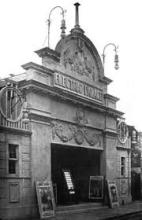 Built in 1911, just two years after the Cinematograph Act (1909), which sought to ensure that all screenings took place in buildings which were safe and suitable for public showings, the Electric Palace cinema in Harwich was constructed in just 18 weeks, at a cost of £1,500 by
Built in 1911, just two years after the Cinematograph Act (1909), which sought to ensure that all screenings took place in buildings which were safe and suitable for public showings, the Electric Palace cinema in Harwich was constructed in just 18 weeks, at a cost of £1,500 by  traveling showman Charles Thurston (picture, right; who also built the Empire Cinema in Biggleswade, Bedfordshire, and the Palace Cinema in Norwich). Previously Thurston had screened films in a travelling fairground tent but the 1909 act made this illegal on fire safety grounds. . The Electric opened on Wednesday, 29 November 1911, with a film about the Battle of Trafalgar and the death of Nelson. Admittance was 2d for a wooden bench seat, rising to 6d for a seat in the middle of the auditorium or a shilling (worth about £6.20 in today’s money) for a plush perch at the back of the cinema.
traveling showman Charles Thurston (picture, right; who also built the Empire Cinema in Biggleswade, Bedfordshire, and the Palace Cinema in Norwich). Previously Thurston had screened films in a travelling fairground tent but the 1909 act made this illegal on fire safety grounds. . The Electric opened on Wednesday, 29 November 1911, with a film about the Battle of Trafalgar and the death of Nelson. Admittance was 2d for a wooden bench seat, rising to 6d for a seat in the middle of the auditorium or a shilling (worth about £6.20 in today’s money) for a plush perch at the back of the cinema.
 Although the cinema survived two world wars, by the 1950s it had fallen on hard times and the disastrous east coast floods
Although the cinema survived two world wars, by the 1950s it had fallen on hard times and the disastrous east coast floods  of 1953 probably sealed its fate. The Electric Palace (by then known simply as ‘The Palace’) closed in 1956 and lay derelict and forgotten for the next 16 years. Then, in 1972, with demolition looming, it was ‘rediscovered’ during an architectural survey of the town by Gordon Miller of Kingston Polytechnic and his students. A protection order for the building was taken out and dialogue started with interested local people including the Harwich Society about
of 1953 probably sealed its fate. The Electric Palace (by then known simply as ‘The Palace’) closed in 1956 and lay derelict and forgotten for the next 16 years. Then, in 1972, with demolition looming, it was ‘rediscovered’ during an architectural survey of the town by Gordon Miller of Kingston Polytechnic and his students. A protection order for the building was taken out and dialogue started with interested local people including the Harwich Society about  restoring the building and returning the cinema to use. This was finally achieved in 1981 with a grand re-opening on 29 November, the 70th anniversary of the Electric Palace’s original opening. Now operated by the Harwich Electric Palace Trust, it has served as a community cinema
restoring the building and returning the cinema to use. This was finally achieved in 1981 with a grand re-opening on 29 November, the 70th anniversary of the Electric Palace’s original opening. Now operated by the Harwich Electric Palace Trust, it has served as a community cinema ever since. But in 2019 the, by now Grade II* listed, venue was placed on the Heritage at Risk Register. Significant structural defects were found and extensive new refurbishment was required. Funded to the tune of £1.5million with grants from English Heritage and from The National Lottery Heritage Fund, this work has now been completed and the Electric Palace reopened on 8 April 2022, with state of the art projection and audio, plush new decour and ready to serve for another 111 years. .
ever since. But in 2019 the, by now Grade II* listed, venue was placed on the Heritage at Risk Register. Significant structural defects were found and extensive new refurbishment was required. Funded to the tune of £1.5million with grants from English Heritage and from The National Lottery Heritage Fund, this work has now been completed and the Electric Palace reopened on 8 April 2022, with state of the art projection and audio, plush new decour and ready to serve for another 111 years. .
10 September
 HippFest Non-Fest Film Season Kicks Off Although their 2020 festival was a casualty of Covid while the 2021 event was limited to a truncated on-line version, the good people at the Hippodrome Silent Film Festival are obviously keen to get back to actual in-person, bums-on-seats, silent film events. To this end they have put together a short but interesting programme of screenings, all with live musical accompaniment, which kicks off this Saturday, 11 September
HippFest Non-Fest Film Season Kicks Off Although their 2020 festival was a casualty of Covid while the 2021 event was limited to a truncated on-line version, the good people at the Hippodrome Silent Film Festival are obviously keen to get back to actual in-person, bums-on-seats, silent film events. To this end they have put together a short but interesting programme of screenings, all with live musical accompaniment, which kicks off this Saturday, 11 September
 The programme opens with a Charlie Chaplin/Laurel & Hardy double bill. Chaplin stars in the Mutual classic Easy Street (1917), playing the somewhat reluctant police officer trying to impress
The programme opens with a Charlie Chaplin/Laurel & Hardy double bill. Chaplin stars in the Mutual classic Easy Street (1917), playing the somewhat reluctant police officer trying to impress  mission worker Edna Purviance but finding life tough as he battles man-mountain bully Eric Campbell. Meanwhile, Laurel and Hardy appear in late silent Wrong Again (1929) where they face the not inconsequential task of getting a horse on to a piano!. Providing live piano accompaniment to both films is renowned composer, musician and television presenter Neil Brand.
mission worker Edna Purviance but finding life tough as he battles man-mountain bully Eric Campbell. Meanwhile, Laurel and Hardy appear in late silent Wrong Again (1929) where they face the not inconsequential task of getting a horse on to a piano!. Providing live piano accompaniment to both films is renowned composer, musician and television presenter Neil Brand.
 In complete contrast, Saturday 25 September features two stunningly spectacular feature length documentaries. First up is Grass: A Nation’s Battle For Life (1925) Before they went on to make King Kong (1933) Merian C. Cooper and Ernest B. Schoedsack told the jaw-dropping, true story of a tribe of 50, 000 nomads in Iran known as the Bakhtiari and their epic annual 48 day trek across inhospitable terrain from Turkey to Iran, complete with 500,000 cattle and goats. A spectacular ethnographic record, this film was intended for the lecture circuit but was snapped up by Paramount for theatrical distribution on the strength of its powerful dramatic punch. Providing live piano accompaniment for the film is Mike Nolan.
In complete contrast, Saturday 25 September features two stunningly spectacular feature length documentaries. First up is Grass: A Nation’s Battle For Life (1925) Before they went on to make King Kong (1933) Merian C. Cooper and Ernest B. Schoedsack told the jaw-dropping, true story of a tribe of 50, 000 nomads in Iran known as the Bakhtiari and their epic annual 48 day trek across inhospitable terrain from Turkey to Iran, complete with 500,000 cattle and goats. A spectacular ethnographic record, this film was intended for the lecture circuit but was snapped up by Paramount for theatrical distribution on the strength of its powerful dramatic punch. Providing live piano accompaniment for the film is Mike Nolan.
 In the evening, the action switches to the wild Himalayas and the Epic of Everest (1924) A real life adventure captured on film, this is the official record of the fateful 1924 expedition to Everest and is the very earliest footage of the Himalayas. Filming in brutally harsh conditions with a hand-cranked camera, Captain John Noel captured images of breathtaking beauty and considerable historic significance. Live musical accompaniment for the film comes from Stephen Horne on piano, flute, percussion and probably several other instruments. (NB. The Epic of Everest with live musical accompaniment from Stephen Horne also screens at the Dundee Contemporary Arts centre on Sunday 26 September)
In the evening, the action switches to the wild Himalayas and the Epic of Everest (1924) A real life adventure captured on film, this is the official record of the fateful 1924 expedition to Everest and is the very earliest footage of the Himalayas. Filming in brutally harsh conditions with a hand-cranked camera, Captain John Noel captured images of breathtaking beauty and considerable historic significance. Live musical accompaniment for the film comes from Stephen Horne on piano, flute, percussion and probably several other instruments. (NB. The Epic of Everest with live musical accompaniment from Stephen Horne also screens at the Dundee Contemporary Arts centre on Sunday 26 September)
 Saturday 16 October brings an altogether lighter tone to the season, with Chicago (1927) . Forget Bob Fosse’s 1990s remake, this is the real McCoy! Phyllis Haver is hugely entertaining as the brazen Roxie Hart “Chicago’s most beautiful murderess”, particularly in her rivalry with fellow-murderess Velma (played by Cecil B DeMille’s then mistress, Julia Faye), A cracking, satire on fame and the media, this fun-filled tale of adultery, murder and sin (so sinful that DeMille – known for his Biblical epics – was at pains to keep his name off the credits) is as fresh and relevant as ever. With live piano accompaniment from John Sweeney.
Saturday 16 October brings an altogether lighter tone to the season, with Chicago (1927) . Forget Bob Fosse’s 1990s remake, this is the real McCoy! Phyllis Haver is hugely entertaining as the brazen Roxie Hart “Chicago’s most beautiful murderess”, particularly in her rivalry with fellow-murderess Velma (played by Cecil B DeMille’s then mistress, Julia Faye), A cracking, satire on fame and the media, this fun-filled tale of adultery, murder and sin (so sinful that DeMille – known for his Biblical epics – was at pains to keep his name off the credits) is as fresh and relevant as ever. With live piano accompaniment from John Sweeney.
 The short season wraps up on Sunday 31 October with Haxan: Witchcraft Through the Ages (1922). The perfect choice for Halloween, this is a fictionalized documentary with dramatic reconstructions showing the evolution of witchcraft, from its pagan roots to its confusion with hysteria in modern (1922) Europe. Although
The short season wraps up on Sunday 31 October with Haxan: Witchcraft Through the Ages (1922). The perfect choice for Halloween, this is a fictionalized documentary with dramatic reconstructions showing the evolution of witchcraft, from its pagan roots to its confusion with hysteria in modern (1922) Europe. Although 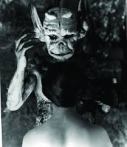 it won acclaim in Denmark and Sweden when first released, Haxan was heavily censored or banned outright in many countries. But it is now considered to be Christensen’s finest work, a witches’ brew of the scary, the grotesque, and the darkly humorous. With live musical accompaniment from the incredibly inventive Jane Gardner (piano) and Hazel Morrison (percussion).
it won acclaim in Denmark and Sweden when first released, Haxan was heavily censored or banned outright in many countries. But it is now considered to be Christensen’s finest work, a witches’ brew of the scary, the grotesque, and the darkly humorous. With live musical accompaniment from the incredibly inventive Jane Gardner (piano) and Hazel Morrison (percussion).
An eclectic mix of titles and genres, all with live musical accompaniment from some of the best silent film musicians in the business, what more could you want as a means of getting back into the habit of silent film going. And don’t forget, the Hippodrome Silent Film Festival proper will be back in business from Wednesday 16 to Sunday 20 March 2022
Full details of all of these screenings are available on silentfilmcalendar.org here
9 August
Is there room for in-person and on-line screenings – Stummfilmtage Bonn shows the way. There have been all too few positives over the last 18 months of the Covid pandemic. But, from a silent film perspective, one surely has to be the growth of live on-line screenings. Whether it has been Ben and Steve’s Silent Comedy Watch Party from New York, Retroformat Films from Los Angeles, the Narodny Film Archive from the Czech Republic or our own Michelle and the rest of the Kennington Bioscope team here in London, they have certainly made all the difference during lock-down.
But with in-person silent film screenings restarting there is the prospect of such live on-line screenings coming to  an end. This would be a shame. Of course, given the choice, we
an end. This would be a shame. Of course, given the choice, we ’d all prefer a live, in-person, actual ‘bums-on-seats’ event to that of watching on our own via a video screen. There is just something extra that comes from watching a film as part of an audience, that shared laugh at Keaton in The General, a communal gasp of disbelief at Fairbank’s athleticism in Mark Of Zorro or even a quiet mutual tear at Louise Brooks’ lifeless face in Prix de Beauté. But there surely remains a place for on-line screenings, for two reasons in particular.
’d all prefer a live, in-person, actual ‘bums-on-seats’ event to that of watching on our own via a video screen. There is just something extra that comes from watching a film as part of an audience, that shared laugh at Keaton in The General, a communal gasp of disbelief at Fairbank’s athleticism in Mark Of Zorro or even a quiet mutual tear at Louise Brooks’ lifeless face in Prix de Beauté. But there surely remains a place for on-line screenings, for two reasons in particular.
Firstly, apart from at specialised events or festival screenings, live silent film screenings are  largely dominated to a very restrictive programme
largely dominated to a very restrictive programme  range. A casual silent film goer might be forgiven for believing that silent film history consisted of Nosferatu, Metropolis, Phantom Of The Opera, Pandora’s Box and not much more given the frequency with which these same few films are screened, again and again. But on-line screenings provide the opportunity to bring a much broader range of films to a wider audience. Who, for example would get to see the wonderful Czech comedy The
range. A casual silent film goer might be forgiven for believing that silent film history consisted of Nosferatu, Metropolis, Phantom Of The Opera, Pandora’s Box and not much more given the frequency with which these same few films are screened, again and again. But on-line screenings provide the opportunity to bring a much broader range of films to a wider audience. Who, for example would get to see the wonderful Czech comedy The  Lovers of an Old Criminal(1927) or the equally brilliant The Sins of Love (
Lovers of an Old Criminal(1927) or the equally brilliant The Sins of Love ( 1929) if Narodny Film Archive hadn’t brought them to a wider audience. And how would we have seen the amazingly inventive A Kiss From Mary Pickford (1927) if the Hippodrome Silent Film Festival hadn’t shared it on-line. And what about Oscar Micheaux rarity Within Our Gates (1920) shared by the Cinema Arts Centre in Huntington NY or Lois Weber’s Hypocrites (1915) screened on-line by Gateway Film Festival in Peterborough. All screened with live musical accompaniment.
1929) if Narodny Film Archive hadn’t brought them to a wider audience. And how would we have seen the amazingly inventive A Kiss From Mary Pickford (1927) if the Hippodrome Silent Film Festival hadn’t shared it on-line. And what about Oscar Micheaux rarity Within Our Gates (1920) shared by the Cinema Arts Centre in Huntington NY or Lois Weber’s Hypocrites (1915) screened on-line by Gateway Film Festival in Peterborough. All screened with live musical accompaniment.
A second benefit of continued on-line silent film screenings is audience reach. For those of us lucky to live in areas with thriving silent film communities, such as London or Bristol, or with regular film festival events such as the Hippodrome or Yorkshire festivals there are rich pickings. But much of the rest of the country remains a veritable desert for silent film screenings. On-line screenings offer the opportunity to cater to and perhaps even generate a wider audience for silent film nationwide.
 It is therefore great news to see that not only is this year’s Bonn
It is therefore great news to see that not only is this year’s Bonn  Silent Film Festival going ahead in person but the entire programme is being screened on-line. As well as screening a few well known titles ( for example, Waxworks (1924), Speedy (1928) and The Signal Tower (1924) ) the festival programme offers an ambitious collection of European rarities, many of which are unlikely to be familiar even to hard-core silent film buffs. These include Czech slapstick comedy The Kidnapping of Fux the Banker (1923), Swedish cross-dressing comedy The Girl In Tails (1926) and Italian diva film Flower of Evil (1915) as well as Carl Theodor Dreyer’s directorial debut The President (1919), an astonishingly mature and confidently realised social drama.
Silent Film Festival going ahead in person but the entire programme is being screened on-line. As well as screening a few well known titles ( for example, Waxworks (1924), Speedy (1928) and The Signal Tower (1924) ) the festival programme offers an ambitious collection of European rarities, many of which are unlikely to be familiar even to hard-core silent film buffs. These include Czech slapstick comedy The Kidnapping of Fux the Banker (1923), Swedish cross-dressing comedy The Girl In Tails (1926) and Italian diva film Flower of Evil (1915) as well as Carl Theodor Dreyer’s directorial debut The President (1919), an astonishingly mature and confidently realised social drama.
All of the films are being screened with live musical accompaniment. 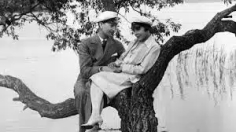 They will first be screened ‘in-person’ at the open air courtyard of the University of Bonn. Each day’s film (and musical accompaniment) will then be made available on the
They will first be screened ‘in-person’ at the open air courtyard of the University of Bonn. Each day’s film (and musical accompaniment) will then be made available on the  festival website
festival website the following day and will remain available to view for 48 hours…for free!!! The festival opens on 12th August (with first on-line screening on the 13th) and runs until 22nd August. What is there not to like about this? An event surely not to be missed and hopefully one that will encourage the continuation of on-line screenings!
the following day and will remain available to view for 48 hours…for free!!! The festival opens on 12th August (with first on-line screening on the 13th) and runs until 22nd August. What is there not to like about this? An event surely not to be missed and hopefully one that will encourage the continuation of on-line screenings!
Full details of the festival screenings are available here
21 February
 A Bumper Time For On-Line Audiences We mentioned a couple of days ago (see 17 February below) that the next few weeks were a good time for Live On-Line Silent Film Festivals. Well, the same is true for non-live On-Line resources too. Starting, somewhat surprisingly, with Netflix, they have recently begun offering viewers a choice of ten (yes ten!) top notch Swedish silents from the 1910s and 1920s. These films come from an era when Scandanavian
A Bumper Time For On-Line Audiences We mentioned a couple of days ago (see 17 February below) that the next few weeks were a good time for Live On-Line Silent Film Festivals. Well, the same is true for non-live On-Line resources too. Starting, somewhat surprisingly, with Netflix, they have recently begun offering viewers a choice of ten (yes ten!) top notch Swedish silents from the 1910s and 1920s. These films come from an era when Scandanavian  film making was at the cutting edge of film artistry and innovation worldwide and Swedish cinema in particular was enjoying its first golden age. They were made by directors such as C T Dryer, Victor Sjostrom and Mauritz Stiller who would go on to have prestigious careers in both Europe and America. The films include;
film making was at the cutting edge of film artistry and innovation worldwide and Swedish cinema in particular was enjoying its first golden age. They were made by directors such as C T Dryer, Victor Sjostrom and Mauritz Stiller who would go on to have prestigious careers in both Europe and America. The films include;  the breathtaking Arctic melodrama The Strongest (Den Starkaste, Dir. Axel Lindblom and Alf Sjoberg, Sw, 1929); the heartwarming (and heartbreaking) The Parson’s Widow (Prastankan, Dir. C T Dreyer, Sw, 1920) with a wonderful performance by 76 year old Hildur Carlberg (who sadly did not live to see the completed film) and a superb early example of Scandanavian social realism with Ingeborg Holm (Dir. Victor Sjostrom, Sw, 1913) which helped bring about a change in Swedish social legislation. Other films in the list include the melodramas A Man There Was (Terje Vigen, Dir Victor Sjostrom, Sw, 1917), Sir Arnes Traesure (Herr Arnes Pengar, Dir Mauritz Stiller, SW, 1919) and Pilgramage to Kevlaar (Vallfarten till Kevlaar, Dir. Ivan Hedqvist, Sw, 1921); an early feminist drama The Norrtull Gang (Norrtullsligan, Dir. Per Lindberg, Sw, 1923); a comedy adventure The Malar
the breathtaking Arctic melodrama The Strongest (Den Starkaste, Dir. Axel Lindblom and Alf Sjoberg, Sw, 1929); the heartwarming (and heartbreaking) The Parson’s Widow (Prastankan, Dir. C T Dreyer, Sw, 1920) with a wonderful performance by 76 year old Hildur Carlberg (who sadly did not live to see the completed film) and a superb early example of Scandanavian social realism with Ingeborg Holm (Dir. Victor Sjostrom, Sw, 1913) which helped bring about a change in Swedish social legislation. Other films in the list include the melodramas A Man There Was (Terje Vigen, Dir Victor Sjostrom, Sw, 1917), Sir Arnes Traesure (Herr Arnes Pengar, Dir Mauritz Stiller, SW, 1919) and Pilgramage to Kevlaar (Vallfarten till Kevlaar, Dir. Ivan Hedqvist, Sw, 1921); an early feminist drama The Norrtull Gang (Norrtullsligan, Dir. Per Lindberg, Sw, 1923); a comedy adventure The Malar  Pirates (Malarpirater, Dir. Gustaf Molander, Sw, 1923); the romantic comedy Erotikon (Dir. Mauritz Stiller, Sw, 1920); and the madcap comedy Artificial Svensson (Konstgjorda Svensson, Dir. Gustav Edgren, Sw, 1929) which also comes with a delightful sound introduction to explain why it remains a silent film (albeit with some musical interludes). Now, if only they would add the wonderful comedy A Sister of Six (Flickorna Gyurkovics, Dir. Ragnar Hyltén-Cavallius, Sw, 1926) starring Britain’s own “Queen of Happiness” Betty Balfour to this list, life would be almost complete. Sadly, the only drawback to these Netflix screenings is that they come without any musical accompaniment. Details at netflix.com/gb/
Pirates (Malarpirater, Dir. Gustaf Molander, Sw, 1923); the romantic comedy Erotikon (Dir. Mauritz Stiller, Sw, 1920); and the madcap comedy Artificial Svensson (Konstgjorda Svensson, Dir. Gustav Edgren, Sw, 1929) which also comes with a delightful sound introduction to explain why it remains a silent film (albeit with some musical interludes). Now, if only they would add the wonderful comedy A Sister of Six (Flickorna Gyurkovics, Dir. Ragnar Hyltén-Cavallius, Sw, 1926) starring Britain’s own “Queen of Happiness” Betty Balfour to this list, life would be almost complete. Sadly, the only drawback to these Netflix screenings is that they come without any musical accompaniment. Details at netflix.com/gb/
February also saw the launch of KLASSiKi, an On-Line streaming service for films from Russia, the Caucasus, Central Asia and beyond.Amongst an initial library of some 60 titles (with regular new additions) are a number of silents. Of particular note, which bodes well for the future, is that although the silents selected include the well known Battleship  Potemkin (Dir. Sergei Eisenstein, USSR, 1926), the rest are far less well known, providing the welcome opportunity to catch up on some real rarities unavailable virtually anywhere else. Amongst these are the pre-revolution romantic melodrama A Life For A Life ( Dir. Yevgeni Bauer, Rus, 1916); the wonderfully funny Girl With A Hat Box (Dir. Boris Barnett, USSR, 1926) starring the luminous
Potemkin (Dir. Sergei Eisenstein, USSR, 1926), the rest are far less well known, providing the welcome opportunity to catch up on some real rarities unavailable virtually anywhere else. Amongst these are the pre-revolution romantic melodrama A Life For A Life ( Dir. Yevgeni Bauer, Rus, 1916); the wonderfully funny Girl With A Hat Box (Dir. Boris Barnett, USSR, 1926) starring the luminous  Anna Sten; a burlesque comedy with minimal plot, Love Berries (Dir. Alexander Dovzhenko, Ukr, 1926) from a director better known for his far more serious ‘Ukraine Trilogy’of realist dramas; and finally My Grandmother (Dir. Kote Mikaberizde, Geo, 1926) a surreal critique of bureaucracy in which the director uses dizzying constructivist sets, animation and even puppetry to invoke the fear and corruption underpinning the state. All of these films come with top notch musical accompaniment. This is a great start from KLASSiKi and offers the prospect of more silent delights to come. More details at klassiki.online.
Anna Sten; a burlesque comedy with minimal plot, Love Berries (Dir. Alexander Dovzhenko, Ukr, 1926) from a director better known for his far more serious ‘Ukraine Trilogy’of realist dramas; and finally My Grandmother (Dir. Kote Mikaberizde, Geo, 1926) a surreal critique of bureaucracy in which the director uses dizzying constructivist sets, animation and even puppetry to invoke the fear and corruption underpinning the state. All of these films come with top notch musical accompaniment. This is a great start from KLASSiKi and offers the prospect of more silent delights to come. More details at klassiki.online.
 And if this wasn’t enough, don’t forget that several Silent Film Festival websites are offering streaming of some of the films screened at their festivals. The San Francisco Silent Film Festival’s current offerings include; The Last Edition (Dir. Emory Johnson, US, 1925), a crime melodrama set in a San Francisco newspaper office; Jane’s Declaration of Independence (Dir. Charles Giblyn, USA 1915) a
And if this wasn’t enough, don’t forget that several Silent Film Festival websites are offering streaming of some of the films screened at their festivals. The San Francisco Silent Film Festival’s current offerings include; The Last Edition (Dir. Emory Johnson, US, 1925), a crime melodrama set in a San Francisco newspaper office; Jane’s Declaration of Independence (Dir. Charles Giblyn, USA 1915) a 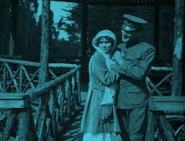 charming story of domestic upheaval when a headstrong young woman defies her father for the man she loves; and What’s The World Coming To? (Dir. Richard Wallace, US, 1926), an amusing comedy set in the future in a world dominated by women, where men are the ‘weaker sex’ and Clyde Cook is the ‘blushing bride’. Details at silentfilm.org.
charming story of domestic upheaval when a headstrong young woman defies her father for the man she loves; and What’s The World Coming To? (Dir. Richard Wallace, US, 1926), an amusing comedy set in the future in a world dominated by women, where men are the ‘weaker sex’ and Clyde Cook is the ‘blushing bride’. Details at silentfilm.org.  Meanwhile, the Giornate del Cinema Muto in Pordenone currently offers; The House of Shadows (Moraenen Dir. Anders Wilhelm Sandberg, Dk, 1924) a story of family intrigue and murder; The Betrothed (I Promessi Sposi, Dir. Mario Bonnard, It, 1922) an Italian epic based on a famous historical novel by Alessandro Manzoni, set in 17th century Lombardy during the Spanish domination which tells of the contrasted marriage between the two young textile workers Renzo and Lucia and is one of the most ambitious and spectacular examples of Italian silent cinema; and New Babylon (Novyi Vavilon, Dir. Grigori Kozintsev and Leonid Trauberg, USSR, 1929) an allegorical Russian epic based upon the story of the 1871 Paris Commune. Details at giornatedelcinemamuto.it. All the films from both SFSFF and Pordenone come with superb musical accompaniment from leading silent film musicians and are free to watch. So what’s stopping you? Get watching now!
Meanwhile, the Giornate del Cinema Muto in Pordenone currently offers; The House of Shadows (Moraenen Dir. Anders Wilhelm Sandberg, Dk, 1924) a story of family intrigue and murder; The Betrothed (I Promessi Sposi, Dir. Mario Bonnard, It, 1922) an Italian epic based on a famous historical novel by Alessandro Manzoni, set in 17th century Lombardy during the Spanish domination which tells of the contrasted marriage between the two young textile workers Renzo and Lucia and is one of the most ambitious and spectacular examples of Italian silent cinema; and New Babylon (Novyi Vavilon, Dir. Grigori Kozintsev and Leonid Trauberg, USSR, 1929) an allegorical Russian epic based upon the story of the 1871 Paris Commune. Details at giornatedelcinemamuto.it. All the films from both SFSFF and Pordenone come with superb musical accompaniment from leading silent film musicians and are free to watch. So what’s stopping you? Get watching now!
17 February
 A Fest of On-Line Festivals. We may still be stuck in the depths of lockdown but the next few weeks should see a little relief from the gloom with not one, not two, but three On-Line silent film festivals taking place. First up is the Kansas Silent Film Festival all the way from Topeka in, you guessed it, Kansas and screening on the 26th and 27th February.
A Fest of On-Line Festivals. We may still be stuck in the depths of lockdown but the next few weeks should see a little relief from the gloom with not one, not two, but three On-Line silent film festivals taking place. First up is the Kansas Silent Film Festival all the way from Topeka in, you guessed it, Kansas and screening on the 26th and 27th February.  Both days open with a collection of comedy shorts including Charley Chase in Movie Night (1929), Dorothy Devore in Hold Your Breath (1924) and, right back to the earliest days of film comedy, Edwin S Porter’s Jack The Kisser (1907). The main feature on the opening night is Herbert Wilcox’s first directorial version of Nell Gwyn (1926) starring Dorothy Gish and Randle Ayrton which had the somewhat unusual distinction of being a British film that proved popular in the United States. It also
Both days open with a collection of comedy shorts including Charley Chase in Movie Night (1929), Dorothy Devore in Hold Your Breath (1924) and, right back to the earliest days of film comedy, Edwin S Porter’s Jack The Kisser (1907). The main feature on the opening night is Herbert Wilcox’s first directorial version of Nell Gwyn (1926) starring Dorothy Gish and Randle Ayrton which had the somewhat unusual distinction of being a British film that proved popular in the United States. It also  has the added attraction of musical accompaniment by the Mont Alto Motion Picture Orchestra. The closing feature on the second night is Simba (1928) the only surviving feature length documentary by husband and wife team Martin and Osa Johnson who were probably America’s foremost filmmaker-explorers of the 1920s. The film follows their travels through Africa and not only does much of the footage remain stunning but it also provides an invaluable record of a now lost world. And as well as a nice collection of films being screenedh, the other big plus for the KSFF is….its free to watch!. Further details can be found here.
has the added attraction of musical accompaniment by the Mont Alto Motion Picture Orchestra. The closing feature on the second night is Simba (1928) the only surviving feature length documentary by husband and wife team Martin and Osa Johnson who were probably America’s foremost filmmaker-explorers of the 1920s. The film follows their travels through Africa and not only does much of the footage remain stunning but it also provides an invaluable record of a now lost world. And as well as a nice collection of films being screenedh, the other big plus for the KSFF is….its free to watch!. Further details can be found here.
 Next up, and a little nearer to home (not that such things matter in the new ‘virtual’ world!) is Bristol’s long-running Slapstick Festival which runs 1 – 7 March. Now Slapstick is of course much more than just a silent film event but silents have traditionally made up a significant quota of the festival’s events and this year is no different. The festival opens with a W C Fields double bill of Running Wild (1927) in which gains the courage
Next up, and a little nearer to home (not that such things matter in the new ‘virtual’ world!) is Bristol’s long-running Slapstick Festival which runs 1 – 7 March. Now Slapstick is of course much more than just a silent film event but silents have traditionally made up a significant quota of the festival’s events and this year is no different. The festival opens with a W C Fields double bill of Running Wild (1927) in which gains the courage  of a lion thanks to a vaudeville hypnotist, followed by Pool Sharks (1915), his first screen appearance. Then there’s Max Linder staring in The Three Must-Get-Theres (1922) his pastiche on The Three Musketeers. Clara Bow
of a lion thanks to a vaudeville hypnotist, followed by Pool Sharks (1915), his first screen appearance. Then there’s Max Linder staring in The Three Must-Get-Theres (1922) his pastiche on The Three Musketeers. Clara Bow  puts in a couple of appearances, first in the iconic It (1927) as well as in the (dare I say it) even funnier Kid Boots (1926) co-starring with Eddie Cantor. Keeping with the theme of female stars, there is also Josephine Baker in Siren of the Tropics (1927). And there’s even (and say it in hushed tones!) a ‘talkie. But it does star Harold Lloyd, so that’s OK. In fact, Movie Crazy (1932) is more than OK, its a riot. As well as the films, all of which come with top-notch musical accompaniment, there are talks, discussions, guest presenters, Q & A’s and lots more in an ambitiously packed programme. Find out more here.
puts in a couple of appearances, first in the iconic It (1927) as well as in the (dare I say it) even funnier Kid Boots (1926) co-starring with Eddie Cantor. Keeping with the theme of female stars, there is also Josephine Baker in Siren of the Tropics (1927). And there’s even (and say it in hushed tones!) a ‘talkie. But it does star Harold Lloyd, so that’s OK. In fact, Movie Crazy (1932) is more than OK, its a riot. As well as the films, all of which come with top-notch musical accompaniment, there are talks, discussions, guest presenters, Q & A’s and lots more in an ambitiously packed programme. Find out more here.
 Lastly, but by no means least, there’s the Hippodrome Festival of Silent Film (HippFest) from Bo’ness, running 17 – 21 March, with an equally ambitious programme. It opens with Oscar Micheaux’s Body and Soul (1925) with an electrifying performance by Paul Robeson. It may be a silent but you’d swear you could hear Robeson’s mighty voice booming out as the bogus
Lastly, but by no means least, there’s the Hippodrome Festival of Silent Film (HippFest) from Bo’ness, running 17 – 21 March, with an equally ambitious programme. It opens with Oscar Micheaux’s Body and Soul (1925) with an electrifying performance by Paul Robeson. It may be a silent but you’d swear you could hear Robeson’s mighty voice booming out as the bogus  minister. There is another slice of early silent documentary making with Grass: A Nation’s Battle For Life (1925) brought to you by the same team that went on to make King Kong (1933). Anthony Asquith’s Underground (1928) is being screened with with Neil Brand’s orchestral score. Then there is Valentino in The Eagle (1925), Mary Pickford in Sparrows (1926) and Marlene Dietrich in her first major role in The Woman That Men Yearn For (1929). But the undoubted highlight of the festival is an incredibly rare
minister. There is another slice of early silent documentary making with Grass: A Nation’s Battle For Life (1925) brought to you by the same team that went on to make King Kong (1933). Anthony Asquith’s Underground (1928) is being screened with with Neil Brand’s orchestral score. Then there is Valentino in The Eagle (1925), Mary Pickford in Sparrows (1926) and Marlene Dietrich in her first major role in The Woman That Men Yearn For (1929). But the undoubted highlight of the festival is an incredibly rare  screening of Louise Brooks’ third and final European film, the sublime Prix de Beauté (1930). And better than that, it comes with musical accompaniment by the brilliant Stephen Horne. As well as the films, there are talks, introductions by knowledgeable and distinguished guests, a Hollywood walking tour and even a silent cook-along. Find out more here
screening of Louise Brooks’ third and final European film, the sublime Prix de Beauté (1930). And better than that, it comes with musical accompaniment by the brilliant Stephen Horne. As well as the films, there are talks, introductions by knowledgeable and distinguished guests, a Hollywood walking tour and even a silent cook-along. Find out more here
So, all in all, a great deal to look forward to. Further details are available on our Live On-Line Events page here.
27 October
 Soundtrack To Award Winning Buster Keaton One-Man Show Now Available. Back in 2017, composer and performer James Dangerfield had both a critical and popular success with his one-man show When You Fall Down-The Buster Keaton Story. The show followed Keaton’s personal and professional triumphs and trials as he films the most iconic movies of the
Soundtrack To Award Winning Buster Keaton One-Man Show Now Available. Back in 2017, composer and performer James Dangerfield had both a critical and popular success with his one-man show When You Fall Down-The Buster Keaton Story. The show followed Keaton’s personal and professional triumphs and trials as he films the most iconic movies of the  silent era. As the world whirls around him, with his marriage failing, his best friend on trial, his career in danger and turning to the bottle, Buster must hit his mark as he films the most dangerous stunt of all. The show premiered in the US in front of Buster’s own family and it was endorsed by The International Buster Keaton Society. After touring the UK in 2018, the show played to sell-out audiences in Paris, London and Edinburgh.
silent era. As the world whirls around him, with his marriage failing, his best friend on trial, his career in danger and turning to the bottle, Buster must hit his mark as he films the most dangerous stunt of all. The show premiered in the US in front of Buster’s own family and it was endorsed by The International Buster Keaton Society. After touring the UK in 2018, the show played to sell-out audiences in Paris, London and Edinburgh.
As well as being a popular success, When You Fall Down-The Buster Keaton Story also attracted rave reviews;
-
- “In this exquisite new one-man show… Dangerfield’s dance, mime and physicality are riveting… His songs
 and singing technique are reminiscent of contemporary West End shows, but it is the palpable intensity of his commitment that makes this show very special”. ★★★★★ (ThreeWeeks)
and singing technique are reminiscent of contemporary West End shows, but it is the palpable intensity of his commitment that makes this show very special”. ★★★★★ (ThreeWeeks)
- “In this exquisite new one-man show… Dangerfield’s dance, mime and physicality are riveting… His songs
-
- “The hugely talented James Dangerfield has succeeded so magnificently in bringing Buster to life before our very eyes… It’s a thrilling 50 minutes… and most movingly gives voice to Buster the man”. ★★★★ (LondonTheatre1)
-
- “An impeccable performance and a sublime show… Enchanting yet informative, full of slapstick, beautiful music, and a dash of pathos – a gargantuan effort by writer/performer James Dangerfield.” ★★★★ (Mind The Blog)
picking up in the process a prestigious Three Weeks Editors’ Choice Award and a nomination for Musical  Theatre Review’s Best Musical at The Edinburgh Fringe.
Theatre Review’s Best Musical at The Edinburgh Fringe.
James had intended to tour once more with his one-man show in 2020 but of course Covid-19 and lock-down have put these plans on hold. However, if we can’t yet get another chance to see the show then listening to the soundtrack must be the next best thing. So you will be pleased to hear that the soundtrack to this award winning show, with music & lyrics by James Dangerfield and arrangements & instrumentals by Martyn Stringer, is now available online from https://fanlink.to/WYFD Get it and you won’t be disappointed.
22 July
 Extra! Extra! Silent Film Festival To Go Ahead! Amid a seemingly never-ending string of pandemic driven cancellations and postponements for silent film screenings and festivals around the world it comes as something of a pleasant change to report one going ahead as planned. So its very welcome news to hear that the 36th Bonn International Silent Days Film Festival, Germany’s largest festival of silent film, will go ahead as planned on 6th to 16th August. Screenings at the festival are traditionally held in the open courtyard of the University of Bonn with live musical accompaniment from many of the world’s leading silent film accompanists. That remains the intention this year but covid-19 restrictions mean that attendance at these live events will be limited to 500 people.
Extra! Extra! Silent Film Festival To Go Ahead! Amid a seemingly never-ending string of pandemic driven cancellations and postponements for silent film screenings and festivals around the world it comes as something of a pleasant change to report one going ahead as planned. So its very welcome news to hear that the 36th Bonn International Silent Days Film Festival, Germany’s largest festival of silent film, will go ahead as planned on 6th to 16th August. Screenings at the festival are traditionally held in the open courtyard of the University of Bonn with live musical accompaniment from many of the world’s leading silent film accompanists. That remains the intention this year but covid-19 restrictions mean that attendance at these live events will be limited to 500 people.
However, there is a major up side to this audience limit as the festival organisers have decided to stream each evening’s film on-line via the festival website, shortly after the live screening in Bonn concludes. Each film will be accompanied by a recording of the event’s live accompaniment and the films will remain on-line for 48 hours for people to watch on ‘catch-up’ should they choose. It is hoped also to stream at least part of each day’s supporting programme.
The festival programme has now been released and includes some great screenings;
 August 6 – East And West (Dir.Sidney M. Goldin, Au, 1923). One of the few surviving examples of Yiddish cinema, East And West is also a delightful comedy detailing the exploits of the daughter of a rich Jewish American businessman who travels to the wedding of her demure cousin who lives in a traditional Polish shtetl.
August 6 – East And West (Dir.Sidney M. Goldin, Au, 1923). One of the few surviving examples of Yiddish cinema, East And West is also a delightful comedy detailing the exploits of the daughter of a rich Jewish American businessman who travels to the wedding of her demure cousin who lives in a traditional Polish shtetl.
August 7 – Looping the Loop (German: Die Todesschleife) (Dir.Arthur Robison, Ger, 1928) Circus and variety films were a popular genre in the silent film era. This late silent era thriller starring Robert Reinert (who died before it was completed) tells the story of a clown who, while disguising his identity, woos a young artist.
 August 8 – L’Argent (Dir Marcel L’Herbier, Fr, 1928). L’Herbier’s classic is a spectacular large-scale production that describes the world of financial markets and speculators, focusing on two rival bankers, both of whom have a love affair with the beautiful Baroness Sandorf, played of course by the wonderful Brigitte Helm
August 8 – L’Argent (Dir Marcel L’Herbier, Fr, 1928). L’Herbier’s classic is a spectacular large-scale production that describes the world of financial markets and speculators, focusing on two rival bankers, both of whom have a love affair with the beautiful Baroness Sandorf, played of course by the wonderful Brigitte Helm
August 9 – Mälarpirater (Dir. Gustaf Molander, Swe, 1928) Gustaf Molander, who had worked closely with Sjostrom and Stiller, began to direct films and quickly showed that he was something more than an apt pupil. His Malarpirater was a fresh and spontaneous piece about three boys who steal a boat and sail away for a summer adventure on Lake Mälaren. Based on Sigfrid Siwertz’s novel it is well acted by Einar Hansson and Inga Tidblad.
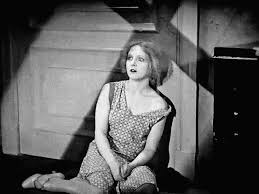 August 10 – Mädchen am Kreuz (Girl On THe Cross) (Dir. Luise and Jakob Fleck, Ger, 1929) Young student Mary spends her vacation starting with boat trips, visits to her wealthy groom, and gardening. In fast-paced, rhythmic cuts, Louise and Jakob Fleck draw their audience into a light-hearted, urban comedy of love that transforms itself into a melodrama about sexual violence, shame and perpetrator-victim reversal with a single scene.
August 10 – Mädchen am Kreuz (Girl On THe Cross) (Dir. Luise and Jakob Fleck, Ger, 1929) Young student Mary spends her vacation starting with boat trips, visits to her wealthy groom, and gardening. In fast-paced, rhythmic cuts, Louise and Jakob Fleck draw their audience into a light-hearted, urban comedy of love that transforms itself into a melodrama about sexual violence, shame and perpetrator-victim reversal with a single scene.
August 11 – Peg o’ the Mounted (Dir. Alfred J Goulding, US, 1924) When an injured and exhausted Mountie collapses outside her cabin, it falls to Baby Peggy to take up the challenge and track down the illegal moonshiners + Wolf Lowery (Dir. William S Hart, US, 1917) The only surviving example of Hart’s directorial work, Wolf Lowery sees him as the owner of the Bar Z Ranch. He gets worked up when he finds a squatter on his land, but after he discovers that the settler is a woman, Margery Wilson, his attitude changes.
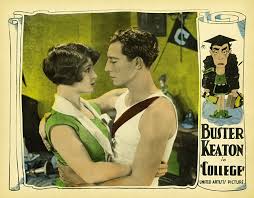 August 12 – Duck Soup (Dir. Fred Guoil, US, 1927) Playing together in this film although not yet the famous duo, Stan Laurel and Oliver Hardy are vagrants who wreak havoc in an abandoned villa + College (Dir. James W Horne/ Buster Keaton, US, 1927) which sees Buster Keaton having to master sporting activities and competitions in order to win his beloved. College is one of the best sports parodies in film history, in whose breathtaking finale Keaton did without doubles and camera tricks and brilliantly demonstrated his athletic skills.
August 12 – Duck Soup (Dir. Fred Guoil, US, 1927) Playing together in this film although not yet the famous duo, Stan Laurel and Oliver Hardy are vagrants who wreak havoc in an abandoned villa + College (Dir. James W Horne/ Buster Keaton, US, 1927) which sees Buster Keaton having to master sporting activities and competitions in order to win his beloved. College is one of the best sports parodies in film history, in whose breathtaking finale Keaton did without doubles and camera tricks and brilliantly demonstrated his athletic skills.
August 13 – The Student of Prague (Dir. Henrik Galeen, Ger, 1926) This darkly romantic tale, with echoes of the Faust legend and Poe’s William Wilson, is a superbly crafted remake of Stellan Rye’s supernatural chiller of 1913. An impoverished student (Conrad Veidt) sells his mirror reflection to a moneylender and is subsequently stalked by a Doppelgänger over whom he has no control. Veidt’s virtuosic portrayal of a split personality plumbs terrifying depths.
 August 14 – Phantom of the Moulin Rouge (aka Le fantôme du Moulin Rouge)(Dir Rene Clair, Fr, 1925) The Phantom of the Moulin Rouge continues with the same mischievously surreal themes of Clair’s first two short films with the story of a man, frustrated in his romantic ambitions, who becomes the victim for a scientific experiment in which a strange doctor separates the soul of the man from his body.
August 14 – Phantom of the Moulin Rouge (aka Le fantôme du Moulin Rouge)(Dir Rene Clair, Fr, 1925) The Phantom of the Moulin Rouge continues with the same mischievously surreal themes of Clair’s first two short films with the story of a man, frustrated in his romantic ambitions, who becomes the victim for a scientific experiment in which a strange doctor separates the soul of the man from his body.
August 15 – Storm Over Asia (Dir. Vsevolod Pudovkin, USSR, 1928) A classic of Soviet revolutionary film, Storm Over Asia opens with an ethnographic study of the everyday life of the Mongols before moving on to present a picture of their struggle against British colonial rule.
 August 16 – Le Moulin Maudit (Dir.Alfred Machin, Bel, 1910) In this exquisitely coloured short melodrama Dutch girl Johanna loves poor Joachim, but marries the wealthy miller instead. When the miller finds the two lovers together he takes an awful revenge + Maudite soit la Guerre (War Is Hell) (Dir,Alfred Machin,Bel, 1914) Made just before the outbreak of The Great War, this is a startling masterpiece of early cinema, The film shows how war destroys love and friendship through the story of two friends obliged to fight each other as pilots in the airforce of their respective (unnamed) countries.
August 16 – Le Moulin Maudit (Dir.Alfred Machin, Bel, 1910) In this exquisitely coloured short melodrama Dutch girl Johanna loves poor Joachim, but marries the wealthy miller instead. When the miller finds the two lovers together he takes an awful revenge + Maudite soit la Guerre (War Is Hell) (Dir,Alfred Machin,Bel, 1914) Made just before the outbreak of The Great War, this is a startling masterpiece of early cinema, The film shows how war destroys love and friendship through the story of two friends obliged to fight each other as pilots in the airforce of their respective (unnamed) countries.
All the films will have live musical accompaniment from noted silent fill accompanists including Stephen Horne, Elizabeth-Jane Baldry, Neil Brand and Günter A. Buchwald. Find out more about the festival here
25 May
Live On-Line Silent Film Event Update Lock-down may be preventing us from getting out to see silent film events ‘in the flesh’. But don’t forget that there are still opportunities to see films at live On-Line screenings. Forthcoming events include;
 – Wednesday 27 May The Kennington Bioscope present the third of their Live Stream Broadcasts on the KBTV channel on You Tube. In an impressively high tech format they present silent films introduced by Michelle Facey (@best2vilmabanky) and accompanied live by pianists Cyrus Gabrysh and John Sweeney and this week also Colin Sell. This evenings they present 3 films courtesy of The Eye Film Museum’s Jean Desmet Collection, including Lois Weber starring in & directing TWINS (1911) + one rare DW Griffith Biograph film FATE (1913). Check out our review here of the previous episode to get an idea of the format. Further details of the event can be found here and you can watch here . Or why not subscribe here for future event details delivered straight to your In-Box. (NB This event will be available to watch live but will also remain available on You Tube to watch later.)
– Wednesday 27 May The Kennington Bioscope present the third of their Live Stream Broadcasts on the KBTV channel on You Tube. In an impressively high tech format they present silent films introduced by Michelle Facey (@best2vilmabanky) and accompanied live by pianists Cyrus Gabrysh and John Sweeney and this week also Colin Sell. This evenings they present 3 films courtesy of The Eye Film Museum’s Jean Desmet Collection, including Lois Weber starring in & directing TWINS (1911) + one rare DW Griffith Biograph film FATE (1913). Check out our review here of the previous episode to get an idea of the format. Further details of the event can be found here and you can watch here . Or why not subscribe here for future event details delivered straight to your In-Box. (NB This event will be available to watch live but will also remain available on You Tube to watch later.)
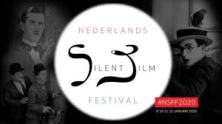 – Friday 29 May – The Netherlands Silent film Festival present their second silent film with live accompaniment event. Pianist Daan van den Hurk will once again accompany five silent comedy shorts live! We are also promised a few other surprises, but you have to tune in to find out what they are. The event kicks off at 7pm UK time. Further details here. (NB And remember, this is a one-time event, you can only watch live, there is no option to catch it later.)
– Friday 29 May – The Netherlands Silent film Festival present their second silent film with live accompaniment event. Pianist Daan van den Hurk will once again accompany five silent comedy shorts live! We are also promised a few other surprises, but you have to tune in to find out what they are. The event kicks off at 7pm UK time. Further details here. (NB And remember, this is a one-time event, you can only watch live, there is no option to catch it later.)
 – Sunday 31 May – Organ virtuoso Donald McKenzie will be providing live accompaniment to a screening of Harold Lloyd classic Speedy (1928) on the mighty Willis Organ at London’s Alexandra Palace. Speedy was Lloyd’s final silent film and sees him reprise his ‘glasses character’ as a baseball-obsessed New Yorker who is determined to save the city’s last horse-drawn streetcar, motivated in no small part by its owner being the grandfather of his love interest. Filled with Lloyd’s trademark rapid-fire visual humour and elaborate set-ups, it’s a fine example of his innovative approach to comedy. Find out more at allmovie.com. The film will be available on You Tube here at 7pm (NB Not clear if this is purely a live event or if you can catch up later.)
– Sunday 31 May – Organ virtuoso Donald McKenzie will be providing live accompaniment to a screening of Harold Lloyd classic Speedy (1928) on the mighty Willis Organ at London’s Alexandra Palace. Speedy was Lloyd’s final silent film and sees him reprise his ‘glasses character’ as a baseball-obsessed New Yorker who is determined to save the city’s last horse-drawn streetcar, motivated in no small part by its owner being the grandfather of his love interest. Filled with Lloyd’s trademark rapid-fire visual humour and elaborate set-ups, it’s a fine example of his innovative approach to comedy. Find out more at allmovie.com. The film will be available on You Tube here at 7pm (NB Not clear if this is purely a live event or if you can catch up later.)
 – Sunday 31 May – Now up to Episode 11 of the Silent Comedy Watch Party, live from New York and hosted by accompanist Ben Model and silent film historian Steve Massa. The usual format will be three silent comedies introduced by Steve and with Ben doing live piano accompaniment from his Upper West Side apartment. Film details are not yet available but as always they should be worth watching. The event streams at 20:00 UK time on You Tube. Further details here. (NB This event will be available to watch live but will also remain available on You Tube to watch later.)
– Sunday 31 May – Now up to Episode 11 of the Silent Comedy Watch Party, live from New York and hosted by accompanist Ben Model and silent film historian Steve Massa. The usual format will be three silent comedies introduced by Steve and with Ben doing live piano accompaniment from his Upper West Side apartment. Film details are not yet available but as always they should be worth watching. The event streams at 20:00 UK time on You Tube. Further details here. (NB This event will be available to watch live but will also remain available on You Tube to watch later.)
19 May
A Quick Update On Live On-Line Silent Film Events In May Lockdown may be preventing us from getting out to see silent film events ‘in the flesh’. But don’t forget that there are still opportunities to see films at live On-Line screenings. Forthcoming events include;
 – Tonight (19 May) the Sands Films Cinema Club in Rotherhithe will be screening Russian director Boris Barnet’s Girl With A Hat Box (1927) starring the incredible Anna Sten. If you’ve not seen it this is a delightful romantic-comedy about the complications that ensue when a young country milliner (Sten) pretends to marry a drifter so he can stay in the room in the city apartment which she pretends to rent but which is in fact the lounge of her employers apartment which they in turn claim to rent out. I’m not quite sure the format of the event but think that there will be an introduction to the film although it will then come with recorded rather than live accompaniment. The event starts at 19:45 for 20:00 on Facebook and You Tube. Further details here
– Tonight (19 May) the Sands Films Cinema Club in Rotherhithe will be screening Russian director Boris Barnet’s Girl With A Hat Box (1927) starring the incredible Anna Sten. If you’ve not seen it this is a delightful romantic-comedy about the complications that ensue when a young country milliner (Sten) pretends to marry a drifter so he can stay in the room in the city apartment which she pretends to rent but which is in fact the lounge of her employers apartment which they in turn claim to rent out. I’m not quite sure the format of the event but think that there will be an introduction to the film although it will then come with recorded rather than live accompaniment. The event starts at 19:45 for 20:00 on Facebook and You Tube. Further details here
 – Wednesday 20 May. The Kennington Bioscope presents a pre-recorded talk by film historian David Trigg, illustrating how Charlie Chaplin drew upon his childhood haunts in South London when seeking ideas for locations and building his film sets in Hollywood. The talk will be on the Kennington Bioscope’s newly established KBTV Channel on You Tube. The event starts at 19:30 and further details can be found here
– Wednesday 20 May. The Kennington Bioscope presents a pre-recorded talk by film historian David Trigg, illustrating how Charlie Chaplin drew upon his childhood haunts in South London when seeking ideas for locations and building his film sets in Hollywood. The talk will be on the Kennington Bioscope’s newly established KBTV Channel on You Tube. The event starts at 19:30 and further details can be found here
 – Sunday 24 May Amazingly we are now up to Episode 10 of the Silent Comedy Watch Party, live from New York and hosted by accompanist Ben Model and silent film historian Steve Massa. The usual format will be three silent comedies introduced by Steve and with Ben doing live piano accompaniment from his Upper West Side apartment. Film details are not yet available but as always they should be worth watching. The event streams at 20:00 UK time on You Tube. Further details here
– Sunday 24 May Amazingly we are now up to Episode 10 of the Silent Comedy Watch Party, live from New York and hosted by accompanist Ben Model and silent film historian Steve Massa. The usual format will be three silent comedies introduced by Steve and with Ben doing live piano accompaniment from his Upper West Side apartment. Film details are not yet available but as always they should be worth watching. The event streams at 20:00 UK time on You Tube. Further details here
 – Wednesday 27 May The Kennington Bioscope present the third of their Live Stream Broadcasts on the KBTV channel on You Tube. In an impressively high tech format they present silent films introduced by Michelle Facey (@best2vilmabanky) and accompanied live by pianists Cyrus Gabrysh and John Sweeney. There are no details yet on the films being screened but to give you an idea of the format check out our review here of the previous episode. Further details of the event can be found here or subscribe here for future event details delivered straight to your In-Box.
– Wednesday 27 May The Kennington Bioscope present the third of their Live Stream Broadcasts on the KBTV channel on You Tube. In an impressively high tech format they present silent films introduced by Michelle Facey (@best2vilmabanky) and accompanied live by pianists Cyrus Gabrysh and John Sweeney. There are no details yet on the films being screened but to give you an idea of the format check out our review here of the previous episode. Further details of the event can be found here or subscribe here for future event details delivered straight to your In-Box.
1 April
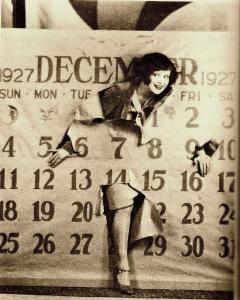 There’s Gold In Them There On-Line Silent Film Resources . The value of an on-line listing site for silent film screenings is somewhat diminished when no screenings are actually taking place, as is currently the case with the nationwide Corona Virus lock-down. So, in order both to justify our own continued existence and hopefully help ease the silent film withdrawal symptoms that are no doubt setting in we have been having a look at some on-line silent film resources which you might be interested in.
There’s Gold In Them There On-Line Silent Film Resources . The value of an on-line listing site for silent film screenings is somewhat diminished when no screenings are actually taking place, as is currently the case with the nationwide Corona Virus lock-down. So, in order both to justify our own continued existence and hopefully help ease the silent film withdrawal symptoms that are no doubt setting in we have been having a look at some on-line silent film resources which you might be interested in.
The obvious setting out point is the British Film Institute’s own BFI-player, here, which contains a wealth of material, much of it free to watch. But what of on-line resources further afield?
Well, if your interested in Man With A Movie Camera’s Dziga  Vertov then the Austrian Film Museum has a good collection of his earliest work. First up are 18 editions of the Kino-Nedelya (Film-Week) newsreels (Click here), produced between May 1918 and June 1919, which were Vertov’s first involvement in film making. Vertov started in the role of a secretary but by late 1918 he was effectively in charge of compiling the newsreels from footage shot by cameramen
Vertov then the Austrian Film Museum has a good collection of his earliest work. First up are 18 editions of the Kino-Nedelya (Film-Week) newsreels (Click here), produced between May 1918 and June 1919, which were Vertov’s first involvement in film making. Vertov started in the role of a secretary but by late 1918 he was effectively in charge of compiling the newsreels from footage shot by cameramen  travelling the length of the country charting the progress of the Red Army in the civil war together with key events and individuals from the earliest days of the newly established Soviet state. Compared to Vertov’s later work, the newsreels exhibit something of a staid conservatism in their compilation and are somewhat idealistically focused but they do also serve to provide a valuable picture of life during the earliest days of Soviet Union.
travelling the length of the country charting the progress of the Red Army in the civil war together with key events and individuals from the earliest days of the newly established Soviet state. Compared to Vertov’s later work, the newsreels exhibit something of a staid conservatism in their compilation and are somewhat idealistically focused but they do also serve to provide a valuable picture of life during the earliest days of Soviet Union.
 After going on to make three three feature length documentaries from this newsreel footage between 1919 and 1921 Vertov then embarked upon a more significant newsreel series, Kino-Pravda (Film-Truth). Comprising 23 films made between 1922 and 1925, the Austrian Film Museum has a complete set excluding number 12 which is sadly lost (Click here). Although the first few Kino-Pravdas are shot in a similar
After going on to make three three feature length documentaries from this newsreel footage between 1919 and 1921 Vertov then embarked upon a more significant newsreel series, Kino-Pravda (Film-Truth). Comprising 23 films made between 1922 and 1925, the Austrian Film Museum has a complete set excluding number 12 which is sadly lost (Click here). Although the first few Kino-Pravdas are shot in a similar  style to the earlier Kino-Nedelya series, Vertov was already trying to establish a theme for each newsreel in contrast to the somewhat random subject matter of the earlier series. But as the series progressed it also became evident that Vertov was experimenting with and developing his ‘Kino-Glaz’ (Film-Eye) theories of film editing and production. As such, the films present not just a valuable historical record of the era but also a useful guide to the evolution of Vertov’s style which reached its epitome in 1929 with Man With A Movie Camera, which can be viewed Here with superb accompaniment by the Alloy Orchestra.
style to the earlier Kino-Nedelya series, Vertov was already trying to establish a theme for each newsreel in contrast to the somewhat random subject matter of the earlier series. But as the series progressed it also became evident that Vertov was experimenting with and developing his ‘Kino-Glaz’ (Film-Eye) theories of film editing and production. As such, the films present not just a valuable historical record of the era but also a useful guide to the evolution of Vertov’s style which reached its epitome in 1929 with Man With A Movie Camera, which can be viewed Here with superb accompaniment by the Alloy Orchestra.
Both the Kino-Nedelya and the Kino-Pravda newsreel series are accompanied by a superb collection of informative background notes from the Austrian Film Museum and are well worth a look.
 If documentary news-reels aren’t your cup of tea, how about film travelogues? In which case have a look at what Italy’s National Museum of Cinema in Turin has to offer via Vimeo. There are lots of images of Italian locations,such as
If documentary news-reels aren’t your cup of tea, how about film travelogues? In which case have a look at what Italy’s National Museum of Cinema in Turin has to offer via Vimeo. There are lots of images of Italian locations,such as this stunning but sadly damaged footage of Venice. But there is so much more, with incredible footage from multiple European locations including Spain, here (but watch out for the gruesome cock fighting scenes!) and Switzerland, here. However, this site is about much more than just travelogues. There is some amazing footage of an Italian submarine squadron here, filmed in the Mediterranean in 1912 together with equally impressive footage here of the Italian navy,
this stunning but sadly damaged footage of Venice. But there is so much more, with incredible footage from multiple European locations including Spain, here (but watch out for the gruesome cock fighting scenes!) and Switzerland, here. However, this site is about much more than just travelogues. There is some amazing footage of an Italian submarine squadron here, filmed in the Mediterranean in 1912 together with equally impressive footage here of the Italian navy,  filmed in the same year. But the National Museum of Cinema also has what is undoubtedly my silent film discovery of the day, the truly incredible La Guerra e il Sogno di Momi (The War and the Dream of Momi) (watch here) made in 1917 by early pioneering Spanish film director, cinematographer and
filmed in the same year. But the National Museum of Cinema also has what is undoubtedly my silent film discovery of the day, the truly incredible La Guerra e il Sogno di Momi (The War and the Dream of Momi) (watch here) made in 1917 by early pioneering Spanish film director, cinematographer and  screenwriter Segundo de Chomón along with
screenwriter Segundo de Chomón along with  Giovanni Pastrone (of Cabiria fame). The film is an incredible mix of realistic live action and amazing animation as a child, told of her father’s exploits in the war, then dreams of her toys coming to life and continuing the battle. There is something of the Brothers Quay here as the toys come to life and the re-enacted battle scenes are hugely impressive, featuring both land and air warfare and which never hesitate in depicting the true savagery of modern warfare.
Giovanni Pastrone (of Cabiria fame). The film is an incredible mix of realistic live action and amazing animation as a child, told of her father’s exploits in the war, then dreams of her toys coming to life and continuing the battle. There is something of the Brothers Quay here as the toys come to life and the re-enacted battle scenes are hugely impressive, featuring both land and air warfare and which never hesitate in depicting the true savagery of modern warfare.
 If you are after a slightly gentler silent film experience then you couldn’t do much better than director Maurice Tourneur’s (somewhat overwrought) melodrama Broken Butterfly (1919) available here via The Film Foundation in
If you are after a slightly gentler silent film experience then you couldn’t do much better than director Maurice Tourneur’s (somewhat overwrought) melodrama Broken Butterfly (1919) available here via The Film Foundation in a beautifully restored version with a wonderfully sympathetic soundtrack. Unseen for nearly a century until its recent restoration, the film tells the story of composer Darrell Thorne (Lew Cody) who meets Marcene Elliot (Pauline Starke) in a Canadian forest and is so lovestruck that he titles his next symphony after her. But hopes that she will accompany him to New York are dashed when the young woman’s
a beautifully restored version with a wonderfully sympathetic soundtrack. Unseen for nearly a century until its recent restoration, the film tells the story of composer Darrell Thorne (Lew Cody) who meets Marcene Elliot (Pauline Starke) in a Canadian forest and is so lovestruck that he titles his next symphony after her. But hopes that she will accompany him to New York are dashed when the young woman’s  aunt (Mary Alden) sends them on diverging paths.. Created by Martin Scorsese in 1990, The Film Foundation aims to protect and preserve motion picture history. To date, the Foundation has aided the restoration of 40 films from 24 countries, celebrating and preserving the rich diversity of global cinema. Watch out for the possibility of other silent films becoming available from this source.
aunt (Mary Alden) sends them on diverging paths.. Created by Martin Scorsese in 1990, The Film Foundation aims to protect and preserve motion picture history. To date, the Foundation has aided the restoration of 40 films from 24 countries, celebrating and preserving the rich diversity of global cinema. Watch out for the possibility of other silent films becoming available from this source.
 Next up, those ever more ambitious South West Silents guys in Bristol are offering access to the Thomas H Ince produced (and co-written) film The Italian (viewed here, with some informative words from SWS’s James Harrison) and with excellent accompaniment by Ben Model. Almost forgotten now, Ince has been compared to Griffith and De Mille as a film pioneer and this story of an Italian immigrant to New York and he and his family’s harsh introduction to life amongst the city’s slum tenement population shows Ince at his best with one of the more realistic social issue films of the era.
Next up, those ever more ambitious South West Silents guys in Bristol are offering access to the Thomas H Ince produced (and co-written) film The Italian (viewed here, with some informative words from SWS’s James Harrison) and with excellent accompaniment by Ben Model. Almost forgotten now, Ince has been compared to Griffith and De Mille as a film pioneer and this story of an Italian immigrant to New York and he and his family’s harsh introduction to life amongst the city’s slum tenement population shows Ince at his best with one of the more realistic social issue films of the era.
 For those after an even more obscure silent film product, how about Finland. finna.fi is an information retrieval service that provides free access to digital collections of about a hundred Finnish archives, libraries and museums and includes a huge collection of Finnish films (here) including many from the silent era. I chose to watch Meren Kasvojen Edessä (Before the Face of the Sea, here ) made in 1926, an eerie melodrama, verging on a
For those after an even more obscure silent film product, how about Finland. finna.fi is an information retrieval service that provides free access to digital collections of about a hundred Finnish archives, libraries and museums and includes a huge collection of Finnish films (here) including many from the silent era. I chose to watch Meren Kasvojen Edessä (Before the Face of the Sea, here ) made in 1926, an eerie melodrama, verging on a  ghost story, about a sailor who decides to stay on a barren island after he meets and is attracted to the local fisherman’s daughter. But over time he becomes aware of the tensions between father and daughter which leads to a dramatic denouement. The film is beautifully shot and has been superbly restored. Its somewhat slowly paced, in true Bergman/Scandi style, but this just adds to the tension and the dramatic conclusion. There is a beautifully realised and wonderfully appropriate accompaniment to the film which only at the final credits
ghost story, about a sailor who decides to stay on a barren island after he meets and is attracted to the local fisherman’s daughter. But over time he becomes aware of the tensions between father and daughter which leads to a dramatic denouement. The film is beautifully shot and has been superbly restored. Its somewhat slowly paced, in true Bergman/Scandi style, but this just adds to the tension and the dramatic conclusion. There is a beautifully realised and wonderfully appropriate accompaniment to the film which only at the final credits  did I realise had been recorded live during a screening. This is a film well worth a look, especially as it starred Heidi Korhonen, a leading Finnish stage star of her day who puts in an impressively ethereal performance as the fisherman’s daughter. Korhonen made only six film appearances before her untimely death aged just 31, one of which was in The Village Shoemakers (Nummisuutarit, 1923) a beautifully understated comedy which I was lucky to catch up with last year. This film also features in the Finna.fi collection (here) but without sound or English inter-title
did I realise had been recorded live during a screening. This is a film well worth a look, especially as it starred Heidi Korhonen, a leading Finnish stage star of her day who puts in an impressively ethereal performance as the fisherman’s daughter. Korhonen made only six film appearances before her untimely death aged just 31, one of which was in The Village Shoemakers (Nummisuutarit, 1923) a beautifully understated comedy which I was lucky to catch up with last year. This film also features in the Finna.fi collection (here) but without sound or English inter-title  translations (but if time is no object then Google Translate can help fill in the gaps). Sadly, only a limited number of the films have English translations (and many thanks to Fritzi Kramer from Moviessilently.com for coming up with the search term which identifies the translated films here) But even if you can’t always puzzle out what is going on, some of these films are just stunning to look at. I particularly liked Polyteekkarifilmi (1924) (here), about Finnish preparations for the Paris Olympics (I think!) but check out the amazing aeroplane, overhead shots of Helsinki (?) and propeller driven sledge around the 36 minute mark.
translations (but if time is no object then Google Translate can help fill in the gaps). Sadly, only a limited number of the films have English translations (and many thanks to Fritzi Kramer from Moviessilently.com for coming up with the search term which identifies the translated films here) But even if you can’t always puzzle out what is going on, some of these films are just stunning to look at. I particularly liked Polyteekkarifilmi (1924) (here), about Finnish preparations for the Paris Olympics (I think!) but check out the amazing aeroplane, overhead shots of Helsinki (?) and propeller driven sledge around the 36 minute mark.
 Slightly closer to home but equally impressive is the Danish Film Institute’s new streaming site for silent feature films, Stumfilm.dk. This is another superb collection of films, intended to highlight the significance of the Danish silent film
Slightly closer to home but equally impressive is the Danish Film Institute’s new streaming site for silent feature films, Stumfilm.dk. This is another superb collection of films, intended to highlight the significance of the Danish silent film  industry in the 1910s and 20s. Although the films lack musical accompaniment quite a few have English inter-title translations. Amongst their selection, it was nice to get another chance to see Asta Nielsen’s first film appearance in The Abyss (1910, here), which was shown recently at the Kennington Bioscope. In an interesting aside, the film has suffered some nitrate damage throughout, but Nielsen’s sexy stage dance is of much better quality, apparently through using a segment of the film which was edited out
industry in the 1910s and 20s. Although the films lack musical accompaniment quite a few have English inter-title translations. Amongst their selection, it was nice to get another chance to see Asta Nielsen’s first film appearance in The Abyss (1910, here), which was shown recently at the Kennington Bioscope. In an interesting aside, the film has suffered some nitrate damage throughout, but Nielsen’s sexy stage dance is of much better quality, apparently through using a segment of the film which was edited out  by the Swedish Censor’s Bureau on the film’s original release in that country. Hot stuff indeed! Also great fun (despite, or
by the Swedish Censor’s Bureau on the film’s original release in that country. Hot stuff indeed! Also great fun (despite, or  perhaps because of, some of the worst ‘ham’ acting) is A Trip To Mars (1918, here ) which has some impressive production values and huge cast. And already setting the trend for earth men in space, “We come in peace” but we have pistols tucked in our belts!! Nevertheless, the film had, for its time, some forward looking views on crime, punishment, international peace and even vegetarianism!! Well worth a look.
perhaps because of, some of the worst ‘ham’ acting) is A Trip To Mars (1918, here ) which has some impressive production values and huge cast. And already setting the trend for earth men in space, “We come in peace” but we have pistols tucked in our belts!! Nevertheless, the film had, for its time, some forward looking views on crime, punishment, international peace and even vegetarianism!! Well worth a look.
 But if all you will settle for is silent film with live musical accompaniment then the place to be must be New York (via the internet of course) on Sunday evenings when film accompanist Ben Model and silent film historian Steve Massa host the next instalment of The Silent Comedy
But if all you will settle for is silent film with live musical accompaniment then the place to be must be New York (via the internet of course) on Sunday evenings when film accompanist Ben Model and silent film historian Steve Massa host the next instalment of The Silent Comedy  Watch Party. OK, it may not be high tech, with the movies projected on a wall and filmed with a webcam while Ben acompanies on piano and Steve provides remote film info via Facetime, but its great fun and the films being screened are often real rarities. The next episode is at 20:00 UK time on Sunday 5th April, right here.
Watch Party. OK, it may not be high tech, with the movies projected on a wall and filmed with a webcam while Ben acompanies on piano and Steve provides remote film info via Facetime, but its great fun and the films being screened are often real rarities. The next episode is at 20:00 UK time on Sunday 5th April, right here.
Anyway, that’s all for now. If there is interest in doing a further selection of on-line silent film resources let me know @silentfilmcal and we’ll do a Part 2.
14 March
 Coronavirus Hits Silent Film Festivals Amidst the chaos and disruption being caused by the continued spread of the Coronavirus, Silent Film Festivals are sadly not proving immune. The latest casualty is Scotland’s Hippodrome Silent Film Festival (HippFest). This year celebrating its tenth anniversary HippFest 2020 promised a programme packed with both new discoveries as well as old favourites, all screened with top flight live accompaniment. However, the
Coronavirus Hits Silent Film Festivals Amidst the chaos and disruption being caused by the continued spread of the Coronavirus, Silent Film Festivals are sadly not proving immune. The latest casualty is Scotland’s Hippodrome Silent Film Festival (HippFest). This year celebrating its tenth anniversary HippFest 2020 promised a programme packed with both new discoveries as well as old favourites, all screened with top flight live accompaniment. However, the  festival has now been postponed until late October with precise dates yet to be decided.
festival has now been postponed until late October with precise dates yet to be decided.
Unfortunately HippFest is not the only silent film festival to fall victim to Coronavirus. The Toronto Silent Film Festival scheduled for 3-6 April has been postponed until 12-15 June. The San Francisco Silent Film Festival scheduled for 29 April – 3 May has been put back until 11-15 November while the Denver Silent Film Festival has been postponed until a  date yet to be announced.
date yet to be announced.
 Thoughts are with all of those involved in arranging these festivals and the hard work they have put in to setting them up, only now having to go back to square one and start all over. Hope also that they don’t take too hard a financial hit given the usual parlous state of funding for silent film events. Keep an eye on our Festivals 2020 page for rescheduling details.
Thoughts are with all of those involved in arranging these festivals and the hard work they have put in to setting them up, only now having to go back to square one and start all over. Hope also that they don’t take too hard a financial hit given the usual parlous state of funding for silent film events. Keep an eye on our Festivals 2020 page for rescheduling details.
12 March
 Crowd Funding – Will It Work For Silent Film Releases In The UK Fans of the British silent film comedian Lupino Lane are no doubt delighted at the success of an ongoing Kickstarter appeal to raise money to fund the release on disc of restored versions of a whole host of Lane’s comedies from the late 1920s. This project, launched by silent film collectors and historians Dave Glass and Dave Wyatt, has raised almost double its original target of £5,000 thanks to more than 250 subscribers. There is still time to contribute, if you are quick, as the project is open until 11:00 tomorrow (Friday 13th Mar), just Click here. This will be your one and only chance to acquire these films on disc. Because of the various different film archives involved the discs will only be available to contributors.
Crowd Funding – Will It Work For Silent Film Releases In The UK Fans of the British silent film comedian Lupino Lane are no doubt delighted at the success of an ongoing Kickstarter appeal to raise money to fund the release on disc of restored versions of a whole host of Lane’s comedies from the late 1920s. This project, launched by silent film collectors and historians Dave Glass and Dave Wyatt, has raised almost double its original target of £5,000 thanks to more than 250 subscribers. There is still time to contribute, if you are quick, as the project is open until 11:00 tomorrow (Friday 13th Mar), just Click here. This will be your one and only chance to acquire these films on disc. Because of the various different film archives involved the discs will only be available to contributors.
Crowd funding the restoration and release of silent films has become increasingly popular in the United States, thanks to the efforts of people such as film accompanist Ben Model and his own Undercrank Productions label which has used crowd funding to release films by, amongst others, Alice Howell, Marion Davies and, most recently, Douglas MacLean. However, such crowd funded projects remain very much a rarity in the UK.
But why should this be? Well film licensing issues clearly seem to be less onerous in the ‘States than they are here, particularly if the film originates from the Library of Congress archive. But invariably if you ask about the possibility of crowd funding a release here, the response is likely to be “Oh, there are licensing issues” or “We couldn’t afford the accompanist/studio time” or “There wouldn’t be the interest” or even “Oh, its just too difficult”. But if 250 people are interested enough to raise nearly £9,000 to fund the release of the films of what is, in all honesty, a fairly obscure British silent film comedian, then clearly there is the interest and there is the money to achieve it.
It remains deeply frustrating that there are hundreds of silent films sitting, for example, in the BFI archives, a 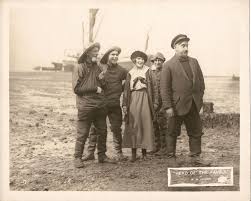 few screened occasionally but most largely forgotten. What could crowd funding achieve here? What about the H Manning-Haynes/Lydia Hayward adaptions of the stories of WW Jacobs (The Skippers Wooing, The Head of the Family, A Will and a Way, etc). I’ve yet to meet anyone who didn’t find these films a total delight on first viewing and long to see them again and to see more of the series. What a great box set they would make. Or what about the Stoll Company’s 1924 adaptions of P G Woodhouse stories (including The Clicking of
few screened occasionally but most largely forgotten. What could crowd funding achieve here? What about the H Manning-Haynes/Lydia Hayward adaptions of the stories of WW Jacobs (The Skippers Wooing, The Head of the Family, A Will and a Way, etc). I’ve yet to meet anyone who didn’t find these films a total delight on first viewing and long to see them again and to see more of the series. What a great box set they would make. Or what about the Stoll Company’s 1924 adaptions of P G Woodhouse stories (including The Clicking of  Cuthbert, Rodney Fails To Qualify and Chester Forgets Himself) which were such a hit when screened at the 2017 British Silent Film Festival. Another potentially delightful box set.
Cuthbert, Rodney Fails To Qualify and Chester Forgets Himself) which were such a hit when screened at the 2017 British Silent Film Festival. Another potentially delightful box set.
So what is holding us back. As the Lupino Lane Kickstarter has shown, its not for any lack of interest or money (with the level of subscribers and money raised being on a par with that achieved by Ben Model in the US). OK, so licensing might be an issue, but is it really insurmountable? Or is it because nobody has addressed the issue? Would a ‘subscribers only’ basis with no further retail sales address the issue? So is it just down to the dedication of people like Dave Glass and Dave Wyatt with their willingness to launch a project and see it through.
In writing this I’ll freely admit to having little more than the simple desire to see more silent film rarities reach a wider audience, with little practical insight into the potential difficulties to be overcome. But for those who do understand more of the processes involved, do you believe that crowd funding offers a way forward in Britain and, if so, how do we best go about it?
7 October
 A Rare Big Screen Outing For Napoleon How many of us have got a favourite silent film that we’d go almost to any length to see. You know, the one that gets an outing on the big screen all too infrequently, and then in some far distant venue. And how often do we
A Rare Big Screen Outing For Napoleon How many of us have got a favourite silent film that we’d go almost to any length to see. You know, the one that gets an outing on the big screen all too infrequently, and then in some far distant venue. And how often do we 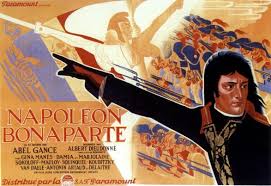 think ‘Why don’t I just arrange my own screening?’. And that’s usually about as far as that idea ever gets! But not Paul Strickland. Having travelled far and wide to catch rare screenings of his favourite, he’s now arranged a screening of his own. But his favourite isn’t just your run-of-the-mill 90 minute silent feature. No, his favourite is Abel Gance’s 1927 classic Napoleon, all five and a half hours of it and with that breathtaking triptych finale.
think ‘Why don’t I just arrange my own screening?’. And that’s usually about as far as that idea ever gets! But not Paul Strickland. Having travelled far and wide to catch rare screenings of his favourite, he’s now arranged a screening of his own. But his favourite isn’t just your run-of-the-mill 90 minute silent feature. No, his favourite is Abel Gance’s 1927 classic Napoleon, all five and a half hours of it and with that breathtaking triptych finale.
But clearly relishing a challenge Paul, along with the Valley Film Society, have successfully arranged for a  screening to take place at the Walwyn Hall in Lambourn, Berkshire on Sunday 24 November. The screening will be accompanied by the tremendous Carl Davis recorded score. Sadly there wasn’t room for a live orchestra but the DTS-HD 7.1 Surround Sound will ensure top notch audio. Additionally, three screen polyvision should do justice to the triptych finale. And all of this for the miserly sum of just £15, which also includes a complimentary supper during the film’s main interval.
screening to take place at the Walwyn Hall in Lambourn, Berkshire on Sunday 24 November. The screening will be accompanied by the tremendous Carl Davis recorded score. Sadly there wasn’t room for a live orchestra but the DTS-HD 7.1 Surround Sound will ensure top notch audio. Additionally, three screen polyvision should do justice to the triptych finale. And all of this for the miserly sum of just £15, which also includes a complimentary supper during the film’s main interval.
Further details of the screening are on our November listings page here. You can find out more by emailing direct to napoleon.walwyn@mail.com or book tickets at www.seaty.co.uk/napoleon. So, congratulations to Paul on arranging this ambitious screening. Lets hope its a big success. And if anyone else out there wants to do something similar for their own favourite, let us know and we’ll be happy to promote it.
17 September
A Silent Film Autumn To Look Forward To – Feeling a little blue now that the British Silent Film Festival has ended? Don’t think that there is much silent-film-wise coming up in the next few months? Well, how wrong could you be! Both the Kennington Bioscope and South West Silents  recently kicked off their Autumn programmes which means that there is a lot to look forward to in both London and Bristol. The Ken Bio’s next presentation is Ingeborg Holm(1913), an early social drama from Swedish director Victor Sjostrom. They then have an H G Wells adaption, Wheels of Chance (1922), a virtually unknown German silent Claire (1924), a bittersweet love story, King on Main Street (1925) with Adolphe Menjou and Bessie Love and
recently kicked off their Autumn programmes which means that there is a lot to look forward to in both London and Bristol. The Ken Bio’s next presentation is Ingeborg Holm(1913), an early social drama from Swedish director Victor Sjostrom. They then have an H G Wells adaption, Wheels of Chance (1922), a virtually unknown German silent Claire (1924), a bittersweet love story, King on Main Street (1925) with Adolphe Menjou and Bessie Love and  their season ends with one of the most lavish British films of the silent era in both budget and scope, Moulin Rouge (1928) directed by the great E A Dupont. And then of course there is their much anticipated DeMille Day, a whole day of films directed by Cecil B himself, including the wonderful Gloria Swanson (plus lion) in Male and Female (1919).
their season ends with one of the most lavish British films of the silent era in both budget and scope, Moulin Rouge (1928) directed by the great E A Dupont. And then of course there is their much anticipated DeMille Day, a whole day of films directed by Cecil B himself, including the wonderful Gloria Swanson (plus lion) in Male and Female (1919).
Meanwhile, down in Bristol, South West Silents goes from strength to strength with what must be their most ambitious season so far. They are presenting a series of Weimar classics on Sunday afternoons at the Watershed Cinema, including sensationalist silent drama Opium (1919), Abwege (1928) starring Teutonic ice maiden Brigitte Helm, a fine  example of that unusual German genre the Alpine drama, Der Kampf ums Matterhorn (1928) and a landmark of realist filmmaking Menschen am Sonntag (1930). There are new restorations of Der Golem (192o) at the Curzon Clevedon and The Man Who Laughs (1928) at Bristol Cathederal and director Julien Duvivier’s long-forgotten
example of that unusual German genre the Alpine drama, Der Kampf ums Matterhorn (1928) and a landmark of realist filmmaking Menschen am Sonntag (1930). There are new restorations of Der Golem (192o) at the Curzon Clevedon and The Man Who Laughs (1928) at Bristol Cathederal and director Julien Duvivier’s long-forgotten  masterpiece Au Bonheur des Dames (1930) also at the Watershed. Meanwhile, SWS’s free screenings at the Lansdown Public House continue with evenings devoted to the careers of IT girl Clara Bow and Czech star Anny Ondra. Coincidently, SWS’s Autumn season also concludes with a screening of Moulin Rouge (1928).
masterpiece Au Bonheur des Dames (1930) also at the Watershed. Meanwhile, SWS’s free screenings at the Lansdown Public House continue with evenings devoted to the careers of IT girl Clara Bow and Czech star Anny Ondra. Coincidently, SWS’s Autumn season also concludes with a screening of Moulin Rouge (1928).
Around he rest of the country, People on Sunday (1929) also screens in Sheffield along with Antarctic survival epic The Great White Silence (1924). Accompanists Minima are touring around the Midlands with The Lodger: A Story of the London Fog ( 1927) and around Cumbria with Nosferatu (1922) while Paul Robinson’s HarmonieBand get several opportunities to accompany Berlin: Symphony of a Great City (1927). Meanwhile, in Scotland accompanist David Allison begins a tour  with his acclaimed score for Rob Roy (1922).
with his acclaimed score for Rob Roy (1922).
Back in London, there are one or two Autumn disappointments. The BFI seems to have sadly reverted to their earlier habit of just a single silent film per month, giving us The Phantom of the Moulin Rouge in September and an illustratrd talk on the life of early film pioneer R W Paul in October. Surely they can do better than this. And a couple of  months ago we remarked upon the apparent demise of the Barbican as a silent film venue. While not yet quite dead, it certainly appears on life support with just a single film scheduled this Autumn, the almost completely unknown Alraune ( aka Unholy Love, Mandrake, or A Daughter of Destiny) (1928), an everyday story of artificial insemination, genetic engineering and test tube babies together with another starring role for the glacial Brigitte Helm, making it somewhat unmissable.
months ago we remarked upon the apparent demise of the Barbican as a silent film venue. While not yet quite dead, it certainly appears on life support with just a single film scheduled this Autumn, the almost completely unknown Alraune ( aka Unholy Love, Mandrake, or A Daughter of Destiny) (1928), an everyday story of artificial insemination, genetic engineering and test tube babies together with another starring role for the glacial Brigitte Helm, making it somewhat unmissable.
So, don’t despair, there is a lot coming your way silent-film-wise this Autumn. Full details for all of these events are of course in our regular monthly listings pages.
10 June
 End of the line for silent film at the Barbican? London’s Barbican Centre is a long established venue for the discerning silent film viewer. Programming has covered not just established classics but also many rarities, rediscoveries and recently restored prints,
End of the line for silent film at the Barbican? London’s Barbican Centre is a long established venue for the discerning silent film viewer. Programming has covered not just established classics but also many rarities, rediscoveries and recently restored prints, 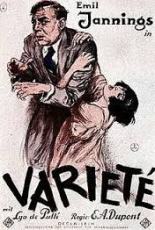 particularly from Europe and Asia.
particularly from Europe and Asia.
Highlights from last year included the beautifully restored Variety (Dir. E A Dupont, Ger, 1925), stylish Polish melodrama The Call Of The Sea (aka Zew Morza) (Dir. Henryk Szaro, Pol, 1927) silent film diva Asta Nielsen in The Suffragette (Dir. Urban Gad, Ger, 1913) the wistfully beautiful L’Hirondelle et la Mésange (Dir. Andre Antoine, Fr, 1920) and a mighty Czech epic St Wenceslas (Dir. Jan S Kolar, Cz, 1929).
Barbican screenings have also been notable for the quality of their musical accompaniment, from a diverse pool of hugely talented  musicians offering the broadest range of musical styles ranging from the more traditional to wildly avant-garde. The Barbican is noteworthy for being a high quality venue not just in terms of customer comfort but also for its superior projection and sound equipment and its
musicians offering the broadest range of musical styles ranging from the more traditional to wildly avant-garde. The Barbican is noteworthy for being a high quality venue not just in terms of customer comfort but also for its superior projection and sound equipment and its  always been reassuring to see that silent film screenings at the venue have attracted a respectably sized audience.
always been reassuring to see that silent film screenings at the venue have attracted a respectably sized audience.
However, since mid-2018 there has been a notable down shift in the number of silent film screenings at the Barbican. According to our listings, there were 15 silent screenings there in 2016, 20 in 2017 but just 11 in 2018. The downturn has continued into 2019 with just 4 screenings in the first half of the year and no further scheduled events. We can but hope that this current downturn is but a temporary glitch because to loose the Barbican as a venue for silent film would be a major blow to the silent film scene in London and beyond.
13 May
 Another Action Packed Weekend Beckons At The KenBio Barely has the mirth from their Silent Laughter Weekend died away than those good people at the Kennington Bioscope are busy preparing for their next two day spectacular. This will be their fifth annual Silent Film Weekend, due to take place on 1-2 June at the usual venue, the Cinema Museum in Lambeth.
Another Action Packed Weekend Beckons At The KenBio Barely has the mirth from their Silent Laughter Weekend died away than those good people at the Kennington Bioscope are busy preparing for their next two day spectacular. This will be their fifth annual Silent Film Weekend, due to take place on 1-2 June at the usual venue, the Cinema Museum in Lambeth.
As always with the KenBio, the emphasis will be on the rarities, the rarely screened and the occasional downright obscure elements of the silent film pantheon. Don’t expect to find here the likes of Caligari, Metropolis, Potemkin or The General. Sure, these films all have great merit but you can get to see them almost any time or any where. Instead, what the KenBio offers is an opportunity to broaden your silent film horizons, to see something you’ve likely never seen before and very probably leave you pleasantly surprised. And this year’s Silent  Film Weekend will be no exception, featuring a particularly strong programme of events.
Film Weekend will be no exception, featuring a particularly strong programme of events.
The highlight of Saturday’s programme, for me at least, will be Laila, a late Norwegian silent from 1929 written and directed by George Schnéevoigt (cameraman on several C T Dreyer films) and without doubt one of the highlights when screened at this year’s Hippodrome Festival of Silent Film (HippFest) Part romantic melodrama, part action-adventure and part ethnographic picture it focuses upon the pressures upon a young woman of Norwegian origin who was raised within the indigenous Sami community of northern Scandinavia. Featuring some wonderfully authentic performances from the mixed professional and amateur cast as well as some stunning action scenes filmed on location amidst Norway’s icy wilderness this is a film that really is unmissable. For just a sample of one of the superbly realised action scenes click here.
 Other likely must see screenings s on this first day include The Stone Rider (Der Steinerne Reiter (1923), a German fantasy-horror based upon an idea suggested by Metropolis script writer Thea van Harbou and starring that film’s male lead Rudolf Klein-Rogge. This
Other likely must see screenings s on this first day include The Stone Rider (Der Steinerne Reiter (1923), a German fantasy-horror based upon an idea suggested by Metropolis script writer Thea van Harbou and starring that film’s male lead Rudolf Klein-Rogge. This  screening also dovetails neatly in with the BFI’s ongoing Weimar Cinema season. Then there is another chance to sample the comedic talent of Marion Davis, this time in Beauty’s Worth (1922). There is more Hollywood comedy in the form of the Cruise of the Jasper B (1926) with Rod La Rocque before a change of pace and a helping of melodrama with The Price of Pleasure (1925) starring Virginia Valli and Norman Kerry,
screening also dovetails neatly in with the BFI’s ongoing Weimar Cinema season. Then there is another chance to sample the comedic talent of Marion Davis, this time in Beauty’s Worth (1922). There is more Hollywood comedy in the form of the Cruise of the Jasper B (1926) with Rod La Rocque before a change of pace and a helping of melodrama with The Price of Pleasure (1925) starring Virginia Valli and Norman Kerry,
 The ‘big ticket’ item on Sunday‘s programme is an appearance by heartthrob Rudolf Valentino in Monsieur Beaucaire (1924) strutting his stuff across 18th century England and France in the company of Bebe Daniels and Lois Wilson. I can’t help but think that this film should always be screened along side Stan Laurel’s Monsieur Don’t Care (1924), a glorious parody featuring ‘ Rhubarb Vaselino’. But, hey ho, you can’t have everything.
The ‘big ticket’ item on Sunday‘s programme is an appearance by heartthrob Rudolf Valentino in Monsieur Beaucaire (1924) strutting his stuff across 18th century England and France in the company of Bebe Daniels and Lois Wilson. I can’t help but think that this film should always be screened along side Stan Laurel’s Monsieur Don’t Care (1924), a glorious parody featuring ‘ Rhubarb Vaselino’. But, hey ho, you can’t have everything.
 Also of particular interest on Sunday is Souls For Sale ( 1923) starring Eleanor Boardman as a woman escaping her new husband who has murder in mind and finding herself in Hollywood where we are offered a behind the scenes look at the film making industry itself, with notable stars putting in an appearance including Charlie Chaplin and Erich von Stroheim. Then there is Charles Ray in The Old Swimmin’ Hole (1921), something of a slice of hillbilly hokum with not a lot going on but charming all the same
Also of particular interest on Sunday is Souls For Sale ( 1923) starring Eleanor Boardman as a woman escaping her new husband who has murder in mind and finding herself in Hollywood where we are offered a behind the scenes look at the film making industry itself, with notable stars putting in an appearance including Charlie Chaplin and Erich von Stroheim. Then there is Charles Ray in The Old Swimmin’ Hole (1921), something of a slice of hillbilly hokum with not a lot going on but charming all the same  and interesting as an early starring vehicle for Laura LaPlante and also as a film devoid of inter-titles. Then there is On To Reno (1928) and what sounds like a wild farce of mistaken and concealed identity. Lastly, a film I’m particularly looking forward to seeing, Common Ground (1916) a legal thriller with Thomas Meighan but but more notable as one of the few surviving films starring Marie Doro (right), by all accounts a hugely talented and stunningly attractive stage actress who quit the business when she got religion and ended her days a forgotten recluse.
and interesting as an early starring vehicle for Laura LaPlante and also as a film devoid of inter-titles. Then there is On To Reno (1928) and what sounds like a wild farce of mistaken and concealed identity. Lastly, a film I’m particularly looking forward to seeing, Common Ground (1916) a legal thriller with Thomas Meighan but but more notable as one of the few surviving films starring Marie Doro (right), by all accounts a hugely talented and stunningly attractive stage actress who quit the business when she got religion and ended her days a forgotten recluse.
And there we have it. What looks like another unmissible weekend from the KenBio. Tickets are on sale now here for the whole event or just one day or even just part of a day and full details of the programme are in our June listings page here. So, see you there !
4 April
 Silent Feast Or Famine At BFI There is something of a schizophrenic attitude towards silent film at the British Film Institute (BFI). Most of the time, silent films (which still account for a quarter of all cinema history) are just a small adjunct to the regular ‘proper’ film programming, rarely comprising more than a tiny proportion of BFI screenings. As a case in point, with something like 200 BFI film screenings each month, in January there were only seven silents shown, two in February, four in March and just one in April. Famine indeed. Yet in May we will move into feast territory at BFI with no less than 39 silent film events during the month.
Silent Feast Or Famine At BFI There is something of a schizophrenic attitude towards silent film at the British Film Institute (BFI). Most of the time, silent films (which still account for a quarter of all cinema history) are just a small adjunct to the regular ‘proper’ film programming, rarely comprising more than a tiny proportion of BFI screenings. As a case in point, with something like 200 BFI film screenings each month, in January there were only seven silents shown, two in February, four in March and just one in April. Famine indeed. Yet in May we will move into feast territory at BFI with no less than 39 silent film events during the month.
Accounting in large part for this very welcome package of cinematic goodies is the first half of  what looks like a pretty comprehensive retrospective of Weimar cinema. Starting right from the outset of the Republic there is outrageous comedy from Lubitsch, I Don’t Want To Be A Man (1918) and The Oyster Princess (1919). There is sensational drama with Opium (1919), old dark house melodrama with The Chronicles of the Grey House (1925) and an example of that
what looks like a pretty comprehensive retrospective of Weimar cinema. Starting right from the outset of the Republic there is outrageous comedy from Lubitsch, I Don’t Want To Be A Man (1918) and The Oyster Princess (1919). There is sensational drama with Opium (1919), old dark house melodrama with The Chronicles of the Grey House (1925) and an example of that 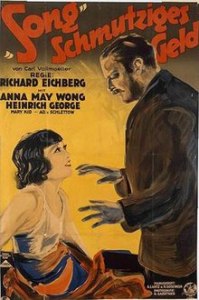 unique Weimar genre, the alpine drama, with The Fight For The Matterhorn (1928). Then there is the added delight of Pola Negri in Madame Dubarry (1919) not to mention Anna May Wong in Song (1928). Less obscure but still most welcome are Variety (1925), Waxworks (1924) and The Last Laugh (1924). Most of these films rarely get a screening and nearly all come with live musical accompaniment. As a result,
unique Weimar genre, the alpine drama, with The Fight For The Matterhorn (1928). Then there is the added delight of Pola Negri in Madame Dubarry (1919) not to mention Anna May Wong in Song (1928). Less obscure but still most welcome are Variety (1925), Waxworks (1924) and The Last Laugh (1924). Most of these films rarely get a screening and nearly all come with live musical accompaniment. As a result,  we can forgive BFI for a bit of padding out in the season by including some excellent but oh so regularly screened Weimar classics such as Caligari (1920), Nosferatu (1922) and The Golem (1920), mainly with just their recorded scores.
we can forgive BFI for a bit of padding out in the season by including some excellent but oh so regularly screened Weimar classics such as Caligari (1920), Nosferatu (1922) and The Golem (1920), mainly with just their recorded scores.
But Weimar is not just the only silent delight in May. The BFI is also putting on a weekend of Victorian cinema. Pride of place goes to a second screening of The Great Victorian Moving Picture Show, a compilation of 60mm and 68mm films from the Victorian era, presented by  the BFI’s Bryony Dixon, with John Sweeney and his Biograph Band – reprising their spectacular sell-out event at the 2018 London Film Festival. But there is
the BFI’s Bryony Dixon, with John Sweeney and his Biograph Band – reprising their spectacular sell-out event at the 2018 London Film Festival. But there is  also an experts forum, Heroes of Victorian Film, who will champion the British Victorian era filmmaker they think deserves to be better known throughout the land, not to mention a collection of London focused films, Six Stories About London in Victorian Film.
also an experts forum, Heroes of Victorian Film, who will champion the British Victorian era filmmaker they think deserves to be better known throughout the land, not to mention a collection of London focused films, Six Stories About London in Victorian Film.
So, all in all, May is a great month for silent film at BFI. Tis only a pity it doesn’t happen every month. Details of all of these screenings can be found in the ‘May Listings‘ page of silentfilmcalendar.org.
18 March
 Rare Michael Curtiz Silent Film Screening in SW7 Director Michael Curtiz (image, right) was certainly one of the most prolific and probably also one of the most accomplished directors to have worked in Hollywood. Able to turn his hand to almost any genre, his most recognised film is probably Casablanca (1942, image, left) for which he won one of his two Academy Awards. But other classic examples of his
Rare Michael Curtiz Silent Film Screening in SW7 Director Michael Curtiz (image, right) was certainly one of the most prolific and probably also one of the most accomplished directors to have worked in Hollywood. Able to turn his hand to almost any genre, his most recognised film is probably Casablanca (1942, image, left) for which he won one of his two Academy Awards. But other classic examples of his 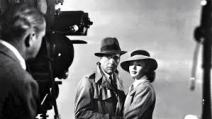 work include The Adventures of Robin Hood (1938) with Errol Flynn, Angels With Dirty Faces (1938) and Yankee Doodle Dandy (1942) with Jimmy Cagney, Mildred Pierce (1945) with Joan Crawford, and White Christmas (1954) with Bing Crosby. He even made a film with Elvis Presley, King Creole (1958). But before he took up Warner Brothers’ invitation to travel to Hollywood, Curtiz (then known as Mihaly Kertesz) was an equally prolific director in Europe, making over sixty films in Hungary, Denmark, Germany and Austria. However, this early work is
work include The Adventures of Robin Hood (1938) with Errol Flynn, Angels With Dirty Faces (1938) and Yankee Doodle Dandy (1942) with Jimmy Cagney, Mildred Pierce (1945) with Joan Crawford, and White Christmas (1954) with Bing Crosby. He even made a film with Elvis Presley, King Creole (1958). But before he took up Warner Brothers’ invitation to travel to Hollywood, Curtiz (then known as Mihaly Kertesz) was an equally prolific director in Europe, making over sixty films in Hungary, Denmark, Germany and Austria. However, this early work is 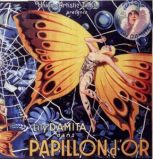 much less widely known and very rarely screened. The good people at Kennington Bioscope are doing their best to put this situation right, screening two Curtiz films last year, Cab No.13
much less widely known and very rarely screened. The good people at Kennington Bioscope are doing their best to put this situation right, screening two Curtiz films last year, Cab No.13 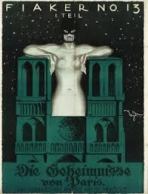 (Fiaker Nr. 13) and The Golden Butterfly ( Der Goldene Schmetterling), both made in 1926 and both starring Curtiz’s then wife, Lila Damita.
(Fiaker Nr. 13) and The Golden Butterfly ( Der Goldene Schmetterling), both made in 1926 and both starring Curtiz’s then wife, Lila Damita.
But there is now a chance to catch a rare screening of another Curtiz silent, one which can genuinely claim to rival not only earlier Italian blockbusters such as Quo Vadis (1913) or Cabiria (1914) but also the work of Griffith and DeMille in Hollywood. The film is Sodom and Gomorrah: The Legend of Sin and Punishment (1922). Regarded as the grandest, most monumental film of the  Austrian silent film era some estimates number the cast and crew as high as 14,000 people and a main set towering 230 feet high. Then there was the pyrotechnician, missing fingers from both hands and part of his nose due to earlier accidents, but who still handled explosives with an air of casualness….and with a lighted cigar in his mouth. In charge of all this, director Curtiz apparently had little regard
Austrian silent film era some estimates number the cast and crew as high as 14,000 people and a main set towering 230 feet high. Then there was the pyrotechnician, missing fingers from both hands and part of his nose due to earlier accidents, but who still handled explosives with an air of casualness….and with a lighted cigar in his mouth. In charge of all this, director Curtiz apparently had little regard  for the money he was spending or the well being of cast and crew, not to mention being in the process of divorcing his first wife, Lucie Doraine, who was also the star of the film. The end result was a three hour monster, eventually cut down as a result of marketing and censorship pressures to little more than 90 minutes. Long thought to have survived in
for the money he was spending or the well being of cast and crew, not to mention being in the process of divorcing his first wife, Lucie Doraine, who was also the star of the film. The end result was a three hour monster, eventually cut down as a result of marketing and censorship pressures to little more than 90 minutes. Long thought to have survived in  just fragments, a recently restored version of the film now runs to around 140 minutes.
just fragments, a recently restored version of the film now runs to around 140 minutes.
And it will be screened on 2 April at the Austrian Cultural Forum in Knightsbridge in London. This, along with other recent screenings, is helping to establish the Forum as an increasingly important (albeit  little known) venue for Austrian themed silent film screenings with live musical accompaniment. Last year, for example, they screened a trio of von Stroheim classics, Blind Husbands (1919), Foolish Wives (1922).and Queen Kelly (1929), while this year they have already screened G W Pabst’s superlative Joyless Street (1925) and further silent screenings are promised.
little known) venue for Austrian themed silent film screenings with live musical accompaniment. Last year, for example, they screened a trio of von Stroheim classics, Blind Husbands (1919), Foolish Wives (1922).and Queen Kelly (1929), while this year they have already screened G W Pabst’s superlative Joyless Street (1925) and further silent screenings are promised.
Full details of this screening of Sodom and Gomorrah are on Silentfimcalendar.org‘s ‘April Listings’ page and watch out for details of further silent film screenings at the Austrian Cultural Forum.
8 February
Silent Film Festival Frenzy Nationwide There are an awful lot of silent films cropping up in various film festivals across the UK over the next couple of months so if you fancy getting out ‘on the road’, read on for details of some quite exceptional films around the country.
 Early March sees the return of the annual Borderlines Film Festival in the Herefordshire area. This year they are working with the ever more ambitious
Early March sees the return of the annual Borderlines Film Festival in the Herefordshire area. This year they are working with the ever more ambitious  South West Silents team to screen a couple of films from the long underrated director Lois Weber, The Blot (1921) and Suspense (1913). Silent London’s Pamela Hutchinson will be along to introduce the films and talk about Weber’s influence on film development while live musical accompaniment for the films will come from the excellent Lillian Henley . There will also be a rare screening of the long-thought-
South West Silents team to screen a couple of films from the long underrated director Lois Weber, The Blot (1921) and Suspense (1913). Silent London’s Pamela Hutchinson will be along to introduce the films and talk about Weber’s influence on film development while live musical accompaniment for the films will come from the excellent Lillian Henley . There will also be a rare screening of the long-thought- lost 1924 version of Oliver Twist, starring ‘man of a thousand faces’ Lon Chaney as Fagin and, fresh from his role in Chaplin’s The Kid, Jackie Coogan as Oliver. Live piano accompaniment for this film comes from Meg Morley.
lost 1924 version of Oliver Twist, starring ‘man of a thousand faces’ Lon Chaney as Fagin and, fresh from his role in Chaplin’s The Kid, Jackie Coogan as Oliver. Live piano accompaniment for this film comes from Meg Morley.
 Then in late March comes the Hippodrome Silent Film Festival (HippFest) in Bo’Ness, Scotland’s only festival of silent film, and this year they have a particularly strong programme. Particular personal highlights we’re looking forward to include the wonderful Pola Hegri in Lubitsch’s Forbidden Paradise (1924), the
Then in late March comes the Hippodrome Silent Film Festival (HippFest) in Bo’Ness, Scotland’s only festival of silent film, and this year they have a particularly strong programme. Particular personal highlights we’re looking forward to include the wonderful Pola Hegri in Lubitsch’s Forbidden Paradise (1924), the  oldest surviving Chinese martial arts film The Red Heroine (1929), a rare foray into comedy for Swedish director C T Dreyer with The Parson’s Widow (1920) and E A Dupont’s early take on Moulin Rouge (1928). Bringing a touch of ‘local’ interest, the programme opens with an early version of the story of
oldest surviving Chinese martial arts film The Red Heroine (1929), a rare foray into comedy for Swedish director C T Dreyer with The Parson’s Widow (1920) and E A Dupont’s early take on Moulin Rouge (1928). Bringing a touch of ‘local’ interest, the programme opens with an early version of the story of 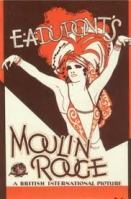 Scottish outlaw Rob Roy (1922). There are also some old favourites such as Maurice Elvey’s delightful Hindle Wakes (1927) and Laura La Plante in some scary goings on with The Cat and the Canary (1927). As always with HippFest, there will be a stellar cast of silent film musicians on hand to accompany all of the screenings.
Scottish outlaw Rob Roy (1922). There are also some old favourites such as Maurice Elvey’s delightful Hindle Wakes (1927) and Laura La Plante in some scary goings on with The Cat and the Canary (1927). As always with HippFest, there will be a stellar cast of silent film musicians on hand to accompany all of the screenings.
Just south of the border at around the same time the Tyne Valley Film Festival kicks off centered around Hexham in Northumberland. Amongst the silent film offerings are a collection of shorts from the irrepressible  Mabel Normand, another example of the directorial skills of Lois Weber in Shoes (1916), again introduced by Pam Hutchinson, and the moving story of an old soldier and his equally old war horse in A Couple of Down and Outs (1923). There also looks to be a fascinating film compendium looking at the earliest known representations of LGBT people on screen….with clips going back as far as 1904!
Mabel Normand, another example of the directorial skills of Lois Weber in Shoes (1916), again introduced by Pam Hutchinson, and the moving story of an old soldier and his equally old war horse in A Couple of Down and Outs (1923). There also looks to be a fascinating film compendium looking at the earliest known representations of LGBT people on screen….with clips going back as far as 1904!
 Then in April, back in London we have the Kennington Bioscope’s annual Silent Comedy Weekend to look forward. Although details have yet to be released you can be sure this will be two days packed with cinematic rarities and delights. And if that wasn’t enough to be getting on with, just two months later the same people will be hosting The Kennington Bioscope 5th Silent Film Weekend.
Then in April, back in London we have the Kennington Bioscope’s annual Silent Comedy Weekend to look forward. Although details have yet to be released you can be sure this will be two days packed with cinematic rarities and delights. And if that wasn’t enough to be getting on with, just two months later the same people will be hosting The Kennington Bioscope 5th Silent Film Weekend.
So surely all of this is reason enough to ‘get on yer bike’ and get around the country to catch up with some of these silent film treasures.
Full details of all of these screenings are of course in the monthly listing pages of Silentfilmcalendar.org.
20 January
 A Silent Film Mess At The BFI The BFI’s relationship with silent film has, in recent years, been somewhat schizophrenic to say the least. On the one hand, they have been willing to screen some films multiple times in order to promote their own Blu-ray/DVD release of these titles. Last year, for example, Pandora’s Box (1929) and Shiraz (1928) each had 30+ screenings to push new releases of both films. Perhaps not
A Silent Film Mess At The BFI The BFI’s relationship with silent film has, in recent years, been somewhat schizophrenic to say the least. On the one hand, they have been willing to screen some films multiple times in order to promote their own Blu-ray/DVD release of these titles. Last year, for example, Pandora’s Box (1929) and Shiraz (1928) each had 30+ screenings to push new releases of both films. Perhaps not  surprisingly, after an initial spark of interest, many of these multiple screenings appeared to be very poorly attended. Yet at other times, silents are viewed by the BFI as little more than programme gap-fillers, with a few well-worn mainstream titles (Metropolis, Sunrise, Phantom, Potemkin etc) wheeled out time and again, often with just the recorded soundtrack rather than with the infinitely superior pleasure of live accompaniment.
surprisingly, after an initial spark of interest, many of these multiple screenings appeared to be very poorly attended. Yet at other times, silents are viewed by the BFI as little more than programme gap-fillers, with a few well-worn mainstream titles (Metropolis, Sunrise, Phantom, Potemkin etc) wheeled out time and again, often with just the recorded soundtrack rather than with the infinitely superior pleasure of live accompaniment.
In early 2018 there was a glimmer of hope when a regular Sunday afternoon slot was set aside for less well known silents. It may only have been one film a month and not, perhaps, the most convenient time slot but we could at least get to enjoy some silent rarities such as Blighty (1927), Adjutant of the Czar (1929), Mothers of Men (1917) and The Woman Under Oath (1919) as well as rarely screened classics such as The Racket (1928). But here again there was still an element of ‘gap-filling’ with an episode of David Brownlow’s Hollywood series one month (OK, it is a great series, and not available on disc, but it can be viewed any time, albeit illicitly, on-line) and a somewhat tired collection of early silent female comedy double acts. When 2019 opened with a Sunday screening of A Modern Dubarry (1927) it looked like this regular programming slot would continue into the new year. However, the absence of a Sunday silent in February does not bode well!!
(1927), Adjutant of the Czar (1929), Mothers of Men (1917) and The Woman Under Oath (1919) as well as rarely screened classics such as The Racket (1928). But here again there was still an element of ‘gap-filling’ with an episode of David Brownlow’s Hollywood series one month (OK, it is a great series, and not available on disc, but it can be viewed any time, albeit illicitly, on-line) and a somewhat tired collection of early silent female comedy double acts. When 2019 opened with a Sunday screening of A Modern Dubarry (1927) it looked like this regular programming slot would continue into the new year. However, the absence of a Sunday silent in February does not bode well!!
Yet just as you are about to give up on the BFI when it comes to silent film screenings, they  come up with a gem. On 7 February, to open a series on early Korean cinema they are screening Crossroads Of Youth (Dir. Ahn Jong-hwa, Korea, 1934) the oldest surviving Korean-made film and a tale of love, desire, betrayal and revenge following a young man as he seeks his fortune on the streets of Seoul. Even more enticingly they are screening the film with live accompaniment from Korean musicians, live ‘byeonsa’ narration and live supplementary actors in a recreation of how the film would have been screened when it first premiered in 1934.
come up with a gem. On 7 February, to open a series on early Korean cinema they are screening Crossroads Of Youth (Dir. Ahn Jong-hwa, Korea, 1934) the oldest surviving Korean-made film and a tale of love, desire, betrayal and revenge following a young man as he seeks his fortune on the streets of Seoul. Even more enticingly they are screening the film with live accompaniment from Korean musicians, live ‘byeonsa’ narration and live supplementary actors in a recreation of how the film would have been screened when it first premiered in 1934.
However, unless you’ve booked already, you won’t be able to see any of this. Because, in another example of the BFI’s somewhat less than consummate programming skill, this unique and hugely tempting event is being screened in the smallest of their three main auditoriums and is already completely sold out!! Was no consideration given to the possibility that this event could, shock horror, prove quite popular and merit a screening at the BFI’s large auditorium. And what of the two events screening that same evening in the large auditorium? The first, admittedly quite well booked, is something on an anomaly for a venue calling itself the British FILM Institute because it isn’t a film at all, its the first two episodes of a new TV series which are due to screen shortly on Netflix so its not as if it won’t get a wider audience in due course. The second is a screening of Antonioni’s Blow Up (1966) which, if we’re being honest, is probably the most regularly wheeled out of his films and which is also getting two other screenings at BFI in the month. But the end result is that Crossroads of Youth, probably a unique, never to be repeated, event has sold out a 130 seat venue presumably leaving many others disappointed at being unable to see it, while on the same night the BFI’s 500 seat venue is being used for a couple of episodes of a TV series that everyone will get to see eventually and for a well known and regularly screened feature which has, to date, sold barely 50 of the 500 seats in this auditorium!!
10 January
 Forthcoming Attractions at the KenBio The Kennington Bioscope’s 2019 silent film season kicked off last week. A pleasingly full house at the venerable Cinema Museum (itself looking increasingly free from the threat of closure) got to see Douglas Fairbanks swash, buckle and mug his way through a couple of great roles as only he could. OK, the films weren’t exactly as billed but it didn’t really matter when both proved so eminently
Forthcoming Attractions at the KenBio The Kennington Bioscope’s 2019 silent film season kicked off last week. A pleasingly full house at the venerable Cinema Museum (itself looking increasingly free from the threat of closure) got to see Douglas Fairbanks swash, buckle and mug his way through a couple of great roles as only he could. OK, the films weren’t exactly as billed but it didn’t really matter when both proved so eminently  enjoyable. And there are a lot more delights to come as the KenBio’s new season rolls out. Next up is Mother, Soviet director Pudovkin’s epic 1926 drama set against the backdrop of the 1905 Russian revolution with Vera Baranovskaya as the increasingly politicised mother of the title. On a lighter note, February sees the screening of the virtually unknown Czech slapstick comedy The Lovers of an Old Criminal (Dir. Svatopluk Innemann, Cz, 1927) starring Anny Ondra (left), perhaps better known for her
enjoyable. And there are a lot more delights to come as the KenBio’s new season rolls out. Next up is Mother, Soviet director Pudovkin’s epic 1926 drama set against the backdrop of the 1905 Russian revolution with Vera Baranovskaya as the increasingly politicised mother of the title. On a lighter note, February sees the screening of the virtually unknown Czech slapstick comedy The Lovers of an Old Criminal (Dir. Svatopluk Innemann, Cz, 1927) starring Anny Ondra (left), perhaps better known for her 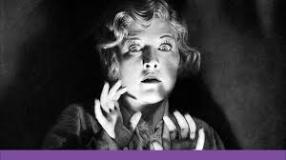 appearances in early Hitchcock dramas such as Blackmail and The Manxman (both 1929). The comedy continues into March, albeit tinged with horror, with The Cat and the Canary (Dir. Paul Leni, US, 1927), a film which virtually invented the ‘old dark house’ horror genre. Starring Laura La Plante (right), the film was remade in 1939 with Bob Hope in the lead role, but this is the version which has best stood the test of time.
appearances in early Hitchcock dramas such as Blackmail and The Manxman (both 1929). The comedy continues into March, albeit tinged with horror, with The Cat and the Canary (Dir. Paul Leni, US, 1927), a film which virtually invented the ‘old dark house’ horror genre. Starring Laura La Plante (right), the film was remade in 1939 with Bob Hope in the lead role, but this is the version which has best stood the test of time.
 April sees another evening of 9.5mm vitagraph films (edited versions of cinema releases aimed at the home market) from the collection of acclaimed film historian Kevin Brownlow. May brings Hungarian Rhapsody (Dir. Hanns Schwarz, Ger, 1928) a romantic comedy set in 19th century Hungary starring Lil Dagovar and apparently with something of the Lubitsch touch about it. Also in May comes City Girl (Dir. F W Murnau, US,
April sees another evening of 9.5mm vitagraph films (edited versions of cinema releases aimed at the home market) from the collection of acclaimed film historian Kevin Brownlow. May brings Hungarian Rhapsody (Dir. Hanns Schwarz, Ger, 1928) a romantic comedy set in 19th century Hungary starring Lil Dagovar and apparently with something of the Lubitsch touch about it. Also in May comes City Girl (Dir. F W Murnau, US, 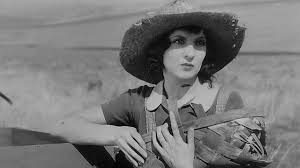 1930). Less well known than the same director’s Sunrise (1927) but an equally beautiful film which was in many ways an inspiration for Terrence Malick’s Days of Heaven (1978). Lastly, in June we have Lady Windermere’s Fan (Dir. Ernst Lubitsch, US, 1925), an actual Lubitsch plus Ronald Colman in one of his first important screen roles in this early adaption of one of Oscar Wilde’s classics.
1930). Less well known than the same director’s Sunrise (1927) but an equally beautiful film which was in many ways an inspiration for Terrence Malick’s Days of Heaven (1978). Lastly, in June we have Lady Windermere’s Fan (Dir. Ernst Lubitsch, US, 1925), an actual Lubitsch plus Ronald Colman in one of his first important screen roles in this early adaption of one of Oscar Wilde’s classics.
So, all in all, just what you’d expect from the KenBio, a varied mix of high quality films and not one that you’d want to miss! Details of all of these screenings are available on the pages of silentfilmcalendar.org.
5 December
 Silent Film Delights For The New Year in Bristol With silent film screenings winding down as year-end approaches, it seems an appropriate time to cheer ourselves up by having a look at what delights are on the horizon in the new year. And in early 2019 the focus certainly appears to be on Bristol. January is of course Slapstick Festival time in the city and as usual there is a varied
Silent Film Delights For The New Year in Bristol With silent film screenings winding down as year-end approaches, it seems an appropriate time to cheer ourselves up by having a look at what delights are on the horizon in the new year. And in early 2019 the focus certainly appears to be on Bristol. January is of course Slapstick Festival time in the city and as usual there is a varied  selection of silent films. Classic slapstick comes in the form of Buster Keaton in The Battling Butler (Dir. Buster Keaton, US, 1926), Charlie Chaplin in The Pilgrim (Dir. Charles Chaplin, US, 1923) and Harold Lloyd in For Heaven’s Sake (Dir. sam Taylor, US, 1926). The festival also looks at the careers of Chaplin’s older
selection of silent films. Classic slapstick comes in the form of Buster Keaton in The Battling Butler (Dir. Buster Keaton, US, 1926), Charlie Chaplin in The Pilgrim (Dir. Charles Chaplin, US, 1923) and Harold Lloyd in For Heaven’s Sake (Dir. sam Taylor, US, 1926). The festival also looks at the careers of Chaplin’s older  brother Sydney, a star in his own right, and comedienne Alice Howell (image, right), once hailed by Noel Coward as ‘the funniest woman of our civilisation’ but now almost completely forgotten.
brother Sydney, a star in his own right, and comedienne Alice Howell (image, right), once hailed by Noel Coward as ‘the funniest woman of our civilisation’ but now almost completely forgotten.
Looking beyond Hollywood, and changing the pace somewhat, there is the  gentle French classic Les Deux Timides (Dir. Rene Clair, Fr, 1928). Also from France, will the mystery be solved of who played the female star of a string of long forgotten comedies featuring a main character called Cunégonde. There is even a rare example of Russian slapstick with Happiness (Dir. Aleksandr
gentle French classic Les Deux Timides (Dir. Rene Clair, Fr, 1928). Also from France, will the mystery be solved of who played the female star of a string of long forgotten comedies featuring a main character called Cunégonde. There is even a rare example of Russian slapstick with Happiness (Dir. Aleksandr  Medvedkin, USSR, 1935)which apparently prompted none other than Sergei Eisenstein to the admiring tribute: ‘Today I saw how a Bolshevik laughs.’. Other screenings focus on Chaplin for kids, early silent animation and a look a some recently rediscovered gems. Introducing various sessions will be acclaimed film historians David Robinson and Kevin Brownlow, TV presenter Chris Serle, standup comedian and writer Lucy Porter and Curator of Amsterdam’s EYE Filmmuseum, Elif Rongen-Kaynakçi while all of the screenings will be accompanied live by some of Europe’s top silent film accompanists.
Medvedkin, USSR, 1935)which apparently prompted none other than Sergei Eisenstein to the admiring tribute: ‘Today I saw how a Bolshevik laughs.’. Other screenings focus on Chaplin for kids, early silent animation and a look a some recently rediscovered gems. Introducing various sessions will be acclaimed film historians David Robinson and Kevin Brownlow, TV presenter Chris Serle, standup comedian and writer Lucy Porter and Curator of Amsterdam’s EYE Filmmuseum, Elif Rongen-Kaynakçi while all of the screenings will be accompanied live by some of Europe’s top silent film accompanists.
 But looking beyond the Slapstick Festival, those industrious types at South West Silents have lined up some top notch screenings. These kick off in January with Valentino classic The Sheik (Dir. George Melford, US, 1921), the film that secured his place as one of the first
But looking beyond the Slapstick Festival, those industrious types at South West Silents have lined up some top notch screenings. These kick off in January with Valentino classic The Sheik (Dir. George Melford, US, 1921), the film that secured his place as one of the first  iconic Hollywood legends. February brings The Beloved Rogue (Dir. Alan Crosland, US, 1927) in which Hollywood star John Barrymore sought to out-swash buckle Douglas Fairbanks in this star studded action packed roller coaster which perfectly captures the true greatness of Hollywood in the silent era. Then in March there is a rare screening of the recently restored German drama The Ancient
iconic Hollywood legends. February brings The Beloved Rogue (Dir. Alan Crosland, US, 1927) in which Hollywood star John Barrymore sought to out-swash buckle Douglas Fairbanks in this star studded action packed roller coaster which perfectly captures the true greatness of Hollywood in the silent era. Then in March there is a rare screening of the recently restored German drama The Ancient  Law (aka Das Alte Gesetz) (Dir. E A Dupont, Ger, 1923)following a son’s efforts to pursue his dream of becoming an actor in the face of opposition from his father, an orthodox rabbi. All three films will be screened at Bristol’s Cube Cinema, all with live musical accompaniment.
Law (aka Das Alte Gesetz) (Dir. E A Dupont, Ger, 1923)following a son’s efforts to pursue his dream of becoming an actor in the face of opposition from his father, an orthodox rabbi. All three films will be screened at Bristol’s Cube Cinema, all with live musical accompaniment.
4 December
Whose Film Is It Anyway In our December listings (Here) you’ll find details of a short tour of Scottish venues by composer and musician Graham Stephen accompanying a screening of  American silent film The Penalty (Dir. Wallace Worsley, US, 1920) with a score commissioned by the Hippodrome Silent Film Festival. The score was first performed at HippFest in March to generally warm approval. While the film itself, the story of a legless master criminal and gang leader, may not exactly qualify as a classic of the silent film era it does feature a bravura performance by Lon Chaney as the aforementioned limbless villain. So far so good and its always
American silent film The Penalty (Dir. Wallace Worsley, US, 1920) with a score commissioned by the Hippodrome Silent Film Festival. The score was first performed at HippFest in March to generally warm approval. While the film itself, the story of a legless master criminal and gang leader, may not exactly qualify as a classic of the silent film era it does feature a bravura performance by Lon Chaney as the aforementioned limbless villain. So far so good and its always  encouraging to see a relatively less well-known silent getting a little more exposure.
encouraging to see a relatively less well-known silent getting a little more exposure.
But what really caught our eye was the publicity material for the 1st December screening at the Queen’s Hall in Edinburgh (shown here). Here, the film is described as “Graham Stephen’s The Penalty”! But in what way can this claim of ‘ownership’ be justified. Certainly no one would doubt the potential benefit an accompanist brings to a silent film and we’ve seen any number of films improved, often quite dramatically, by good accompaniment. But no matter how good the accompaniment, the star of the show,  metaphorically speaking, remains the film itself. To ignore this convention in effect sees the film itself being relegated to a mere backdrop for the accompanist’s music. Perhaps one of the worst examples of this was the butchery of Fritz Lang’s Metropolis in the 1980s to fit Giorgio Moroder’s cacophonous electronic score which
metaphorically speaking, remains the film itself. To ignore this convention in effect sees the film itself being relegated to a mere backdrop for the accompanist’s music. Perhaps one of the worst examples of this was the butchery of Fritz Lang’s Metropolis in the 1980s to fit Giorgio Moroder’s cacophonous electronic score which  all but drowned out the film’s visuals. But similar instances of ‘the tail wagging the dog’ when it comes to silent film accompaniment persist. This year we have been to live screenings of Fantomas (Dir. Louis Feuillade, Fr, 1913-14) where the accompanists opted to screen the film without English translations of the French inter-titles and of Salome (Dir. Charles Bryant, US, 1923) where the accompanists dispensed with the film’s inter-titles
all but drowned out the film’s visuals. But similar instances of ‘the tail wagging the dog’ when it comes to silent film accompaniment persist. This year we have been to live screenings of Fantomas (Dir. Louis Feuillade, Fr, 1913-14) where the accompanists opted to screen the film without English translations of the French inter-titles and of Salome (Dir. Charles Bryant, US, 1923) where the accompanists dispensed with the film’s inter-titles  altogether! In both of these screenings, the musicians appeared to take the view that knowing what was going on in the film was unnecessary because it was little more than background to the music.
altogether! In both of these screenings, the musicians appeared to take the view that knowing what was going on in the film was unnecessary because it was little more than background to the music.
Now, having seen the HippFest screening of The Penalty with Graham Stephen’s score there was no indication that he was in any  way seeking to understate the significance of the film in comparison to the music. In fact, his score clearly set out to be a sympathetic and complementary accompaniment the film. Additionally, amongst the publicity material for his accompaniment to the film at the various other venues this month there is no sign of it being headlined elsewhere as “Graham Stephen’s The Penalty”. So perhaps this is all down to an over-zealous PR department at the Queen’s Theatre. Because if The Penalty is anybody’s film then it is either director Wallace Worsley’s or star Lon Chaney’s.
way seeking to understate the significance of the film in comparison to the music. In fact, his score clearly set out to be a sympathetic and complementary accompaniment the film. Additionally, amongst the publicity material for his accompaniment to the film at the various other venues this month there is no sign of it being headlined elsewhere as “Graham Stephen’s The Penalty”. So perhaps this is all down to an over-zealous PR department at the Queen’s Theatre. Because if The Penalty is anybody’s film then it is either director Wallace Worsley’s or star Lon Chaney’s.
4 September
 KenBio Pulling Out All The Stops This Autumn Its now less than a week until the 4th annual Kennington Bioscope Silent Film Weekend kicks off (8-9th Sept) at the historic Cinema Museum in Lambeth. The weekend promises a veritable cinematic smorgasbord of little known or rarely screened silent film delights, with something to meet all tastes. Amongst the many rare screenings, we are looking forward to seeing Lili Damita in Micheal Curtiz’s last European film before he departed for Hollywood, The Golden Butterfly (1926). Then there is the now almost forgotten Constance
KenBio Pulling Out All The Stops This Autumn Its now less than a week until the 4th annual Kennington Bioscope Silent Film Weekend kicks off (8-9th Sept) at the historic Cinema Museum in Lambeth. The weekend promises a veritable cinematic smorgasbord of little known or rarely screened silent film delights, with something to meet all tastes. Amongst the many rare screenings, we are looking forward to seeing Lili Damita in Micheal Curtiz’s last European film before he departed for Hollywood, The Golden Butterfly (1926). Then there is the now almost forgotten Constance  Talmadge in a delicious comedy, Her Night of Romance (D. Sidney Franklin, 1924). Other rarities we’re interested in seeing for the first time include social melodrama The Garden of Resurrection (Dir. Arthur Rooke, UK, 1919) and small town drama Miss Lulu Bett (Dir. William C De Mille, US, 1921). But our own particular ‘must see’ has to be the BFI’s Bryony Dixon, presenting a collection of silent British comedies, because amongst these is Sam’s
Talmadge in a delicious comedy, Her Night of Romance (D. Sidney Franklin, 1924). Other rarities we’re interested in seeing for the first time include social melodrama The Garden of Resurrection (Dir. Arthur Rooke, UK, 1919) and small town drama Miss Lulu Bett (Dir. William C De Mille, US, 1921). But our own particular ‘must see’ has to be the BFI’s Bryony Dixon, presenting a collection of silent British comedies, because amongst these is Sam’s 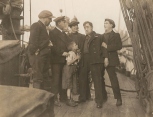 Boy (1922), another in the delightful series of films directed by W Manning Haynes, scripted by Lydia Hayward and based upon the stories of W W Jacobs. If you’ve seen The Head of the Family (1922), A Will and a Way (1922) or The Skipper’s Wooing (1922) from the same series you’ll know just what we mean. If you haven’t, then you are in for a treat.
Boy (1922), another in the delightful series of films directed by W Manning Haynes, scripted by Lydia Hayward and based upon the stories of W W Jacobs. If you’ve seen The Head of the Family (1922), A Will and a Way (1922) or The Skipper’s Wooing (1922) from the same series you’ll know just what we mean. If you haven’t, then you are in for a treat.
But there is so much more going on at KenBio than just the weekend festival. Their newly announced Autumn programme includes some knock-out screenings. First off is Au Bonheur  des Dames (Dir. Julien Duvivier, Fr, 1930). At an earlier event renowned cinema historian Kevin Brownlow showed just a brief clip of this film which left the audience stunned. But now he’s back with the complete film, to enjoy in all its Parisian glory. Plus, the live musical accompaniment is from Stephen Horne which makes it wholly
des Dames (Dir. Julien Duvivier, Fr, 1930). At an earlier event renowned cinema historian Kevin Brownlow showed just a brief clip of this film which left the audience stunned. But now he’s back with the complete film, to enjoy in all its Parisian glory. Plus, the live musical accompaniment is from Stephen Horne which makes it wholly  unmissable. Next up is The Lost World (Dir. Harry Hoyt, US, 1925). Perhaps a little ‘main stream’ for the KenBio but its a newly restored and more complete version, so probably worth a look. Then there is another evening of 9.5mm delights from the personal archive of Kevin Brownlow, edited versions of silent cinema releases aimed at the home market, which in some cases are now the only versions that survive. Expect a fascinating collection of the weird and the wonderful.
unmissable. Next up is The Lost World (Dir. Harry Hoyt, US, 1925). Perhaps a little ‘main stream’ for the KenBio but its a newly restored and more complete version, so probably worth a look. Then there is another evening of 9.5mm delights from the personal archive of Kevin Brownlow, edited versions of silent cinema releases aimed at the home market, which in some cases are now the only versions that survive. Expect a fascinating collection of the weird and the wonderful.
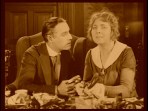 As if that wasn’t enough there are two further silent gems
As if that wasn’t enough there are two further silent gems 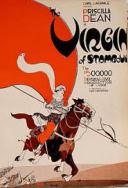 coming up. First is The Whispering Chorus (Dir. Cecil B. DeMille, USA 1918) about a humble employee who absconds with $1000 of company money and is described as a sort of proto-proto-noir. Then there is The Virgin of Stamboul (Dir. Tod Browning, USA, 1920)a somewhat bizarre melodrama set around a Turkish harem.
coming up. First is The Whispering Chorus (Dir. Cecil B. DeMille, USA 1918) about a humble employee who absconds with $1000 of company money and is described as a sort of proto-proto-noir. Then there is The Virgin of Stamboul (Dir. Tod Browning, USA, 1920)a somewhat bizarre melodrama set around a Turkish harem.
Last but by no means least there is a real labour of love from KenBio programmer Michelle Facey (aka @best2vilmabanky). After a lot of hard work not only has she  secured a screening of the spellbinding documentary Dawson City – Frozen Time (Dir. Bill Morrison, US, 2016), piecing together the bizarre true story of a collection of some 500 films dating from 1910s – 1920s, which were lost for over 50 years until discovered buried in a sub-arctic swimming pool deep in the Yukon Territory, in Dawson City, located about 350 miles south of the Arctic Circle, but she has also managed to arrange an almost unique screening of the 35mm version of the film. But even better than that, director Bill Morrison will also be present in person, discussing his work with Kevin Brownlow and, hopefully, taking some questions from the audience. This promises to be a truly one-off evening and makes a fitting high-point for the KenBio’s Autumn season.
secured a screening of the spellbinding documentary Dawson City – Frozen Time (Dir. Bill Morrison, US, 2016), piecing together the bizarre true story of a collection of some 500 films dating from 1910s – 1920s, which were lost for over 50 years until discovered buried in a sub-arctic swimming pool deep in the Yukon Territory, in Dawson City, located about 350 miles south of the Arctic Circle, but she has also managed to arrange an almost unique screening of the 35mm version of the film. But even better than that, director Bill Morrison will also be present in person, discussing his work with Kevin Brownlow and, hopefully, taking some questions from the audience. This promises to be a truly one-off evening and makes a fitting high-point for the KenBio’s Autumn season.
Full details of all of the Kennington Bioscope screenings can be found here or on silentfilmcalendar.org ‘s regular monthly listings pages.
25 July
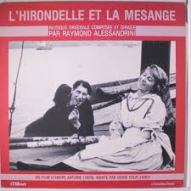 An Un-missable Start to the Barbican’s Autumn Silent Film Programme. Details are now out of the London Barbican’s silent film programme for the Autumn. And could there really be a better film to kick off the season. L’Hirondelle et la Mésange (aka The Swallow and the Titmouse) (Dir. Andre Antoine, Fr, 1920) is a truly fascinating film on so many levels. Shot in 1920 on the canals of Belgium and Northern France the film was deemed by distributor Charles Pathé not to be commercially viable and so the unedited footage lay in the archives of Cinémathèque Française until the early 1980s when the perfectly preserved material was edited into a completed film using Gustave Grillet’s script and the
An Un-missable Start to the Barbican’s Autumn Silent Film Programme. Details are now out of the London Barbican’s silent film programme for the Autumn. And could there really be a better film to kick off the season. L’Hirondelle et la Mésange (aka The Swallow and the Titmouse) (Dir. Andre Antoine, Fr, 1920) is a truly fascinating film on so many levels. Shot in 1920 on the canals of Belgium and Northern France the film was deemed by distributor Charles Pathé not to be commercially viable and so the unedited footage lay in the archives of Cinémathèque Française until the early 1980s when the perfectly preserved material was edited into a completed film using Gustave Grillet’s script and the  director’s detailed notes as a guide. The end result is one of the most beautiful silent films ever made. Yet as well as its ethereal beauty, the film also has a dark side as emotions build between the barge captain (engaged in a little contraband smuggling) and the pilot whom he has hired to steer the coal-bearing ships through areas in France devastated by the war, but who sullenly lusts after first the captain’s sister-in-law and then his wife. But what makes this screening so special is the live accompaniment from pianist Stephen Horne and harpist Elizabeth Jane Baldry. Their accompaniment to this film was the high-point of last year’s British Silent Film Festival and was probably the best silent film with live accompaniment I was privileged to see in 2017. Miss this one at your peril!
director’s detailed notes as a guide. The end result is one of the most beautiful silent films ever made. Yet as well as its ethereal beauty, the film also has a dark side as emotions build between the barge captain (engaged in a little contraband smuggling) and the pilot whom he has hired to steer the coal-bearing ships through areas in France devastated by the war, but who sullenly lusts after first the captain’s sister-in-law and then his wife. But what makes this screening so special is the live accompaniment from pianist Stephen Horne and harpist Elizabeth Jane Baldry. Their accompaniment to this film was the high-point of last year’s British Silent Film Festival and was probably the best silent film with live accompaniment I was privileged to see in 2017. Miss this one at your peril!
But there is much else to recommend in the Barbican’s Autumn programme. In October, in collaboration with  the Czech National Film Archive, they are screening St Wenceslas (Dir. Jan S Kolar,
the Czech National Film Archive, they are screening St Wenceslas (Dir. Jan S Kolar,  Cz, 1929) an epic of Czech film-making, on a par with the work of Griffith or Lange, telling of the tenth century legend of Vaclav Duke of Bohemia (St Wenceslas), who successfully defeated his enemies but who was murdered by his own brother and who later became the patron saint of Czechoslovakia. In November they are screening The City Without Jews (aka Die Stadt ohne Juden) (Dir. Hans Karl Breslauer, Aus, 1924) a dystopian prophecy of intolerance, in which a city expels its Jewish population. It is disturbingly prophetic in its depiction of the murderous anti-semitism in Vienna in the inter-war years. The story of the film is almost as remarkable as its content. Lost during the Second World War, this version was only rediscovered in a Paris flea market in 2015. Also in November is a screening of an episode from the Fantomas series, Juve
Cz, 1929) an epic of Czech film-making, on a par with the work of Griffith or Lange, telling of the tenth century legend of Vaclav Duke of Bohemia (St Wenceslas), who successfully defeated his enemies but who was murdered by his own brother and who later became the patron saint of Czechoslovakia. In November they are screening The City Without Jews (aka Die Stadt ohne Juden) (Dir. Hans Karl Breslauer, Aus, 1924) a dystopian prophecy of intolerance, in which a city expels its Jewish population. It is disturbingly prophetic in its depiction of the murderous anti-semitism in Vienna in the inter-war years. The story of the film is almost as remarkable as its content. Lost during the Second World War, this version was only rediscovered in a Paris flea market in 2015. Also in November is a screening of an episode from the Fantomas series, Juve  Versus Fantomas (Dir. Louis Feuillade, Fr, 1913-14) in which Fantomas, the master criminal, is pursued by his arch-nemesis Inspector Juve with live musical accompaniment by Icelandic neo-classical quartet Amiina. This has the makings of
Versus Fantomas (Dir. Louis Feuillade, Fr, 1913-14) in which Fantomas, the master criminal, is pursued by his arch-nemesis Inspector Juve with live musical accompaniment by Icelandic neo-classical quartet Amiina. This has the makings of  an interesting experiment with the screening of just one mid-section of a much longer serial, which begins and ends with a cliff-hanger.
an interesting experiment with the screening of just one mid-section of a much longer serial, which begins and ends with a cliff-hanger.
To bring the season to a close we have The Cohens And The Kellys (Dir. Henry A Pollard, US, 1926) This lively comedy of feuding Irish and Jewish families in 1920s New York was popular enough in its time to yield seven sequels featuring the Cohens and Kellys. All of the films in this Barbican season come with live musical accompaniment from a range of diverse and highly respected musicians. Its enough to make you wish that the Autumn was soon upon us.
Find out more details from the Barbican here or check out our Sept/Oct/Nov listings pages.
24 July
 September Silent Film Weekend at the KenBio Barely had the smoke and steam from their Silent Trains Day cleared than those great folk at the Kennington Bioscope announced details of their fourth annual Silent Film Weekend, due to take place at the Cinema Museum on 8-9 September.
September Silent Film Weekend at the KenBio Barely had the smoke and steam from their Silent Trains Day cleared than those great folk at the Kennington Bioscope announced details of their fourth annual Silent Film Weekend, due to take place at the Cinema Museum on 8-9 September.
As always with the KenBio, the emphasis is on the rare, the little known and the seldom screened. Right at the top of this list has to be their screening of When the Dead Are Living Again, a German film directed by Erwin Baron and possibly made in 1919 about which I can find absolutely no further information! Marginally less obscure is The Silent Enemy (Dir. H P Carver, US, 1930) a dramatised documentary and early ethnographic  film in the style of Nanook of the North (1922), Grass (1925) or Chiang (1927) and featuring genuine native American tribal leaders. There is a first starring role for wonder-dog Rin Tin Tin in Where The North Begins (Dir. Chester M Franklin, US, 1923), social melodrama in The Garden of Resurrection (Dir. Arthur Rooke, UK, 1919) with the story of a mixed race woman abandoned after a mock marriage , and small town tension, gossip and meanness in Miss Lulu Bett (Dir. William C De Mille, US, 1921). Mary Pickford stars in Sparrows (Dir. William Beaudine, US, 1926) playing the eldest resident of a prison-like orphanage leading a group of
film in the style of Nanook of the North (1922), Grass (1925) or Chiang (1927) and featuring genuine native American tribal leaders. There is a first starring role for wonder-dog Rin Tin Tin in Where The North Begins (Dir. Chester M Franklin, US, 1923), social melodrama in The Garden of Resurrection (Dir. Arthur Rooke, UK, 1919) with the story of a mixed race woman abandoned after a mock marriage , and small town tension, gossip and meanness in Miss Lulu Bett (Dir. William C De Mille, US, 1921). Mary Pickford stars in Sparrows (Dir. William Beaudine, US, 1926) playing the eldest resident of a prison-like orphanage leading a group of  younger children to freedom. Film historians Glenn Mitchell and Michael Pointon take a look at the life and career of serial queen Pearl White. The now woefully under-rated Constance Talmadge appears in a cracking little comedy Her Night of Romance (Dir. Sidney Franklin, UK, 1924). There is a rare screening of the Maurice Elvey epic Balaclava (UK, 1928) where the somewhat hackneyed plot is more than outweighed by the wonderfully stirring shots of the charge of the Light Brigade and
younger children to freedom. Film historians Glenn Mitchell and Michael Pointon take a look at the life and career of serial queen Pearl White. The now woefully under-rated Constance Talmadge appears in a cracking little comedy Her Night of Romance (Dir. Sidney Franklin, UK, 1924). There is a rare screening of the Maurice Elvey epic Balaclava (UK, 1928) where the somewhat hackneyed plot is more than outweighed by the wonderfully stirring shots of the charge of the Light Brigade and  keeping with this Russian theme, Turksib (Dir Victor A Turin, USSR, 1929) provides another opportunity to enjoy the fantastic montage work of Soviet silent cinema in documenting the construction of a railway linking the regions of Turkestan and Siberia. But for my money, the most eagerly awaited presentation of the weekend has to be The
keeping with this Russian theme, Turksib (Dir Victor A Turin, USSR, 1929) provides another opportunity to enjoy the fantastic montage work of Soviet silent cinema in documenting the construction of a railway linking the regions of Turkestan and Siberia. But for my money, the most eagerly awaited presentation of the weekend has to be The  Golden Butterfly (Dir. Michael Curtiz, Aust-Ger, 1926), the director’s last European film before he left for Hollywood and also starring his then wife, the vibrant and vivacious Lila Damita (seen only recently at the KenBio in The Road To Happiness (1926), another Curtiz directed film) in the story of a restaurant worker (Damita) with a secret passion for dance.
Golden Butterfly (Dir. Michael Curtiz, Aust-Ger, 1926), the director’s last European film before he left for Hollywood and also starring his then wife, the vibrant and vivacious Lila Damita (seen only recently at the KenBio in The Road To Happiness (1926), another Curtiz directed film) in the story of a restaurant worker (Damita) with a secret passion for dance.
So, all in all, a packed, varied but always fascinating programme. Renowned film historian Kevin Brownlow will be on-hand introducing some of the screenings, most of which will be shown in 35 or 16mm formats and the KenBio’s regular cast of super talented musicians, including John Sweeney, Cyrus Gabyrusch, Lillian Henley and Meg Morley, will be there to provide live accompaniment. Looking forward to it already.
Details of all of the screenings are available from KenBio here or on the September pages of our listings.
21 June
 Silent Battleships in Portsmouth. In a welcome development, those adventurous types at South West Silents are clearly expanding their global horizons with a short series of silent films with a naval theme, to be screened in conjunction with Portsmouth’s No. 6 Cinema on 28-29 September. And could there really be a
Silent Battleships in Portsmouth. In a welcome development, those adventurous types at South West Silents are clearly expanding their global horizons with a short series of silent films with a naval theme, to be screened in conjunction with Portsmouth’s No. 6 Cinema on 28-29 September. And could there really be a  more appropriate venue for films with such a naval theme than No. 6 Cinema, located in the Grade II listed No. 6 Boathouse, built in 1846 in the heart of Portsmouth’s historic naval dockyard.
more appropriate venue for films with such a naval theme than No. 6 Cinema, located in the Grade II listed No. 6 Boathouse, built in 1846 in the heart of Portsmouth’s historic naval dockyard.
First up on 28th September is Sergei Eisenstein’s epic 1925 tale of mutiny and (failed) revolution, Battleship Potemkin. Although something of a regular fixture on the silent film circuit, it really matters little how many times you may have seen this film, it still packs a punch, particularly the Odessa steps  sequence, so frequently imitated but yet to be surpassed. The film may have been intended as a propaganda piece and is of somewhat dubious historical accuracy but its breathtaking stuff nevertheless. Battleship Potemkin will be accompanied by a recorded soundtrack of Edward Meisel’s 1926 specially commissioned score.
sequence, so frequently imitated but yet to be surpassed. The film may have been intended as a propaganda piece and is of somewhat dubious historical accuracy but its breathtaking stuff nevertheless. Battleship Potemkin will be accompanied by a recorded soundtrack of Edward Meisel’s 1926 specially commissioned score.
 Of perhaps more interest on 29th September will be a screening of the little known British film Zeebrugge, directed by A V Bramble and H Bruce Woolfe and telling of the daring World War I raid by the Royal Navy on the Belgium port of the Bruges-Zeebrugge, a key base for the Imperial German Navy. Made with assistance from the British Admiralty and the Belgium Government and on a budget of just £8,000, this now almost forgotten film combines recreations of dramatic scenes, actual newsreel footage and model work to tell the story of an heroic but ultimately unsuccessful attack. The screening will be accompanied live by musicians Stephen Horne and Martin Pyne.
Of perhaps more interest on 29th September will be a screening of the little known British film Zeebrugge, directed by A V Bramble and H Bruce Woolfe and telling of the daring World War I raid by the Royal Navy on the Belgium port of the Bruges-Zeebrugge, a key base for the Imperial German Navy. Made with assistance from the British Admiralty and the Belgium Government and on a budget of just £8,000, this now almost forgotten film combines recreations of dramatic scenes, actual newsreel footage and model work to tell the story of an heroic but ultimately unsuccessful attack. The screening will be accompanied live by musicians Stephen Horne and Martin Pyne.
 Later on the same day, we’re in for even more of a treat with a very rare screening of British director Maurice Elvey’s masterful film biopic Nelson, made in 1918. The film was a long cherished project for Elvey, Britain’s most prolific film director, one of a series of silent film biopics he made, with other subjects including David Lloyd George and Florence Nightingale. Nelson was made with support and assistance of the Admiralty who saw it as a useful recruiting tool with The Great War still raging. Portraying Admiral Nelson as action hero, the film celebrates his heroic status, expertly recreating some epic moments in British naval history and includes scenes shot on HMS Victory itself. Nelson will be introduced by Lucie Dutton whose recently completed PhD on Maurice Elvey’s early directorial career makes her an unrivaled authority on the film. Live musical accompaniment for the screening will be provided by musicians Stephen Horne and Martin Pyne.
Later on the same day, we’re in for even more of a treat with a very rare screening of British director Maurice Elvey’s masterful film biopic Nelson, made in 1918. The film was a long cherished project for Elvey, Britain’s most prolific film director, one of a series of silent film biopics he made, with other subjects including David Lloyd George and Florence Nightingale. Nelson was made with support and assistance of the Admiralty who saw it as a useful recruiting tool with The Great War still raging. Portraying Admiral Nelson as action hero, the film celebrates his heroic status, expertly recreating some epic moments in British naval history and includes scenes shot on HMS Victory itself. Nelson will be introduced by Lucie Dutton whose recently completed PhD on Maurice Elvey’s early directorial career makes her an unrivaled authority on the film. Live musical accompaniment for the screening will be provided by musicians Stephen Horne and Martin Pyne.
So, all in all its looking like a great weekend to pop down to Portsmouth. Check out all the details here. But  over and above that, if you happen to be in town the day before, No. 6 Cinema is also showing Dawson City: Frozen Time, a fabulous documentary on the unearthing of a huge cache of silent films dating from 1910s – 1920s, which were lost for over 50 years until discovered buried in a sub-arctic swimming pool in Canada’s frozen north. The film presents a unique history of a Canadian gold rush town by chronicling the life cycle of a singular film collection through its exile, burial, rediscovery, and salvation. Find out more here. And if that isn’t enough, don’t forget back in Bristol, South West Silents more traditional stomping ground, they are presenting a whole day of silent films on 1st September at the city’s 20th Century Flicks store/cinema. There is no agenda, you’ll have to turn up to find out what they are screening. Intrigued? Further details here.
over and above that, if you happen to be in town the day before, No. 6 Cinema is also showing Dawson City: Frozen Time, a fabulous documentary on the unearthing of a huge cache of silent films dating from 1910s – 1920s, which were lost for over 50 years until discovered buried in a sub-arctic swimming pool in Canada’s frozen north. The film presents a unique history of a Canadian gold rush town by chronicling the life cycle of a singular film collection through its exile, burial, rediscovery, and salvation. Find out more here. And if that isn’t enough, don’t forget back in Bristol, South West Silents more traditional stomping ground, they are presenting a whole day of silent films on 1st September at the city’s 20th Century Flicks store/cinema. There is no agenda, you’ll have to turn up to find out what they are screening. Intrigued? Further details here.
20 June
 Silent Trains at the Kennington Bioscope Not content with their superb regular programming together with their weekend festivals the good people at KenBio are now putting on a ‘special’, and a railway special to boot. On Saturday 7 July, in conjunction with renowned silent film collector and historian Kevin Brownlow, the Bioscope will be
Silent Trains at the Kennington Bioscope Not content with their superb regular programming together with their weekend festivals the good people at KenBio are now putting on a ‘special’, and a railway special to boot. On Saturday 7 July, in conjunction with renowned silent film collector and historian Kevin Brownlow, the Bioscope will be  programming a whole day of railway-associated silent films. Beginning at the very dawn of the cinema age we can look forward to the Lumière brothers’ famous L’arrivée d’un train en gare de La Ciotat (1896), probably the first appearance of a train on film, share an all too brief moment of British railway passion with A Kiss in the Tunnel from 1899, take a fantastical trip When the Devil Drives (1907) using optical tricks and a combination of painted backdrops and models with a live cast, and ride along with the Railroad Raiders of ’62 (1911) – a precursor to Buster Keaton’s The General. Movie heroines Ruth Roland, Helen Holmes and Gloria Swanson will be on-hand, with
programming a whole day of railway-associated silent films. Beginning at the very dawn of the cinema age we can look forward to the Lumière brothers’ famous L’arrivée d’un train en gare de La Ciotat (1896), probably the first appearance of a train on film, share an all too brief moment of British railway passion with A Kiss in the Tunnel from 1899, take a fantastical trip When the Devil Drives (1907) using optical tricks and a combination of painted backdrops and models with a live cast, and ride along with the Railroad Raiders of ’62 (1911) – a precursor to Buster Keaton’s The General. Movie heroines Ruth Roland, Helen Holmes and Gloria Swanson will be on-hand, with  some railway related thrills while Jean Arthur appears in one of her earliest starring roles in The Block Signal (1926), a story of jealousy and chicanery on the tracks.
some railway related thrills while Jean Arthur appears in one of her earliest starring roles in The Block Signal (1926), a story of jealousy and chicanery on the tracks.
There will be an incredibly rare screening of the silent version of The Flying Scotsman (1929), with a story that differs radically from the talkie version shown at last year’s British Silent Film Festival but still features Pauline Johnson clambering on the outside of the train in her high heels! Also being screened is The Ghost Train (1927), a first film adaptation of the famous stage play by a (very) pre-Dad’s Army Arnold Ridley. Lastly but certainly not  least, Kevin Brownlow will be on hand to introduce The Runaway Express (1926) before conducting us through the making of another epic from Abel Gance, La Roue (1923).
least, Kevin Brownlow will be on hand to introduce The Runaway Express (1926) before conducting us through the making of another epic from Abel Gance, La Roue (1923).
Full details of the 7th July event, which takes place at Lambeth’s Cinema Museum, are available here. And don’t forget, on 4th July there will be a regular KenBio screening, featuring celebrated film diva Alla Nazimova in a dual role in the 1919 melodrama The Red Lantern.
2 May
June is Bursting Out…. With Silents at the BFI In the past we have, on occasion, been somewhat scathing over the BFI Southbank’s lack of commitment to screening silent film. Months have gone by when there hasn’t been a silent included in their listings. At the end of last year they did introduce a regular slot for silents which at least regularised one BFI screening a month but it still woefully under-represents the silent era which still constitutes a quarter of all cinema history!
However, we were shocked and pleasantly surprised on opening the June BFI Southbank programme to discover that there are no less than 62 (yes, count them, SIXTY TWO!!) silent film screenings due to take place at BFI in June. Now, before you fall off your seats in amazement, its not quite that good because there are multiple  screenings of some films. For example, there are no less than 33 screenings of Louise Brooks classic Pandora’s Box (Dir. G W Pabst, Ger, 1929), to tie in with a wider cinema re-release for this title. And I can’t help thinking that with so many screenings there coul d well be some pretty thinly attended events, particularly as other London venues are also likely to be screening the film. Would there not have been more value in a few less screenings of Pandora’s Box, which is already Brooks’ best known and most frequently screened work, but supplemented instead with some of her lesser known but equally worthy films. In particular, The Diary of a Lost Girl (Dir. G W Pabst, Ger, 1929) rarely gets an outing while Prix de Beaute (Dir. Augusto Genino, Italy, 1929) remains virtually unknown in this country and yet surely
screenings of some films. For example, there are no less than 33 screenings of Louise Brooks classic Pandora’s Box (Dir. G W Pabst, Ger, 1929), to tie in with a wider cinema re-release for this title. And I can’t help thinking that with so many screenings there coul d well be some pretty thinly attended events, particularly as other London venues are also likely to be screening the film. Would there not have been more value in a few less screenings of Pandora’s Box, which is already Brooks’ best known and most frequently screened work, but supplemented instead with some of her lesser known but equally worthy films. In particular, The Diary of a Lost Girl (Dir. G W Pabst, Ger, 1929) rarely gets an outing while Prix de Beaute (Dir. Augusto Genino, Italy, 1929) remains virtually unknown in this country and yet surely  rivals Pandora’s Box for quality.
rivals Pandora’s Box for quality.
We then have 19 screenings of Arcadia (Dir. Paul Wright, UK, 2017) a compendium of footage from the BFI National Archive from which BAFTA®-winner Paul Wright has apparently crafted a dense poetic essay on Britain’s shifting relationship to the land. Other than one previous screening earlier this year at the Borderlands Festival I believe this to be Arcadia’s first outing and having not seen the film I cannot comment on it. But given that it draws from the BFI’s own  archive footage it is understandable that they want to give the film maximum exposure so the multiple screenings are probably understandable.
archive footage it is understandable that they want to give the film maximum exposure so the multiple screenings are probably understandable.
Yet even without the multiple screenings of these two films, June is still a bumper month for silents at the BFI. Piccadilly (Dir E A Dupont, UK,  1929) with the wonderful Anna May Wong gets three outings, animation pioneer Lotte Reiniger’s The Adventures of Prince Achmed (Dir. Lotte Reiniger , Ger, 1926) is screened twice and Clara Bow gets a couple of chances to shine as the ‘It’ girl in the aptly named It (Dir. Clarance Badger, US,
1929) with the wonderful Anna May Wong gets three outings, animation pioneer Lotte Reiniger’s The Adventures of Prince Achmed (Dir. Lotte Reiniger , Ger, 1926) is screened twice and Clara Bow gets a couple of chances to shine as the ‘It’ girl in the aptly named It (Dir. Clarance Badger, US, 1927). Of somewhat more interest is a rare double screening of Siren of the Tropics (Dir. Mario Nalpas/Henri Etievant, Fr, 1927) starring the incomparable Josephine Baker in a role designed to show off her electrifying talent. There is an even rarer outing for Mothers of Men (aka
1927). Of somewhat more interest is a rare double screening of Siren of the Tropics (Dir. Mario Nalpas/Henri Etievant, Fr, 1927) starring the incomparable Josephine Baker in a role designed to show off her electrifying talent. There is an even rarer outing for Mothers of Men (aka  Every Women’s Problem) (Dir. Willis Robards, US, 1917) an early thought-provoking piece on women’s suffrage, being screened in a newly restored version.
Every Women’s Problem) (Dir. Willis Robards, US, 1917) an early thought-provoking piece on women’s suffrage, being screened in a newly restored version.
So, praise where praise is due, the BFI is certainly rolling the boat out for silent film in June. One can only hope that the trend continues in subsequent months! Details of all of these films can of course be found in our listings pages Here
1 May
May Looking Like A Bumper Silent Film Month With well over sixty silent film screenings, May is looking like a pretty good month for silent film. Pride of place must go to the Yorkshire Silent Film Festival which kicks off on 8 May with Paul Merton introducing some silent comedy classics at the City Varieties Music Hall in Leeds. As is becoming customary, the festival has a pleasant mix of the popular, the classics and the often somewhat more obscure. Highlights this year include a little known French epic The Late Mathias  Pascal (Dir. Marcel L’Herbier, Fr, 1926) with Russian heartthrob Ivan Mosjoukine; two classic Louise Brooks films, the first, Beggars of Life (Dir. William Wellman, 1928), probably her best role in a US film, and the second, Prix de Beaute (Dir. Augusto Genino, Italy, 1929), her final European film appearance and an absolute masterpiece. Douglas Fairbanks swashes his way through The Mark of
Pascal (Dir. Marcel L’Herbier, Fr, 1926) with Russian heartthrob Ivan Mosjoukine; two classic Louise Brooks films, the first, Beggars of Life (Dir. William Wellman, 1928), probably her best role in a US film, and the second, Prix de Beaute (Dir. Augusto Genino, Italy, 1929), her final European film appearance and an absolute masterpiece. Douglas Fairbanks swashes his way through The Mark of  Zorro (Dir. Fred Niblo, US, 1920) while Lon Chaney takes on yet another bizarre persona as the arm-less knife thrower (yes, really!) in The Unknown (Dir. Tod Browning, US, 1927). Most if not all of the films are accompanied live by a host of top notch musicians including the renowned Neil Brand, harpist Elizabeth Jane Baldry, the festival’s own Jonny Best and from America the pianist Donald Sosin.
Zorro (Dir. Fred Niblo, US, 1920) while Lon Chaney takes on yet another bizarre persona as the arm-less knife thrower (yes, really!) in The Unknown (Dir. Tod Browning, US, 1927). Most if not all of the films are accompanied live by a host of top notch musicians including the renowned Neil Brand, harpist Elizabeth Jane Baldry, the festival’s own Jonny Best and from America the pianist Donald Sosin.
 But there is a lot else going on across the country besides. In London, the month kicks off with one of those annoying silent film fixture clashes, will it be Stroheim’s oh-so-OTT epic Queen Kelly (Dir. Erich von Stroheim, US, 1929) at the Austrian Cultural Institute or an Ozu classic Tokyo Chorus (Dir. Yasujiro Ozu, Jap, 1931) at the Ken Bio. On the 6 May there is a silent crime classic The Racket (Dir. Lewis Milestone, US, 1928) at the BFI while on 16th the Barbican is showing the great Alla Nazimova in
But there is a lot else going on across the country besides. In London, the month kicks off with one of those annoying silent film fixture clashes, will it be Stroheim’s oh-so-OTT epic Queen Kelly (Dir. Erich von Stroheim, US, 1929) at the Austrian Cultural Institute or an Ozu classic Tokyo Chorus (Dir. Yasujiro Ozu, Jap, 1931) at the Ken Bio. On the 6 May there is a silent crime classic The Racket (Dir. Lewis Milestone, US, 1928) at the BFI while on 16th the Barbican is showing the great Alla Nazimova in  Salome (Dir. Charles Bryant, US, 1923). The following day at Southbank Centre sees a rare screening of Der Rosenkavalier (Dir. Robert Wiene, Aust, 1926) with Richard Strauss’ original orchestral score and on 19 May renowned film historian and collector Kevin Brownlow picks out a few of his personal film favourites while in conversation with Neil Brand at the wonderful Cinema Museum.
Salome (Dir. Charles Bryant, US, 1923). The following day at Southbank Centre sees a rare screening of Der Rosenkavalier (Dir. Robert Wiene, Aust, 1926) with Richard Strauss’ original orchestral score and on 19 May renowned film historian and collector Kevin Brownlow picks out a few of his personal film favourites while in conversation with Neil Brand at the wonderful Cinema Museum.
 Elsewhere, Phantom Of The Opera (Dir. Rupert Julian, 1925) puts in a few appearances in the Midlands, as does Nosferatu (Dir. F W Murnau, 1922), whilst in Glasgow the fantastic Italian silent film diva Francesca Bertini stars in the equally wonderful Assunta Spina (Dir. Gustavo Serena and Francesca Bertini, It, 1915).
Elsewhere, Phantom Of The Opera (Dir. Rupert Julian, 1925) puts in a few appearances in the Midlands, as does Nosferatu (Dir. F W Murnau, 1922), whilst in Glasgow the fantastic Italian silent film diva Francesca Bertini stars in the equally wonderful Assunta Spina (Dir. Gustavo Serena and Francesca Bertini, It, 1915).
So, whatever your silent film tastes, there is something in May for everyone. Go out and enjoy. As always, full details are on silentfilmcalendar.org’s listings pages.
11 March
 Two Chances To See Four Horsemen If you happen to be in the Dublin or Manchester areas in the next week there is an opportunity to catch a rare screening of silent classic The Four Horsemen Of The Apocalypse (Dir. Rex Ingram, US, 1921) with live musical accompaniment. The film tells a truly epic tale of an Argentine family which is divided and ends up fighting on
Two Chances To See Four Horsemen If you happen to be in the Dublin or Manchester areas in the next week there is an opportunity to catch a rare screening of silent classic The Four Horsemen Of The Apocalypse (Dir. Rex Ingram, US, 1921) with live musical accompaniment. The film tells a truly epic tale of an Argentine family which is divided and ends up fighting on  opposite sides during the First World War. Based on a novel by writer Vicente Blasco Ibanez, the film grew into a mammoth production costing over a million dollars. There were some 12,000 extras, 14 cameramen and 12 assistant directors.
opposite sides during the First World War. Based on a novel by writer Vicente Blasco Ibanez, the film grew into a mammoth production costing over a million dollars. There were some 12,000 extras, 14 cameramen and 12 assistant directors.
 The driving force behind the film was June Mathis. Nominally a screen-writer, she was in effect the film’s (uncredited) producer. It was Mathis who saw the potential of Ibanez’s novel and browbeat Metro Pictures into acquiring the rights after which she wrote a highly praised screenplay and also had a hand in selecting Ingram to direct. But perhaps Mathis’ most significant act was in personally selecting and coaching little known
The driving force behind the film was June Mathis. Nominally a screen-writer, she was in effect the film’s (uncredited) producer. It was Mathis who saw the potential of Ibanez’s novel and browbeat Metro Pictures into acquiring the rights after which she wrote a highly praised screenplay and also had a hand in selecting Ingram to direct. But perhaps Mathis’ most significant act was in personally selecting and coaching little known  actor Rodolfo Alfonso Raffaello Pierre Filibert Guglielmi di Valentina d’Antonguolla, better known as Rudolph Valentino, for the film’s starring role. The rest, as they say, is history. The Four Horsemen went on to take some four million dollars at the box office (one of the highest ever grossing silent films) and turn Valentino over-night into a superstar (albeit one still earning a paltry $350 per week!).
actor Rodolfo Alfonso Raffaello Pierre Filibert Guglielmi di Valentina d’Antonguolla, better known as Rudolph Valentino, for the film’s starring role. The rest, as they say, is history. The Four Horsemen went on to take some four million dollars at the box office (one of the highest ever grossing silent films) and turn Valentino over-night into a superstar (albeit one still earning a paltry $350 per week!).
The film will be screened on 15 March at St Patrick’s Cathedral in Dublin and at Home Cinema in Manchester on 18 March. Both screenings will be accompanied by a newly commissioned score written be internationally renowned composers Matthew Nolan and Barry Adamson (Magazine, Nick Cave & the Bad Seeds) and performed live by them along with musicians Seán Mac Erlaine, Adrian Crowley and Kevin Murphy.
Full details can be found here.
27 February
There’s A Lot Going On In March! There is indeed a veritable cornucopia of silent film delights coming up across the country in March. Over in the Hereford area, although the Borderlines Film Festival has  already kicked off , their silent film offerings don’t start until March, including a recently restored version of The Lost World (Dir. Harry Hoyt, US, 1925), that darkest of silent films, Behind The Door (Dir. Irvin Willat, 1919) plus that rare beast, a modern silent, Arcadia (Dir. Paul Wright, UK, 2017), crafted from archive footage into a poetic essay on Britain’s shifting relationship with the land. On 10-11
already kicked off , their silent film offerings don’t start until March, including a recently restored version of The Lost World (Dir. Harry Hoyt, US, 1925), that darkest of silent films, Behind The Door (Dir. Irvin Willat, 1919) plus that rare beast, a modern silent, Arcadia (Dir. Paul Wright, UK, 2017), crafted from archive footage into a poetic essay on Britain’s shifting relationship with the land. On 10-11  March the mood switches to comedy with the Kennington Bioscope’s Silent Laughter Weekend, promising delights such as the woefully under-rated Raymond Griffith in The Night Club (Dir. Paul Iribe/Frank Urson, US, 1925), renowned stage comedienne Beatrice Lillie in one of her few film appearances in Exit Smiling (Dir. Sam Taylor, US, 1926), together with tragic comedy genius Max Linder in Seven Years Bad Luck (Dir. Max Linder, US, 1921) together with a whole lot more besides in their
March the mood switches to comedy with the Kennington Bioscope’s Silent Laughter Weekend, promising delights such as the woefully under-rated Raymond Griffith in The Night Club (Dir. Paul Iribe/Frank Urson, US, 1925), renowned stage comedienne Beatrice Lillie in one of her few film appearances in Exit Smiling (Dir. Sam Taylor, US, 1926), together with tragic comedy genius Max Linder in Seven Years Bad Luck (Dir. Max Linder, US, 1921) together with a whole lot more besides in their packed two day programme. As part of the Kinoteka Polish Film Festival, underway throughout the month, there will be a rare screening of Pola Negri’s earliest surviving Polish film Bestia (aka The Polish Dancer) (Dir. Aleksander Hertz, Pol, 1917) as well as a restored version of the equally rare The Call Of The Sea (aka Zew Morza) (Dir. Henryk Szaro, Pol, 1927)
packed two day programme. As part of the Kinoteka Polish Film Festival, underway throughout the month, there will be a rare screening of Pola Negri’s earliest surviving Polish film Bestia (aka The Polish Dancer) (Dir. Aleksander Hertz, Pol, 1917) as well as a restored version of the equally rare The Call Of The Sea (aka Zew Morza) (Dir. Henryk Szaro, Pol, 1927)
Later in the month, the focus switches to Scotland and the 2018 Hippodrome Silent Film Festival in Bo’Ness. Highlights this year include Lubitsch masterpiece The Student Prince in Old Heidelberg (Dir. Ernst Lubitsch/John M. Stahl, 1928), a superb version of 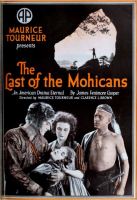 Last of the Mohicans (Dir. Maurice Tourneur/Clarence Brown, US, 1920), G W Pabst’s rarely screened debut film The Treasure (Der Schatz) (Dir. G W Pabst, Ger, 1923) and a newly introduced Saturday late night slot featuring the intriguing Seven Footprints to Satan (Dir. Benjamin Christensen, US, 1929), from the director of the superb Haxan
Last of the Mohicans (Dir. Maurice Tourneur/Clarence Brown, US, 1920), G W Pabst’s rarely screened debut film The Treasure (Der Schatz) (Dir. G W Pabst, Ger, 1923) and a newly introduced Saturday late night slot featuring the intriguing Seven Footprints to Satan (Dir. Benjamin Christensen, US, 1929), from the director of the superb Haxan (1922). Also look out for another presentation on Chinese silent cinema from Californian academic Prof. Paul Pickowicz, whose knowledge of and enthusiasm for his subject is boundless and positively infectious.
(1922). Also look out for another presentation on Chinese silent cinema from Californian academic Prof. Paul Pickowicz, whose knowledge of and enthusiasm for his subject is boundless and positively infectious.
But apart from festivals, March is also notable for a large number of stand-out one-off screenings. Early Italian diva Francesca Bertini stars in Assunta Spina (Dir. Gustavo Serena and Francesca Bertini, It, 1915), being screened in Glasgow. Garbo stars in The Mysterious Lady (Dir. Fred Niblo, US, 1928) at the Royal Festival Hall with full orchestral accompaniment conducted by Carl Davis. A little known jury-room melodrama The Woman Under Oath (Dir. John H Stahl. US, 1919) screens at the BFI, something of a precursor to Twelve Angry Men (1957) but with a strong feminist perspective. Apart from their comedy  weekend, the Kennington Bioscope is also screening another collection of 9.5mm rarities from Kevin Brownlow’s personal collection (including Casanova (aka The Prince of Adventurers) (Dir. Alexandre Volkoff, Fr, 1927) starring Ivan Mozzhukhin) together with one of Marion Davies’ more watchable historical melodramas, Little Old New York (Dir. Sidney Olcott, US, 1923. Lastly, in Bristol, there is a rare outing for the
weekend, the Kennington Bioscope is also screening another collection of 9.5mm rarities from Kevin Brownlow’s personal collection (including Casanova (aka The Prince of Adventurers) (Dir. Alexandre Volkoff, Fr, 1927) starring Ivan Mozzhukhin) together with one of Marion Davies’ more watchable historical melodramas, Little Old New York (Dir. Sidney Olcott, US, 1923. Lastly, in Bristol, there is a rare outing for the  little known Soviet propoganda piece Old And New (aka The General Line) (Dir. Sergei Eisenstein/Grigori Aleksandrov. USSR, 1929).
little known Soviet propoganda piece Old And New (aka The General Line) (Dir. Sergei Eisenstein/Grigori Aleksandrov. USSR, 1929).
As well as March festival screenings and the more unusual one-offs highlighted above, there are also a healthy number of more frequently screened popular silents including The Informer (Dir. Arthur Robison, 1929), Chicago (Dir. Frank Urson & Cecil B.DeMille (uncredited), 1927) and Phantom Of The Opera (Dir. Rupert Julian, 1925) plus some more opportunities to catch up with the delights of Shiraz (Dir. Franz Osten, 1928).
With almost 70 screenings already scheduled , March is looking like a pretty good month for silent film watching. Details of all of these screenings and more can be found here.
1 February
 ‘Invisible’ Silents At The Barbican So, you like silent film with live music (and lets be honest, you wouldn’t be reading this if you didn’t). You know that they stage such events at the Barbican in London so off you go to their website to check out what’s on offer. After an age negotiating the almost impenetrable labyrinth which is the Barbican’s new and ‘improved’ website you may eventually stumble upon their Silent-Film-and-Live-Music events page. At last, details of all silent film events
‘Invisible’ Silents At The Barbican So, you like silent film with live music (and lets be honest, you wouldn’t be reading this if you didn’t). You know that they stage such events at the Barbican in London so off you go to their website to check out what’s on offer. After an age negotiating the almost impenetrable labyrinth which is the Barbican’s new and ‘improved’ website you may eventually stumble upon their Silent-Film-and-Live-Music events page. At last, details of all silent film events 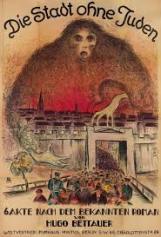 scheduled at the Barbican. Well, maybe not! Because this morning, quite by chance, I stumbled upon details of a screening of the recently rediscovered and restored Austrian silent classic The City Without Jews (aka Die Stadt ohne Juden) directed in 1924 by Hans Karl Breslauer. But you won’t find any mention of this film on the Barbican’s Silent-Film-and-Live-Music page. No, to find this film you’ve got to search under ‘classical
scheduled at the Barbican. Well, maybe not! Because this morning, quite by chance, I stumbled upon details of a screening of the recently rediscovered and restored Austrian silent classic The City Without Jews (aka Die Stadt ohne Juden) directed in 1924 by Hans Karl Breslauer. But you won’t find any mention of this film on the Barbican’s Silent-Film-and-Live-Music page. No, to find this film you’ve got to search under ‘classical  music’! Why?
music’! Why?
Could it be to do with the differing musical styles of the accompaniment. Certainly many of the films in the Silent-Film-and-Live-Music strand have a very contemporary style. But then again, many others are accompanied by music in a very classical style. So that can’t be it. And to further muddy the waters, the Phace Ensemble who are accompanying The City Without Jews in this classical music strand describe themselves as having been long active ‘in the contemporary music scene’. So we’re no wiser there either! But rather than getting bogged down in the  semantics of how individual events are categorised, would it really be too much to ask of the Barbican for a little better
semantics of how individual events are categorised, would it really be too much to ask of the Barbican for a little better 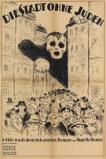 cross-referencing across their website thereby ensuring that no one misses out on events that they really would wish to attend if only they were aware of them.
cross-referencing across their website thereby ensuring that no one misses out on events that they really would wish to attend if only they were aware of them.
But having now discovered the planned screening of The City Without Jews, this really is a must see event. All copies of the film were believed lost during the Second World War, This version was only rediscovered in a Paris flea market in 2015 and restored by the Austrian Film Archive with the aid of a 75,000 Euro crowd funding appeal. The City Without Jews presents a dystopian prophecy of intolerance showing the cultural and economic impoverishment of a city that expels its Jewish population, and is disturbingly  prophetic in its depiction of the murderous anti-Semitism in Vienna in
prophetic in its depiction of the murderous anti-Semitism in Vienna in 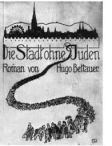 the wake of the First World War. And its political message is apparently even more sharply articulated in this newly restored version, with additional scenes including a hitherto lost ending.
the wake of the First World War. And its political message is apparently even more sharply articulated in this newly restored version, with additional scenes including a hitherto lost ending.
The City Without Jews is being shown at the Barbican’s Milton Court Concert Hall on 15 November. But if you want to see it you had better get your skates on because it is very nearly sold out, presumably to all those classical music followers!
31 January
 The Frustration of Silent Film Fixture Clashes! This year’s Kennington Bioscope Silent Laughter Weekend is scheduled for 10-11 March at the (still under threat) Cinema Museum. The event was announced well before Christmas and we and a lot of others have been looking forward
The Frustration of Silent Film Fixture Clashes! This year’s Kennington Bioscope Silent Laughter Weekend is scheduled for 10-11 March at the (still under threat) Cinema Museum. The event was announced well before Christmas and we and a lot of others have been looking forward  expectantly to another weekend mix of classics and rarities, many shown in their original film format and all with live accompaniment. Then in another boon for silent film lovers, the BFI announced yesterday that in March it will be screening The Woman Under Oath (1919) a little known but extremely interesting looking courtroom melodrama from director John M Stahl
expectantly to another weekend mix of classics and rarities, many shown in their original film format and all with live accompaniment. Then in another boon for silent film lovers, the BFI announced yesterday that in March it will be screening The Woman Under Oath (1919) a little known but extremely interesting looking courtroom melodrama from director John M Stahl  with, for its time, a radical focus on issues of female emancipation and abuse, which remain relevant still today. So March would appear to be looking good for silent film. Well not really, because the BFI have scheduled The Woman Under Oath for the afternoon of 11 March, right in the middle of Day 2 of the Silent Laughter Weekend.
with, for its time, a radical focus on issues of female emancipation and abuse, which remain relevant still today. So March would appear to be looking good for silent film. Well not really, because the BFI have scheduled The Woman Under Oath for the afternoon of 11 March, right in the middle of Day 2 of the Silent Laughter Weekend.
No problem you may cry, let the silent comedy lovers go to the KenBio and silent melodrama fans to the BFI. But what if you just like silent film in all its genres? Well then, just pick the film you most want to see and catch up with the other one at a later date. Except it may not be that easy. Screenings of Stahl silents are about as rare as hen’s teeth, particularly in 35mm and with live accompaniment. I can’t recall a previous screening in London. And although the Silent Comedy Weekend programme has yet to be finalised, the KenBio’s traditional focus on the more obscure and little seen rarities means there is a good chance that whatever they show that afternoon is unlikely to be screened again either.
But aren’t these fixture clashes inevitable in silent film, just like any other type of event, be it sport, drama, music or whatever. Well perhaps. But if its a clash between a silent film event in London and another say in Bristol, or Manchester or Edinburgh, well no complaints there because the distance involved means that you are almost invariably catering to distinct regional audiences with little danger of overlap. But are we really so well served with silent film screenings even in London that we can afford to run them in competition with one another. I would say that we most assuredly are not!
And what of the impact of such a clash. Well, both events must loose out. Both the KenBio and their hosts, the Cinema Museum, operate (and I hope they won’t mind me describing it as such) on something of a hand to mouth existence so presumably can ill-afford the loss of income from empty seats at their event. As for the BFI, while ticket revenue never appears to be an issue, the profile of silent cinema could already hardly be any lower (probably constituting well under 5% of the films screened there , despite still accounting for a quarter of all film history!). Typical of this low profile is the fact that the March screening of The Woman Under Oath is the only silent event at the BFI for the whole month. And at a 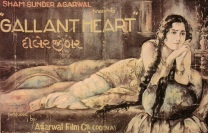 time when they have at least secured a single regular monthly slot for silent film, what will be the reaction to another poorly attended event. At the very least, a hasty switch to a smaller screen as happened with Gallant Hearts (1931) in January or, more seriously, a reappraisal of the very wisdom of screening even this low number of silent films because they don’t appear to pull in sufficient
time when they have at least secured a single regular monthly slot for silent film, what will be the reaction to another poorly attended event. At the very least, a hasty switch to a smaller screen as happened with Gallant Hearts (1931) in January or, more seriously, a reappraisal of the very wisdom of screening even this low number of silent films because they don’t appear to pull in sufficient  audiences.
audiences.
Without wishing to apportion blame, its hard not to take the BFI to task on this as they appear to operate in something of a scheduling vacuum. Dates for the KenBio Festival have been widely available since at least last November. And its not like the BFI haven’t got previous form for such a clash. Their late scheduling of The  Informer (1929) as the silent film highlight of the 2016 London Film Festival was in direct competition with the Barbican’s screening of The Adventures of Robin Hood (1922) with live full orchestral accompaniment which had been widely publicised for almost a year in advance.
Informer (1929) as the silent film highlight of the 2016 London Film Festival was in direct competition with the Barbican’s screening of The Adventures of Robin Hood (1922) with live full orchestral accompaniment which had been widely publicised for almost a year in advance.
Whichever venue we choose to attend on the afternoon of 11 March, it will be deeply frustrating to think that barely two miles away is another silent film being screened which we may well never get the chance to see again. Wouldn’t it be nice to think that someone would come up with some sort of silent film calendar to help avoid this happening again in the future…..
8 January
 New Regular Silent Film Screenings At Genesis And The Palace. Its always nice to see silent film screenings become a regular event at new venues and
New Regular Silent Film Screenings At Genesis And The Palace. Its always nice to see silent film screenings become a regular event at new venues and  particularly if they come with live musical accompaniment. So its doubly nice to get news of not just one but two such new regular events. In December, the venerable Palace Cinema in Broadstairs, Kent put on a screening of Keaton’s The General (Dir. Buster Keaton/Clyde Bruckman,US, 1926) with live piano accompaniment from the excellent Lillian Henley. This was a taster for a regular silent film slot at The Palace in 2018. Screenings will take place on the afternoon of the last Sunday of each month. Screenings begin in January although we don’t yet have a first title. Meanwhile, at the Genesis Cinema in London, following a successful screening last year of The Cabinet of Dr Caligari (Dir. Robert
particularly if they come with live musical accompaniment. So its doubly nice to get news of not just one but two such new regular events. In December, the venerable Palace Cinema in Broadstairs, Kent put on a screening of Keaton’s The General (Dir. Buster Keaton/Clyde Bruckman,US, 1926) with live piano accompaniment from the excellent Lillian Henley. This was a taster for a regular silent film slot at The Palace in 2018. Screenings will take place on the afternoon of the last Sunday of each month. Screenings begin in January although we don’t yet have a first title. Meanwhile, at the Genesis Cinema in London, following a successful screening last year of The Cabinet of Dr Caligari (Dir. Robert 
 Wiene, 1920) with live accompaniment by electro-improvisational group Grok, they have now secured a regular monthly slot at the cinema and will be accompanying Hitchcock’s first thriller The Lodger: A Story of the London Fog (Dir. Alfred Hitchcock, UK, 1927) in January, the somewhat bizarre Lon Chaney vehicle The Unknown (Dir. Tod Browning, US, 1927) in February, the beautiful and lyrical Earth (Dir. Oleksandr Dovzhenko, USSR, 1930) in March and Eisenstein’s masterpiece Battleship Potemkin (Dir. Sergei Eisenstein,USSR, 1925) in April. Details of all of these screenings at Genesis and The Palace will of course be available on the listings pages of silentfilmcalendar.org.
Wiene, 1920) with live accompaniment by electro-improvisational group Grok, they have now secured a regular monthly slot at the cinema and will be accompanying Hitchcock’s first thriller The Lodger: A Story of the London Fog (Dir. Alfred Hitchcock, UK, 1927) in January, the somewhat bizarre Lon Chaney vehicle The Unknown (Dir. Tod Browning, US, 1927) in February, the beautiful and lyrical Earth (Dir. Oleksandr Dovzhenko, USSR, 1930) in March and Eisenstein’s masterpiece Battleship Potemkin (Dir. Sergei Eisenstein,USSR, 1925) in April. Details of all of these screenings at Genesis and The Palace will of course be available on the listings pages of silentfilmcalendar.org.
21 November
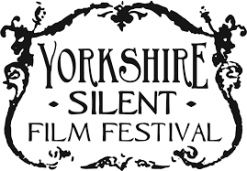 Silent Film Festival Planning Up t’North Those good people at the Yorkshire Silent Film Festival are beavering away to get everything in place for next year’s festival. This kicks off on May 8 2018 with a Gala opening and runs for the rest of the month at venues across the county. Screening locations already include Leeds, Sheffield, York, Hull, Scarborough, Hebden Bridge, Settle, Ossett, Kettlewell, Leyburn with more due to be added. Since its inception in 2016 the festival has already become firmly established on the silent film fixture list and the 2018 event is aiming to build on the previous two year’s successes. As with previous years, the festival is likely to include a mix of the popular, the renowned and the more obscure (but no less interesting) film titles. The films will be accompanied by live music from a host of nationally and internationally known musicians together with pianist and festival organiser Jonny Best.
Silent Film Festival Planning Up t’North Those good people at the Yorkshire Silent Film Festival are beavering away to get everything in place for next year’s festival. This kicks off on May 8 2018 with a Gala opening and runs for the rest of the month at venues across the county. Screening locations already include Leeds, Sheffield, York, Hull, Scarborough, Hebden Bridge, Settle, Ossett, Kettlewell, Leyburn with more due to be added. Since its inception in 2016 the festival has already become firmly established on the silent film fixture list and the 2018 event is aiming to build on the previous two year’s successes. As with previous years, the festival is likely to include a mix of the popular, the renowned and the more obscure (but no less interesting) film titles. The films will be accompanied by live music from a host of nationally and internationally known musicians together with pianist and festival organiser Jonny Best.
Watch out for more details of the festival as we get them and check out the festival website Here
20 November
Oh to be in Berlin – Weimar Cinema Revisited. For fans of Weimar cinema – and lets face it, that’s pretty much all of us – the 2018 Berlin International Film Festival looks to be a must see event. The reason is, the festival ‘Retrospective’ strand will be focusing on cinema of the Weimar era, showcasing a programme of 28 narrative, documentary, and short films made between 1918 and 1933. The films to be screened will be categorised under three broad themes, the ‘exotic’, the ‘everyday’ and history.
Amongst screenings already announced are;
Im Auto durch zwei Welten (In the Car Through Two Worlds, 1931) a documentary by Swede Carl Axel Söderström about his and Clärenore Stinnes’ 1927-31 round the world car journey.
Menschen im Busch (People In The Bush, 1930), an early example of ethnographic cinema in which Friedrich Dalsheim and Gulla Pfeffer observe the unspectacular daily life of a family in Togo, breaking new  ground by allowing the subjects themselves to speak instead of relying entirely on off-camera narration.
ground by allowing the subjects themselves to speak instead of relying entirely on off-camera narration.
Brothers (1929) (image, right) a silent drama from director Werner Hochbaum focusing upon a poor working class family amidst Hamburg’s 1896/97 dockworkers’ strike and featuring a largely amateur cast.
The retrospective will feature first screenings of films newly restored by leading German archives and film institutions including mountaineering epic Fight for  the Matterhorn (Mario Bonnard, Nunzio Malasomma, 1928), Robert Reinert’s monumental Opium (1919), as well as a two-part film long thought lost, Urban Gad’s Christian Wahnschaffe (Part 1: World Afire, 1920, Part 2: The Escape from the Golden Prison, 1921), based on the 1919 Jakob Wassermann novel ‘The World’s
the Matterhorn (Mario Bonnard, Nunzio Malasomma, 1928), Robert Reinert’s monumental Opium (1919), as well as a two-part film long thought lost, Urban Gad’s Christian Wahnschaffe (Part 1: World Afire, 1920, Part 2: The Escape from the Golden Prison, 1921), based on the 1919 Jakob Wassermann novel ‘The World’s  Illusion’.
Illusion’.
The emphasis in the retrospective will be on lesser known titles from the era with other screenings including Der Favorit der Königin (Dir. Franz Seitz, Sr.,1922), The Adventure of Thea Roland (Dir. Hermann Kosterlitz, 1932) and The Docks of Hamburg (Die Carmen von St. Pauli, Dir. Erich Waschneck, 1928).
Most of the silent film screenings will be accompanied by live music from internationally renowned musicians including the UK’s own Stephen Horne while well known German musician Gunter Buchwald will be celebrating 40 years as a silent film accompanist in 2018.
The festival runs from 15 -25 February 2018, so get booking those tickets now. Further details Here
16 October
 Cinema Museum Under Threat! Shock news comes of an imminent threat to the future of London’s Cinema Museum. The museum is a one-off treasure trove of cinematic delights. It receives no public funding and has something of a perennial hand-to-mouth existence but it
Cinema Museum Under Threat! Shock news comes of an imminent threat to the future of London’s Cinema Museum. The museum is a one-off treasure trove of cinematic delights. It receives no public funding and has something of a perennial hand-to-mouth existence but it  remains the only museum in Britain dedicated to all aspects of the history of cinema and is just too important to be lost for the sake of another featureless housing development.
remains the only museum in Britain dedicated to all aspects of the history of cinema and is just too important to be lost for the sake of another featureless housing development.
Based for the past 19 years in the old Lambeth Workhouse, the former home to Charlie Chaplin, his brother and mother, the Cinema Museum houses a priceless collection of historic cinema artefacts including films, over a million movie stills, thousands of books, magazines going back to the 1900s and a huge range of rare and historically important cinema equipment. They provide essential training  and resources to universities/students studying film, cinema, media and communications via this unprecedented archive of material. The Cinema Museum hosts a wide range of regular cinema and other media related gatherings and events, frequently attracting world renowned guests. It also provides extensive well-being services for elderly, disabled, LGBT and other culturally and socially marginalised members of the community. The collection’s owners want to gift a substantial proportion of their collection to the Nation via the charitable vehicle
and resources to universities/students studying film, cinema, media and communications via this unprecedented archive of material. The Cinema Museum hosts a wide range of regular cinema and other media related gatherings and events, frequently attracting world renowned guests. It also provides extensive well-being services for elderly, disabled, LGBT and other culturally and socially marginalised members of the community. The collection’s owners want to gift a substantial proportion of their collection to the Nation via the charitable vehicle 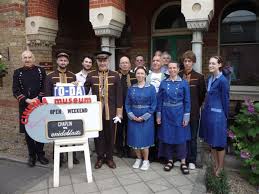 of The Cinema Museum – once their permanent home is secured. Sadly, it seems that these services and the opportunity for this gift may now be lost forever.
of The Cinema Museum – once their permanent home is secured. Sadly, it seems that these services and the opportunity for this gift may now be lost forever.
The Cinema Museum landlords over this time have been South London & Maudsley NHS Foundation Trust. The museum has always paid market rent and frequently delivered therapy projects and hosted events for the hospital free of charge. Over the past 10 years South London & Maudsley Hospital Trust had agreed to let the Museum charity purchase its home, to secure its future once the hospital was ready to sell. The Museum paid for valuations, found partners, 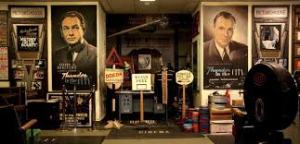 secured funding and as agreed awaited the sale. However, the hospital has now changed its mind at the last minute, denying that there was ever any agreement with the Cinema Museum. They are now refusing to sell to the Museum, insisting on it being sold on the open market with a view to a fast sale. This leaves the Cinema Museum facing closure within months and the South London & Maudsley Hospital Trust have even said they will make the imminent lease expiry (March 2018) a feature of their marketing materiel.
secured funding and as agreed awaited the sale. However, the hospital has now changed its mind at the last minute, denying that there was ever any agreement with the Cinema Museum. They are now refusing to sell to the Museum, insisting on it being sold on the open market with a view to a fast sale. This leaves the Cinema Museum facing closure within months and the South London & Maudsley Hospital Trust have even said they will make the imminent lease expiry (March 2018) a feature of their marketing materiel.
On 17 October a petition was started to help bring pressure on the NHS Foundation to revert to its previous promise to sell the building to the Cinema Museum. You can add your signature Here
To find out more or show your further support, contact the Cinema Museum at martin@cinemamuseum.org.uk or on twitter @CinemaMuseum or on FacebookHere
15 October
Some good silent film news for Orcadians. Scotland’s Orkney Isles may perhaps not be the best place to live if you have an abiding interest in silent film with live musical accompaniment, but the next couple of weeks at least will be something of a boon. On 21st October there will be a screening in Stromness of  By the Law (Dir . Lev Kuleshov,USSR, 1926) legendary Russian director Lev Kuleshov’s adaption of a short story by Jack London, fashioning a tense, existential study of moral pressure… in effect a pared-back Soviet
By the Law (Dir . Lev Kuleshov,USSR, 1926) legendary Russian director Lev Kuleshov’s adaption of a short story by Jack London, fashioning a tense, existential study of moral pressure… in effect a pared-back Soviet  Western. The film will be accompanied by multi-award-winning Scottish musician, singer and song-writer R.M. Hubbert (aka Hubby) performing his brand new guitar score, commissioned this year by the Hippodrome Silent Film Festival. Then in November there will be two screenings of director Anthony Asquith’s wonderful A Cottage on Dartmoor (Dir. Anthony Asquith, UK, 1929), the first in St Margaret’s Hope on 4th November and the second the following day in Hoy. The film is a tale of love and revenge set in the bleak
Western. The film will be accompanied by multi-award-winning Scottish musician, singer and song-writer R.M. Hubbert (aka Hubby) performing his brand new guitar score, commissioned this year by the Hippodrome Silent Film Festival. Then in November there will be two screenings of director Anthony Asquith’s wonderful A Cottage on Dartmoor (Dir. Anthony Asquith, UK, 1929), the first in St Margaret’s Hope on 4th November and the second the following day in Hoy. The film is a tale of love and revenge set in the bleak 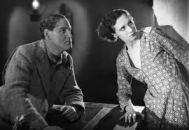 landscape of Dartmoor , one of the last British films
landscape of Dartmoor , one of the last British films  of the silent era and a virtuoso piece of film-making. Both screenings will be introduced by Laraine Porter of De Montford University and accompanied live by renowned silent film musician Stephen Horne.
of the silent era and a virtuoso piece of film-making. Both screenings will be introduced by Laraine Porter of De Montford University and accompanied live by renowned silent film musician Stephen Horne.
Full details of these screenings in the October and November listings pages ofsilentfilmcalendar.org.
15 October
Some silent thrills for Halloween As the nights draw in and Halloween looms, silent film programmers across the country are doing their best to crank  up the scares and thrills as the witching hour approaches. On 26th October, perennial horror favourite Nosferatu ((Dir. F W Murnau, Ger, 1922) screens at LSO St Lukes in London with live accompaniment from
up the scares and thrills as the witching hour approaches. On 26th October, perennial horror favourite Nosferatu ((Dir. F W Murnau, Ger, 1922) screens at LSO St Lukes in London with live accompaniment from  musicians The Cabinet of Living Cinema. Acclaimed silent film accompanists Minima will be playing along to shocker Phantom of the Opera (Dir. Rupert Julian, USA, 1925) at Bristol’s Wardrobe Theatre on 27th and 28th October. Meanwhile, the unsettling expressionist classic The Cabinet of Dr
musicians The Cabinet of Living Cinema. Acclaimed silent film accompanists Minima will be playing along to shocker Phantom of the Opera (Dir. Rupert Julian, USA, 1925) at Bristol’s Wardrobe Theatre on 27th and 28th October. Meanwhile, the unsettling expressionist classic The Cabinet of Dr 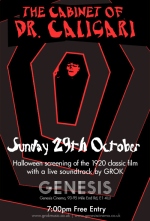 Caligari (Robert Wiene, Ger, 1920) is being screened at Sheffield’s Abbeydale Picture House on 27 October with music by the excellent Jonathan Best (piano) Trevor Bartlett (percussion) and Sam Gillies (electronics) and also at the Genesis Cinema in London on 29 October with music by experimental and improvisational group Grok. Finally, on Halloween
Caligari (Robert Wiene, Ger, 1920) is being screened at Sheffield’s Abbeydale Picture House on 27 October with music by the excellent Jonathan Best (piano) Trevor Bartlett (percussion) and Sam Gillies (electronics) and also at the Genesis Cinema in London on 29 October with music by experimental and improvisational group Grok. Finally, on Halloween 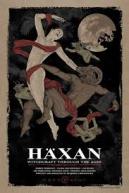 itself (31 Oct) the rarely seen but superb Haxan: Witchcraft Through the Ages ( (Dir. Benjamin Christensen, Swe., 1922) will be screened at the Phoenix Cinema in East Finchley. A fictionalized documentary with dramatic reconstructions documenting the evolution of witchcraft, it will be accompanied by live narration of the Swedish inter-titles by Reece Shearsmith (The League of Gentlemen, High Rise, A Field in England) while renowned silent film musician Stephen Horne. will be providing live musical accompaniment.
itself (31 Oct) the rarely seen but superb Haxan: Witchcraft Through the Ages ( (Dir. Benjamin Christensen, Swe., 1922) will be screened at the Phoenix Cinema in East Finchley. A fictionalized documentary with dramatic reconstructions documenting the evolution of witchcraft, it will be accompanied by live narration of the Swedish inter-titles by Reece Shearsmith (The League of Gentlemen, High Rise, A Field in England) while renowned silent film musician Stephen Horne. will be providing live musical accompaniment.
Full details of all of these screenings can be found in the October page of silentfilmcalendar.org or Click here
11 September
 A Soviet Western With Live Music By Hubby. Do you like westerns? Of course you do. Well what about Soviet westerns? If you haven’t seen such a thing then you could be in for a treat this autumn, because By the Law (Po Zakonu) is just such a film and its being
A Soviet Western With Live Music By Hubby. Do you like westerns? Of course you do. Well what about Soviet westerns? If you haven’t seen such a thing then you could be in for a treat this autumn, because By the Law (Po Zakonu) is just such a film and its being  screened across Scotland with live guitar accompaniment by Scottish singer/song-writer R M Hubbert (aka ‘Hubby’).
screened across Scotland with live guitar accompaniment by Scottish singer/song-writer R M Hubbert (aka ‘Hubby’).
Based on ‘The Unexpected’ a story by Jack London and directed by legendary Soviet film director Lev Kuleshov in 1926, it tells the story of three Yukon gold prospectors holed up in a cabin over the winter– one driven to murder by greed, the other two wrestling with whether to wait for the snow and ice to thaw and go for the authorities or to take the law into their own hands. Its a a claustrophobic drama of raw power, combining naturalism and the grotesque, realism and melodrama. R M Hubbert is a multi-award-winning Scottish performer who will be accompanying the film with his own score, commissioned especially for the film by the the Hippodrome Silent Film Festival in Bo’Ness. The film will be screened in Inverness, Orkney, Shetland, Glasgow, Edinburgh, Anstruther and Dunoon from the middle of September onwards. Full details as always in silentfilmcalendar’org’s listing pages.
take the law into their own hands. Its a a claustrophobic drama of raw power, combining naturalism and the grotesque, realism and melodrama. R M Hubbert is a multi-award-winning Scottish performer who will be accompanying the film with his own score, commissioned especially for the film by the the Hippodrome Silent Film Festival in Bo’Ness. The film will be screened in Inverness, Orkney, Shetland, Glasgow, Edinburgh, Anstruther and Dunoon from the middle of September onwards. Full details as always in silentfilmcalendar’org’s listing pages.
25 August
 A Big Screen Cinema Release for Fritz Lang’s Metropolis. After last year’s successful cinema screenings across the country for Abel Gance’s epic Napoleon (1927), followed by the nationwide cinema release given by distributors Eureka Video this year to Fritz Lang’s early but little known work Der Mude Tod (1921) news now comes that Eureka have
A Big Screen Cinema Release for Fritz Lang’s Metropolis. After last year’s successful cinema screenings across the country for Abel Gance’s epic Napoleon (1927), followed by the nationwide cinema release given by distributors Eureka Video this year to Fritz Lang’s early but little known work Der Mude Tod (1921) news now comes that Eureka have  decided to give Lang’s 1927 classic Metropolis its own cinema release to mark the 90th anniversary of the film’s original screening.
decided to give Lang’s 1927 classic Metropolis its own cinema release to mark the 90th anniversary of the film’s original screening.
With its dizzying depiction of a futuristic cityscape and alluring female robot, Metropolis needs absolutely no introduction and is among the most famous of all German films and the mother of science-fiction cinema (an influence on Blade Runner (1982) and Star Wars (1977), among countless other films). With jaw-dropping production values, iconic imagery, and modernist grandeur – it was described by Luis Buñuel as “a captivating symphony of movement” – the 
 film remains as powerful as ever, and the cinema remains to only place to appreciate it in all its glory.
film remains as powerful as ever, and the cinema remains to only place to appreciate it in all its glory.
Screenings announced in England so far include London, Brighton, Manchester, Halifax, York, Norwich, Brighton and Oswestry as well as Bo’Ness and Edinburgh in Scotland. Several of the screenings come with live musical accompaniment. Further screenings are to be announced with full details available here and of course within silentfilmcalendar.org’s listing pages.
11 August
First Programme Details of British Silent Film Festival Announced. Details have just been released of the programme highlights for this year’s British Silent Film Festival, due to take place at the Phoenix Cinema in Leicester from 13-17 September. The Festival begins with an Edgar Allan  Poe programme at the wonderfully atmospheric St Mary de Castro Church with live music played on the church organ. The horror theme is picked up with Carl Dreyer’s Vampyr with Minima performing their highly acclaimed music score live.
Poe programme at the wonderfully atmospheric St Mary de Castro Church with live music played on the church organ. The horror theme is picked up with Carl Dreyer’s Vampyr with Minima performing their highly acclaimed music score live.
Britain’s most popular female star of the 1920s, Betty Balfour features in two 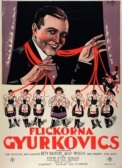 comedies A Sister of Six (Die sieben Töchter der Frau Gyurkovics), recently rediscovered in Sweden and Paradise set on the Cote d’Azure. Other comedies include a P.G. Wodehouse golf programme with readings from broadcaster Neil Brand and the rare Cocktails featuring
comedies A Sister of Six (Die sieben Töchter der Frau Gyurkovics), recently rediscovered in Sweden and Paradise set on the Cote d’Azure. Other comedies include a P.G. Wodehouse golf programme with readings from broadcaster Neil Brand and the rare Cocktails featuring  1920s favourites now forgotten, Pat and Patachon. The hilarious Hand’s Up is a must see comedy set in the American Civil War featuring the fabulous comedian Raymond Griffiths.
1920s favourites now forgotten, Pat and Patachon. The hilarious Hand’s Up is a must see comedy set in the American Civil War featuring the fabulous comedian Raymond Griffiths.
The hypnotic and lyrical qualities of silent film with live music are explored in our ‘slow silents’ programme of 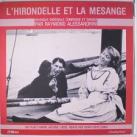 barge and canal films including the beautiful and touching L’Hirondelle et la Mesange set on two barges as they travel through a France recently devastated by WWI.
barge and canal films including the beautiful and touching L’Hirondelle et la Mesange set on two barges as they travel through a France recently devastated by WWI.
All silent films will be accompanied by leading silent cinema musicians including Neil Brand, Stephen Horne, Philip Carli, John Sweeney and joined by Elizabeth-Jane Baldry on Harp.
Full programme details will be included in silentfilmcalendar.org as soon as they are released. Further details of the festival can be found on Twitter @BritishSilentFF and (VERY reasonably priced) tickets can be purchased Here.
2 August
 The Dark Corners of Weimar in Dublin Wow, this almost slipped under our radar but we’ve just spotted a cracking good silent film season being screened at the Irish Film Institute in Dublin
The Dark Corners of Weimar in Dublin Wow, this almost slipped under our radar but we’ve just spotted a cracking good silent film season being screened at the Irish Film Institute in Dublin 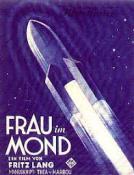 throughout August. Entitled Dark Corners: Cinema of the Weimar Republic, the season comprises an excellent collection of silents (and a couple of talkies) made during the years of the German Weimar Republic from 1919-33. Despite the significant political and economic difficulties Germany encountered during this period it was also a time of great cultural creativity. Cinema in particular flourished, as a generation of film-makers evolved whose technical and narrative
throughout August. Entitled Dark Corners: Cinema of the Weimar Republic, the season comprises an excellent collection of silents (and a couple of talkies) made during the years of the German Weimar Republic from 1919-33. Despite the significant political and economic difficulties Germany encountered during this period it was also a time of great cultural creativity. Cinema in particular flourished, as a generation of film-makers evolved whose technical and narrative  innovations marked this as a critical period in cinematic development.
innovations marked this as a critical period in cinematic development.
Although nearly all of the most significant directors of this era are represented, it is nice to see that one or two of their lesser known films are given a somewhat rare outing, rather than just their best known efforts. Thus from Lang we get the excellent Frau im Mond (1929) rather than Metropolis and from Murnau comes Faust (1926) rather than Caligari. There is a chance to see Lotte Reiniger’s feature length animation The Adventures of Prince Achmed (1926) and Ruttman’s classic Berlin:  Symphony of a Great City (1927). There is a little known Lubitsch, The Wild Cat (1921) and Dupont’s stunning Variety (1925). The talkies
Symphony of a Great City (1927). There is a little known Lubitsch, The Wild Cat (1921) and Dupont’s stunning Variety (1925). The talkies  include Pabst’s first sound film, the little known but recently re-released Westfront 1918 (1930) and Leontine Sagan’s cult classic Madchen in Uniform (1931).
include Pabst’s first sound film, the little known but recently re-released Westfront 1918 (1930) and Leontine Sagan’s cult classic Madchen in Uniform (1931).
A number of the films are being shown in 16mm and 35mm versions and several come with live musical accompaniment. There will also be a concluding discussion on Weimar cinema on 27 August, led by Stefan Drößler, the Director of the Munich Film Museum. All in all, a great month to be in Dublin. Full details are in silentfilmcalendar.org’s August listing pages.
26 July
 Silents at the Scalarama. The annual Scalarama Film Festival, which is due to take place at venues across the country throughout September, includes this year a varied and interesting selection of silent films. There are at least a dozen opportunities in London and nationwide to see
Silents at the Scalarama. The annual Scalarama Film Festival, which is due to take place at venues across the country throughout September, includes this year a varied and interesting selection of silent films. There are at least a dozen opportunities in London and nationwide to see 
 director Alex Barrett’s London Symphony, a 2017 addition to the genre of silent ‘City Symphony’ films. If you are lucky to be in West Yorkshire this is being complemented by the screening of two classics from the same genre, Berlin: Symphony of a Great City (Dir. Walter Ruttman, Ger, 1927) in Leeds and Man With A Movie Camera (Dir. Dziga Vertov, USSR, 1929) in Hebden Bridge. Also in Yorkshire, there is a screening of Pudovkin’s classic The End of St. Petersburg (Dir. Vsevolod Pudovkin, USSR, 1927) in Leeds and Metropolis (Dir. Fritz Lang, 1927) in Halifax. Lang’s dystopian masterpiece will also be screened in Brighton while in Bristol there will be an evening of early colourised
director Alex Barrett’s London Symphony, a 2017 addition to the genre of silent ‘City Symphony’ films. If you are lucky to be in West Yorkshire this is being complemented by the screening of two classics from the same genre, Berlin: Symphony of a Great City (Dir. Walter Ruttman, Ger, 1927) in Leeds and Man With A Movie Camera (Dir. Dziga Vertov, USSR, 1929) in Hebden Bridge. Also in Yorkshire, there is a screening of Pudovkin’s classic The End of St. Petersburg (Dir. Vsevolod Pudovkin, USSR, 1927) in Leeds and Metropolis (Dir. Fritz Lang, 1927) in Halifax. Lang’s dystopian masterpiece will also be screened in Brighton while in Bristol there will be an evening of early colourised  silent films together with a bit of a booze up to celebrate film pioneer William Friese-Green’s birth which will be accompanied by a selection of films inspired by his work. Last but by no means least, the epic Indian/German co-production A Throw Of
silent films together with a bit of a booze up to celebrate film pioneer William Friese-Green’s birth which will be accompanied by a selection of films inspired by his work. Last but by no means least, the epic Indian/German co-production A Throw Of  Dice (Dir. Franz Osten,1929) is due to be screened at a railway station in Liverpool!
Dice (Dir. Franz Osten,1929) is due to be screened at a railway station in Liverpool!
In another positive development, several of these films are being screened with live musical accompaniment. The final programme for Scalarama has not yet been fixed so there may be some further silent sceenings to be added. Details of all the existing and any further screenings can be found in the September listings section of silentfilmcalendar.org.
25 July
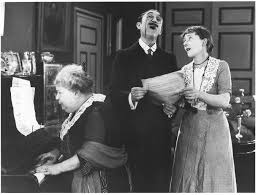 Classic British Silent Comedy Coming to BFI We wouldn’t normally use the news spot on silentfilmcalendar.org to highlight just a single showing of one silent film, preferring instead to leave that to our listings pages. But this has to be an exception. In September, BFI Southbank is showing, for one night only, a true classic of British silent comedy, Not For Sale (Dir. W P Kellino, 1924). ‘But I’ve never heard of that film’ we hear you all cry. Of course you haven’t. Normally it is locked deep in the bowels of the BFI’s National Film Archive, never to see the light of day, not on the BFI-player, not on DVD and certainly not ‘coming soon to a screen near you’! But very rarely this film manages to escape, although you have to be quick to catch it before it is consigned back to its underground lair.
Classic British Silent Comedy Coming to BFI We wouldn’t normally use the news spot on silentfilmcalendar.org to highlight just a single showing of one silent film, preferring instead to leave that to our listings pages. But this has to be an exception. In September, BFI Southbank is showing, for one night only, a true classic of British silent comedy, Not For Sale (Dir. W P Kellino, 1924). ‘But I’ve never heard of that film’ we hear you all cry. Of course you haven’t. Normally it is locked deep in the bowels of the BFI’s National Film Archive, never to see the light of day, not on the BFI-player, not on DVD and certainly not ‘coming soon to a screen near you’! But very rarely this film manages to escape, although you have to be quick to catch it before it is consigned back to its underground lair.
The film tells the story of a spoiled young aristocrat (Ian Hunter), cut off without a penny by his exasperated father and thereby forced to fend for himself. He finds accommodation in a Bloomsbury boarding house run by impoverished but attractive landlady Annie (Mary Odette, image left), who already has to cope with a house full of dysfunctional tenants, not to mention her devilish  little brother and stagestruck sister. Will love ever flourish on such a rocky path? We saw this film at the British Silent Film Festival in Leicester in 2015 and it didn’t so much have people chuckling in their seats as rolling in the aisles. But so it should have done given the pedigree of cast and crew.
little brother and stagestruck sister. Will love ever flourish on such a rocky path? We saw this film at the British Silent Film Festival in Leicester in 2015 and it didn’t so much have people chuckling in their seats as rolling in the aisles. But so it should have done given the pedigree of cast and crew.
Screenwriter Lydia Hayward was responsible for adapting many of the W W Jacobs stories directed by her one time husband H Manning Haynes. A regular feature at Kennington Bioscope festivals, these films (such as The Skipper’s Wooing (1922),  Head of the Family (1922, image right) and The Boatswain’s Mate (1924)) are just a sheer joy to watch. Not For Sale director Will Kellino was a former circus acrobat but had developed a sound reputation for screen comedy direction well before this film was made. Cast leads Hunter and Odette work well together but it is the supporting cast of silent British character acting stalwarts that make the film such a delight, including a young (-ish) Moore Marriot long before he became the grizzled Harbottle in many of Will Hay’s best films.
Head of the Family (1922, image right) and The Boatswain’s Mate (1924)) are just a sheer joy to watch. Not For Sale director Will Kellino was a former circus acrobat but had developed a sound reputation for screen comedy direction well before this film was made. Cast leads Hunter and Odette work well together but it is the supporting cast of silent British character acting stalwarts that make the film such a delight, including a young (-ish) Moore Marriot long before he became the grizzled Harbottle in many of Will Hay’s best films.
Not For Sale screens on 24 September at BFI Southbank’s Screen 3 so book your seats now. It may be the only chance you ever get to see this classic.
21 July
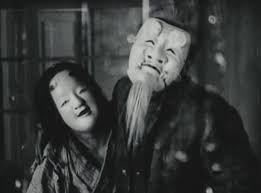 Help fund the screening of a Japanese silent classic. How do you fancy helping to fund not only a silent classic but also kick off a whole new Japanese film festival. The Japanese Avant-garde and Experimental Film Festival (JAEFF) is a new venture aiming to draw connections between classic 20th century Japanese Avant-garde Cinema and
Help fund the screening of a Japanese silent classic. How do you fancy helping to fund not only a silent classic but also kick off a whole new Japanese film festival. The Japanese Avant-garde and Experimental Film Festival (JAEFF) is a new venture aiming to draw connections between classic 20th century Japanese Avant-garde Cinema and 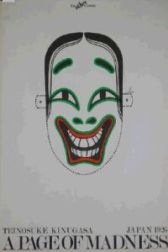 contemporary Japanese experimental film-making. For its launch event they are hoping to screen Teinosuke Kinugasa’s 1926 silent classic Kurutta Ippēji (A Page of Madness)
contemporary Japanese experimental film-making. For its launch event they are hoping to screen Teinosuke Kinugasa’s 1926 silent classic Kurutta Ippēji (A Page of Madness)
Considered lost for some 45 years, Kinugasa thankfully found the print in his garden shed in the early 1970s. Set in a psychiatric hospital, A Page of Madness is a visually stunning, and technically dazzling work of surrealism. The film contained no intertitles as it was intended to be exhibited with live narration delivered by a  benshi who would stand to the side of the screen and introduce and relate the story to the audience.
benshi who would stand to the side of the screen and introduce and relate the story to the audience.
The JAEFF hope to screen the film in London on 24 September (the 91st anniversary of the film’s theatrical release) . The plan is to screen a 35mm copy of the film with narration by an authentic Japanese benshi and live musical accompaniment by traditional Japanese musicians. But as with all such projects, funding is an issue. So they’ve launched a modest crowdfunding appeal to raise funds to fly in the film, the benshi and the musicians from Japan. If you’d like to contribute or simply find out a bit more click here.
20 July
 Classic Silents With Live Music At The Hippodrome. Those good folk at the Hippodrome Cinema in Bo’ness, responsible for bringing us HippFest, Scotland’s only festival of silent film, have put together a short series of classic silent films for the Autumn under the title ‘Taste of Silents’ all of which will be screened with live musical accompaniment. Kicking the series
Classic Silents With Live Music At The Hippodrome. Those good folk at the Hippodrome Cinema in Bo’ness, responsible for bringing us HippFest, Scotland’s only festival of silent film, have put together a short series of classic silent films for the Autumn under the title ‘Taste of Silents’ all of which will be screened with live musical accompaniment. Kicking the series  off is Fritz Lange’s science fiction classic Metropolis (Dir. Fritz Lange, Ger, 1927).
off is Fritz Lange’s science fiction classic Metropolis (Dir. Fritz Lange, Ger, 1927).
This stunning, landmark film is a dark vision of a futuristic city, divided between its upper-class, living luxuriously in skyscrapers high above ground, and a working-class endlessly toiling in squalor below the city. A major influence on Ridley Scott’s ‘Blade Runner’, George Lucas’ ‘Star Wars’, as well as pop culture – referenced by Madonna, Beyoncé, Janelle Monáe and countless others – Metropolis is  amongst the most iconic films of all time, a cinema classic which has more than stood the test of time.
amongst the most iconic films of all time, a cinema classic which has more than stood the test of time.
The film will be screened in its fully restored, 2010 version and musical accompaniment will be provided by DJ Vangelis Makriyannakis with a soundscape drawn from the vaults of kraut-electronica, industrial, minimalist electronics & post-rock. The film will be screened on 2 September.
Other films to be shown in this series are the haunting romantic drama Sunrise (Dir. F W Murnau, US, 1927) Harold Lloyd’s breath-taking, clock-face-hanging comedy Safety Last (Dir. Fred C Newmeyer/Sam Taylor, US, 1923) and Hitchcock’s suspenseful thriller Blackmail (Dir. Alfred Hitchcock, GB. 1929).
See silentfilmcalendar.org’s listings pages for further details as soon as we get them.
3 July
KenBio ‘Silent Laughter Saturday’ and Autumn Programme Make sure that you mark  down 11 November in your diaries as that is when the Kennington Bioscope will be staging its second ‘Silent Laughter Saturday’. The disappointing news is that they are reverting to their 2015 format of just a single day, unlike the silent laughter weekend held last year. But the good news is
down 11 November in your diaries as that is when the Kennington Bioscope will be staging its second ‘Silent Laughter Saturday’. The disappointing news is that they are reverting to their 2015 format of just a single day, unlike the silent laughter weekend held last year. But the good news is  that the programme still looks to be packed with goodies. As usual, acclaimed film historian Kevin Brownlow will be in attendance, introducing some of the screenings, including one said to be amongst Harold Lloyd’s personal favourites from his feature-length films, The Kid Brother (1927). In the film, Lloyd plays mild-mannered Harold Hickory, a feeble boy in an otherwise brawny family. When money goes
that the programme still looks to be packed with goodies. As usual, acclaimed film historian Kevin Brownlow will be in attendance, introducing some of the screenings, including one said to be amongst Harold Lloyd’s personal favourites from his feature-length films, The Kid Brother (1927). In the film, Lloyd plays mild-mannered Harold Hickory, a feeble boy in an otherwise brawny family. When money goes  missing and his father gets the blame, Harold has to use guile rather than muscle to find the real culprits and get the girl. Subject to confirmation, they also hope to present Max Linder’s rare 1919 French feature Le Petit Café in which Max plays a waiter who inherits two million francs. But he can’t quit his job because his uncle’s old servant has schemed with the cafe’s owner to get a cut of the money by binding him to a contract — Max must work at the cafe for 20 years; if he quits, he forfeits the inheritance. Another highlight will be the presence of American author and historian Anthony Slide, giving a talk – with clips – about the brilliant but sadly neglected comedienne Alice Howell, one of only a handful of silent comediennes who ventured into the “men’s terrain” of rough-house physical comedy and whose comedic skill was compared to that of Chaplin and Linder.
missing and his father gets the blame, Harold has to use guile rather than muscle to find the real culprits and get the girl. Subject to confirmation, they also hope to present Max Linder’s rare 1919 French feature Le Petit Café in which Max plays a waiter who inherits two million francs. But he can’t quit his job because his uncle’s old servant has schemed with the cafe’s owner to get a cut of the money by binding him to a contract — Max must work at the cafe for 20 years; if he quits, he forfeits the inheritance. Another highlight will be the presence of American author and historian Anthony Slide, giving a talk – with clips – about the brilliant but sadly neglected comedienne Alice Howell, one of only a handful of silent comediennes who ventured into the “men’s terrain” of rough-house physical comedy and whose comedic skill was compared to that of Chaplin and Linder.
 As well as their Silent Comedy Saturday, we also now have a first peak (subject to confirmation) at the regular Kennington
As well as their Silent Comedy Saturday, we also now have a first peak (subject to confirmation) at the regular Kennington  Bioscope autumn programme. Screenings between September and December will include ; The Goose Woman (1925) a Clarence Brown directed drama with Louise Dresser; Filibus (1915) a fantastic sounding Italian adventure story directed by Mario Roncoroni about a mysterious sky pirate, Cristina Ruspoli, who makes daring heists with her technologically advanced airship; Underworld (1927) a von Sternberg directed crime drama with George Bancroft and Evelyn Brent; The Last of the Mohicans (1920) an early adaption of the Fenimore-Cooper novel directed by Clarence Brown and Maurice Tourneur and starring Wallace Beery; Pavement Butterfly
Bioscope autumn programme. Screenings between September and December will include ; The Goose Woman (1925) a Clarence Brown directed drama with Louise Dresser; Filibus (1915) a fantastic sounding Italian adventure story directed by Mario Roncoroni about a mysterious sky pirate, Cristina Ruspoli, who makes daring heists with her technologically advanced airship; Underworld (1927) a von Sternberg directed crime drama with George Bancroft and Evelyn Brent; The Last of the Mohicans (1920) an early adaption of the Fenimore-Cooper novel directed by Clarence Brown and Maurice Tourneur and starring Wallace Beery; Pavement Butterfly  (aka Großstadtschmetterling) (1929) an Anglo-German drama directed by Richard Eichberg and starring the wonderful Anna May Wong and finally, Miss Bluebeard (1925) a comedy directed by Frank Tuttle and starring Bebe Daniels (who was last seen at Ken Bio in the excellent Feel My Pulse (1928)). All in all a pretty high quality programme with some real rarities, almost looking forward to the autumn nights drawing in and the programme kicking off. Further details in the listing pages as soon as we get them.
(aka Großstadtschmetterling) (1929) an Anglo-German drama directed by Richard Eichberg and starring the wonderful Anna May Wong and finally, Miss Bluebeard (1925) a comedy directed by Frank Tuttle and starring Bebe Daniels (who was last seen at Ken Bio in the excellent Feel My Pulse (1928)). All in all a pretty high quality programme with some real rarities, almost looking forward to the autumn nights drawing in and the programme kicking off. Further details in the listing pages as soon as we get them.
6 June
 June Turning into Der Müde Tod -Fest Month! Full marks to Eureka Video for their bold decision to give a cinema release to the newly-restored version of Fritz Lange’s early work Der Müde Tod (1921). Whilst this film has often been overlooked even amongst Lange’s earlier work, it is a work rich in expressionist imagery and featuring innovative special effects. It has been hugely influential, with directors such as Alfred Hitchcock, Ingmar Bergman and Luis Buñuel citing it as a direct influence on their own work. And the good news is that cinemas have not been slow in taking up the opportunity to screen the film, many of them planning to show it over multiple days. The
June Turning into Der Müde Tod -Fest Month! Full marks to Eureka Video for their bold decision to give a cinema release to the newly-restored version of Fritz Lange’s early work Der Müde Tod (1921). Whilst this film has often been overlooked even amongst Lange’s earlier work, it is a work rich in expressionist imagery and featuring innovative special effects. It has been hugely influential, with directors such as Alfred Hitchcock, Ingmar Bergman and Luis Buñuel citing it as a direct influence on their own work. And the good news is that cinemas have not been slow in taking up the opportunity to screen the film, many of them planning to show it over multiple days. The  film opened on 4 June at the Curzon Soho in London but goes on wider release both in London and across the country from 9 June.
film opened on 4 June at the Curzon Soho in London but goes on wider release both in London and across the country from 9 June.
The result is that we already have over sixty screenings 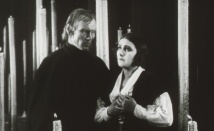 scheduled for Der Müde Tod in June alone with more to come in the following month. And while such a release may not perhaps rival your average Hollywood blockbuster it is nevertheless fairly amazing for a film made almost a hundred years ago. Here’s hoping that it proves a success and, along with last year’s equally successful cinema release for Able Gance’s Napoleon (1927), sets a further precedent for the wider scale cinema release of other silent films.
scheduled for Der Müde Tod in June alone with more to come in the following month. And while such a release may not perhaps rival your average Hollywood blockbuster it is nevertheless fairly amazing for a film made almost a hundred years ago. Here’s hoping that it proves a success and, along with last year’s equally successful cinema release for Able Gance’s Napoleon (1927), sets a further precedent for the wider scale cinema release of other silent films.
Full details of these screenings are in silentfilmcalendar.org’s listing pages.
2 June
 Blue Plaque Unveiling for Charlie (and Sydney) Chaplin. On 14 June, English Heritage will unveil a blue plaque at Glenshaw Mansions on Brixton Road to commemorate the time that brothers Charlie and Sydney Chaplin spent living there between 1908 and 1910. All are welcome at the unveiling at 2pm and are encouraged to
Blue Plaque Unveiling for Charlie (and Sydney) Chaplin. On 14 June, English Heritage will unveil a blue plaque at Glenshaw Mansions on Brixton Road to commemorate the time that brothers Charlie and Sydney Chaplin spent living there between 1908 and 1910. All are welcome at the unveiling at 2pm and are encouraged to  dress up as Chaplin’s iconic Tramp character. The unveiling will be followed by a special screening of three of Chaplin’s short films. Comedian Paul Merton will introduce Kid Auto Races at Venice (1914), The Pawnshop (1916) and A Dog’s Life (1918) at the Ritzy Cinema in Brixton. The first two films will feature live accompaniment. Full details of these screenings are in silentfilmcalendar.org’s June listing page
dress up as Chaplin’s iconic Tramp character. The unveiling will be followed by a special screening of three of Chaplin’s short films. Comedian Paul Merton will introduce Kid Auto Races at Venice (1914), The Pawnshop (1916) and A Dog’s Life (1918) at the Ritzy Cinema in Brixton. The first two films will feature live accompaniment. Full details of these screenings are in silentfilmcalendar.org’s June listing page
24 May
 A Couple of Ukrainian Silent Rarities in Town. Ukrainian silent films are a bit like London buses, you wait ages for one and then two show up almost at once. But, hey, who’s complaining when both are rarely seen pieces. Over the next couple of weeks, the Ukrainian Institute in London is putting on events to mark A Century of Ukrainian Revolutions: 1917-2017. Included in these will be the screening of two little known silent films, both made in 1929 in what was then the Ukrainian Republic of the USSR.
A Couple of Ukrainian Silent Rarities in Town. Ukrainian silent films are a bit like London buses, you wait ages for one and then two show up almost at once. But, hey, who’s complaining when both are rarely seen pieces. Over the next couple of weeks, the Ukrainian Institute in London is putting on events to mark A Century of Ukrainian Revolutions: 1917-2017. Included in these will be the screening of two little known silent films, both made in 1929 in what was then the Ukrainian Republic of the USSR.
 The first of these, Shkurnik (aka A Profiteer, aka The Self-Seeker) (Dir. Nikolai Shpikovsky, Ukr/USSR, 1929) is being screened on 30 May. It is virtually unknown in the West and charts the efforts of an opportunistic Kiev resident to avoid the unrest of civil war and yet still prosper under Bolshevik rule. Being a biting satire on the Soviet propaganda the film was quickly banned by the Soviet authorities.
The first of these, Shkurnik (aka A Profiteer, aka The Self-Seeker) (Dir. Nikolai Shpikovsky, Ukr/USSR, 1929) is being screened on 30 May. It is virtually unknown in the West and charts the efforts of an opportunistic Kiev resident to avoid the unrest of civil war and yet still prosper under Bolshevik rule. Being a biting satire on the Soviet propaganda the film was quickly banned by the Soviet authorities.
 The second film, due to be screened on 7 June, is In Spring (Dir. Mikhail Kaufman, Ukr/USSR, 1929) This was Kaufman’s first solo project after creative differences forced a split with his brother Dziga Vertov following their collaborative work on Man with A Movie Camera (1929). The film takes the form of a cinematic poem to the arrival of spring in nature as well as a new era in society and offers a rare glimpse of everyday life in the Soviet Ukraine during the New Economic Policy era and the Soviet “indigenisation” programme.
The second film, due to be screened on 7 June, is In Spring (Dir. Mikhail Kaufman, Ukr/USSR, 1929) This was Kaufman’s first solo project after creative differences forced a split with his brother Dziga Vertov following their collaborative work on Man with A Movie Camera (1929). The film takes the form of a cinematic poem to the arrival of spring in nature as well as a new era in society and offers a rare glimpse of everyday life in the Soviet Ukraine during the New Economic Policy era and the Soviet “indigenisation” programme.
Both films will be accompanied by interesting looking lectures. Shkurnik comes with Slavic Studies academic Professor Mark von Hagen speaking on ‘Why the Ukrainian Revolution Matters for Historians of the  Russian Revolutions’ while In Spring is accompanied by Stanislav Menzelevskyi, a Programme Director from the Oleksandr Dovzhenko National Centre which is the centre for the preservation and restoration of, and research into, Ukrainian film history.
Russian Revolutions’ while In Spring is accompanied by Stanislav Menzelevskyi, a Programme Director from the Oleksandr Dovzhenko National Centre which is the centre for the preservation and restoration of, and research into, Ukrainian film history.
Full details of both screenings can be found in silentfilmcalendar.org’s listing pages.
23 May
 That Rare Thing, A Brand New Silent Film. Yes, on 3rd September a brand new silent film is set for release. And not only is the film being released in London but it is also a celebration of London. The film is London Symphony (Dir. Alex Barrett, UK, 2017) and is a contemporary take on the ‘city symphony’, a genre of creative non-fiction film that
That Rare Thing, A Brand New Silent Film. Yes, on 3rd September a brand new silent film is set for release. And not only is the film being released in London but it is also a celebration of London. The film is London Symphony (Dir. Alex Barrett, UK, 2017) and is a contemporary take on the ‘city symphony’, a genre of creative non-fiction film that  flourished in the 1920s and that sought to present poetic portraits of city life. Examples include Manhatta (Dir. Charles Sheeler, US, 1921, image left) featuring Manhattan and Rien que les Heures (aka Nothing but the Hours) (Dir. Alberto Cavalcanti, Fr, 1926) focusing on Paris. Such films often took a strongly avant-garde or experimental approach, for example in Rain (Dir. Mannus Franken/Joris Ivens, Neth, 1929, image right) with the depiction of rainstorms in Amsterdam and the
flourished in the 1920s and that sought to present poetic portraits of city life. Examples include Manhatta (Dir. Charles Sheeler, US, 1921, image left) featuring Manhattan and Rien que les Heures (aka Nothing but the Hours) (Dir. Alberto Cavalcanti, Fr, 1926) focusing on Paris. Such films often took a strongly avant-garde or experimental approach, for example in Rain (Dir. Mannus Franken/Joris Ivens, Neth, 1929, image right) with the depiction of rainstorms in Amsterdam and the 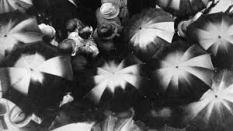 unfurling of umbrellas presenting an almost cubist image while Man with A Movie Camera (Dir. Dziga Vertov, USSR, 1929) and its depiction of Moscow and Odessa was a veritable showcase for experimental film-making
unfurling of umbrellas presenting an almost cubist image while Man with A Movie Camera (Dir. Dziga Vertov, USSR, 1929) and its depiction of Moscow and Odessa was a veritable showcase for experimental film-making  techniques. For an interesting write-up on the city symphony genre, see sensesofcinema.com. Perhaps the most famous of these city symphonies was Berlin: Symphony of a Metropolis (Dir. Walter Ruttman, Ger, 1927) and it is in homage to this film that director Alex Barrett has chosen to time the release of London Symphony to coincide with the 90th anniversary of the first screening of Ruttmann’s film.
techniques. For an interesting write-up on the city symphony genre, see sensesofcinema.com. Perhaps the most famous of these city symphonies was Berlin: Symphony of a Metropolis (Dir. Walter Ruttman, Ger, 1927) and it is in homage to this film that director Alex Barrett has chosen to time the release of London Symphony to coincide with the 90th anniversary of the first screening of Ruttmann’s film.
On the 3rd of September London Symphony will be screened at the Barbican as part of that venue’s ‘Silent Film and Live Music’ series. The film will be accompanied by the premier of a newly composed score by composer James McWilliam, performed by the Orchestra of St Paul‘s led by conductor Ben Palmer. There will also be a screening at the Cinema Museum in Lambeth on 29th September after-which the film will tour around a number of carefully selected venues throughout the UK, including conventional cinema spaces and alternative spaces such as a parish church and a Buddhist meditation centre. The film will also be released internationally later in the year through distributors Flicker Alley.
Full details of all London Symphony screenings will of course be detailed in silentfilmcalendar.org
17 May
 An Actual Opera House Screening for Phantom of the Opera (1925). Yes, Rupert Julian’s 1925 shocker, Phantom of the Opera, starring that master of disguise Lon Chaney is to be screened later this year in an actual opera
An Actual Opera House Screening for Phantom of the Opera (1925). Yes, Rupert Julian’s 1925 shocker, Phantom of the Opera, starring that master of disguise Lon Chaney is to be screened later this year in an actual opera  house. And not just any old opera house, but at one of the grandest operatic venues of all, the London Coliseum, home of the English National Opera. Although not the first film adaption of Gaston Leroux’s 1910 novel Le Fantôme de l’Opéra (that honour goes to a 1916 Danish version directed by Ernst Matray and now considered a lost film) Julian’s 1925 version remains the standard by which others are judged. Forget the tepid Lloyd Weber musical, the laughable 1962 Hammer reworking with Herbert Lom or even the hopelessly un-scary 1943 Hollywood effort with Claude Rains, it is Chaney that gives
house. And not just any old opera house, but at one of the grandest operatic venues of all, the London Coliseum, home of the English National Opera. Although not the first film adaption of Gaston Leroux’s 1910 novel Le Fantôme de l’Opéra (that honour goes to a 1916 Danish version directed by Ernst Matray and now considered a lost film) Julian’s 1925 version remains the standard by which others are judged. Forget the tepid Lloyd Weber musical, the laughable 1962 Hammer reworking with Herbert Lom or even the hopelessly un-scary 1943 Hollywood effort with Claude Rains, it is Chaney that gives 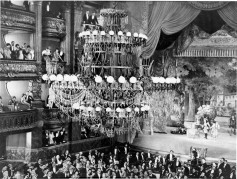 the phantom real menace. Universal producer Carl Laemmle was apparently hooked on first reading Leroux’s novel during a visit to Paris and immediately brought the rights. No expense was spared during the film’s production, including
the phantom real menace. Universal producer Carl Laemmle was apparently hooked on first reading Leroux’s novel during a visit to Paris and immediately brought the rights. No expense was spared during the film’s production, including  the construction of a 5000-seat opera house on the Universal set (which survived until 2014). But despite the big budget, the film suffered not one but two disastrous preview screenings, each resulting in a change of director, re-shooting of scenes and re-editing, with Lois Weber eventually having a major input to the final look of the film which subsequently proved a box-office and critical success.
the construction of a 5000-seat opera house on the Universal set (which survived until 2014). But despite the big budget, the film suffered not one but two disastrous preview screenings, each resulting in a change of director, re-shooting of scenes and re-editing, with Lois Weber eventually having a major input to the final look of the film which subsequently proved a box-office and critical success.
 But the screening of Phantom of the Opera at the London Coliseum is just half the story. The film is also to be accompanied by the world premiere of a new score, written by jazz musician and composer Roy Budd and performed by the Docklands Sinfonia Orchestra, conducted by Spencer Down. Roy Budd was a world-renowned composer with some 40 film scores to his name including Soldier
But the screening of Phantom of the Opera at the London Coliseum is just half the story. The film is also to be accompanied by the world premiere of a new score, written by jazz musician and composer Roy Budd and performed by the Docklands Sinfonia Orchestra, conducted by Spencer Down. Roy Budd was a world-renowned composer with some 40 film scores to his name including Soldier  Blue (1970), Get Carter (1971), Man at the Top (1973), Wild Geese (1978). Producing a new score for Phantom of the Opera was a long-cherished project which also saw him acquire and restore a 35mm print of the film. He completed a full orchestral score for the film using an 84-piece orchestra and recorded this with the Luxembourg Symphony Orchestra. In 1993, with five weeks to go before a London premiere and European tour, Roy Budd suffered a brain haemorrhage and passed away at just 46 years of age.
Blue (1970), Get Carter (1971), Man at the Top (1973), Wild Geese (1978). Producing a new score for Phantom of the Opera was a long-cherished project which also saw him acquire and restore a 35mm print of the film. He completed a full orchestral score for the film using an 84-piece orchestra and recorded this with the Luxembourg Symphony Orchestra. In 1993, with five weeks to go before a London premiere and European tour, Roy Budd suffered a brain haemorrhage and passed away at just 46 years of age.
 Now, 24 years later The London Coliseum will host the first ever live performance of the new score accompanying the film. According to those that have heard it, it is arguably Budd’s greatest achievement: a grand soundtrack for full orchestra with several themes and leitmotifs that pay tribute to the great composers of the concert hall and screen, while at the same time unmistakably the work of its inspired creator.
Now, 24 years later The London Coliseum will host the first ever live performance of the new score accompanying the film. According to those that have heard it, it is arguably Budd’s greatest achievement: a grand soundtrack for full orchestra with several themes and leitmotifs that pay tribute to the great composers of the concert hall and screen, while at the same time unmistakably the work of its inspired creator.
You will be able to judge for yourself when the Phantom of the Opera and its new score are premiered on 8 October this year (Details here). Our only niggle is that screening the film in an opera house is inevitably accompanied by opera house pricing. So, for those unable to afford £112 for a seat in the stalls, it is to be hoped that this screening will eventually be followed by a release on disc.
16 May
 Half Time at The Yorkshire Silent Film Festival. It looks like this year’s Yorkshire Silent Film Festival is shaping up to surpass last year’s inaugural event. The opening night screening of Hitchcock’s The Lodger (1926, left) featuring the world premiere of a new score composed by Neil Brand got
Half Time at The Yorkshire Silent Film Festival. It looks like this year’s Yorkshire Silent Film Festival is shaping up to surpass last year’s inaugural event. The opening night screening of Hitchcock’s The Lodger (1926, left) featuring the world premiere of a new score composed by Neil Brand got  excellent reviews (see here) as did the rest of the first weekend of screenings at the Abbeydale Cinema in Sheffield (see here). Other notable screenings during the first half of the festival included Boris Barnet’s superb comedy Girl With A Hat Box (1927) with the sublime Anna Sten (right), the somewhat more bizarre Man Without Desire (1923) with
excellent reviews (see here) as did the rest of the first weekend of screenings at the Abbeydale Cinema in Sheffield (see here). Other notable screenings during the first half of the festival included Boris Barnet’s superb comedy Girl With A Hat Box (1927) with the sublime Anna Sten (right), the somewhat more bizarre Man Without Desire (1923) with  Ivor Novello, that original Hollywood epic Ben Hur (1925) and the one I really regretted not being able to get up to Yorkshire to see, Dragnet Girl (1933), Japanese director Ozu’s film noir gangster
Ivor Novello, that original Hollywood epic Ben Hur (1925) and the one I really regretted not being able to get up to Yorkshire to see, Dragnet Girl (1933), Japanese director Ozu’s film noir gangster  classic (left) screened with a new harp score by Elizabeth Jane Baldry.
classic (left) screened with a new harp score by Elizabeth Jane Baldry.
The second half of the month offers a second chance to catch up with some of these classics (but sadly no second chance for Dragnet Girl!) as well as offering some superb new screenings including another classic Barnet comedy, The House on Trubnaya (1928), the rarely screened British thriller The Four Just Men (1921), and the equally rare Danish melodrama  The Golden Clown (1926) before concluding with The Woman Men Desire (1929), with Marlene Dietrich (right) perfecting her femme fatale persona well in advance of her appearing in Sternberg’s The Blue Angel (1930).
The Golden Clown (1926) before concluding with The Woman Men Desire (1929), with Marlene Dietrich (right) perfecting her femme fatale persona well in advance of her appearing in Sternberg’s The Blue Angel (1930).
Full details of all Yorkshire Silent Film Festival screenings can be found here
30 April
 Der Müde Tod (1921) – Screening Details Revealed Back in February, we reported that restoration of the 1921 Fritz Lange film Der Müde Tod (aka Destiny, aka Behind the Wall) had been completed and, as well as a DVD/Blu-Ray release, the film was going on release at UK and Irish cinemas. Details of the cinema screenings have now been released. The film will be screened at the Curzon Soho for one night only on June 4 and will then go on wider release on 9 June at the BFI Southbank (for 14 days), Curzon Bloomsbury (for 7 days), Home Manchester (for 7 days), Filmhouse
Der Müde Tod (1921) – Screening Details Revealed Back in February, we reported that restoration of the 1921 Fritz Lange film Der Müde Tod (aka Destiny, aka Behind the Wall) had been completed and, as well as a DVD/Blu-Ray release, the film was going on release at UK and Irish cinemas. Details of the cinema screenings have now been released. The film will be screened at the Curzon Soho for one night only on June 4 and will then go on wider release on 9 June at the BFI Southbank (for 14 days), Curzon Bloomsbury (for 7 days), Home Manchester (for 7 days), Filmhouse 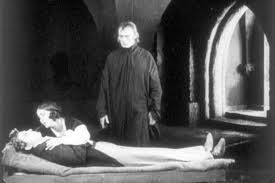 Edinburgh (for 4 days) and at the Film Theatre, Glasgow and the Irish Film Institute, Dublin (for a period to be confirmed).
Edinburgh (for 4 days) and at the Film Theatre, Glasgow and the Irish Film Institute, Dublin (for a period to be confirmed).
Although Lange is probably better known for his later cinematic masterpieces such as Metropolis (1927), Spione (1928) and M (1931), while Der Müde Tod has often been overlooked even amongst his earlier work, it is a film rich in expressionist imagery and featuring innovative special effects work. It has been hugely influential, with directors such as Alfred Hitchcock, Ingmar Bergman and Luis Buñuel citing it as a direct influence on their own work. As a result, this release provides a welcome opportunity for a wider audience to catch up with what has until 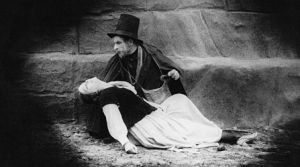 now been a little seen but important example of Lange’s work. The only somewhat disappointing aspect is the BFI Screening. Although the film will be shown some 30 times over 14 days, all of the screenings will be in the smaller NFT2 or 3 screens or in the tiny Studio screen. Its a shame that they couldn’t have found even just a single slot in NFT1 to show the film on a big screen or even laid on at least one screening with live musical accompaniment rather than having to rely on the recorded soundtrack for every showing. Something of a missed opportunity!
now been a little seen but important example of Lange’s work. The only somewhat disappointing aspect is the BFI Screening. Although the film will be shown some 30 times over 14 days, all of the screenings will be in the smaller NFT2 or 3 screens or in the tiny Studio screen. Its a shame that they couldn’t have found even just a single slot in NFT1 to show the film on a big screen or even laid on at least one screening with live musical accompaniment rather than having to rely on the recorded soundtrack for every showing. Something of a missed opportunity!
Full details of all the screenings are in silentfilmcalendar.org‘s listings pages.
21 April
 London’s Hollywood E17 – Blue Plaque Unveiling 1st May Just a quick reminder that if you want to be a part of some film history in the making then head along to Walthamstow on 1st May when actor Paul McGann (Withnail & I, Doctor Who, The Monocled Mutineer) will be unveiling a blue plaque at the site of the former Precision Film Studios. The unveiling will take plae at Noon on 1st May in Wood Street Walthamstow, now Beuleigh Court, Wood Street E17 3PA and situated on the junction of Wood Street and Lea Bridge Road, close to the Whipps Cross roundabout.
London’s Hollywood E17 – Blue Plaque Unveiling 1st May Just a quick reminder that if you want to be a part of some film history in the making then head along to Walthamstow on 1st May when actor Paul McGann (Withnail & I, Doctor Who, The Monocled Mutineer) will be unveiling a blue plaque at the site of the former Precision Film Studios. The unveiling will take plae at Noon on 1st May in Wood Street Walthamstow, now Beuleigh Court, Wood Street E17 3PA and situated on the junction of Wood Street and Lea Bridge Road, close to the Whipps Cross roundabout.
Precision Studios was a pioneer of the British film industry in the early part of the last century. Between 1910 and 1926, 400 silent films were made by four film studios in Walthamstow , including the 1916 classic The Battle of the Somme. Many important actors first appeared in Walthamstow films including Victor Mclaglen, a John Ford stalwart who went on to win an Oscar for his role in The Informer and the famous Hollywood star Ronald Colman also launched his career was at Broadwest films.
17 April
KenBio Silent Film Weekend – Programme Details The third annual Kennington Bioscope Silent Film Weekend is scheduled to take place on 10-11 June at the Cinema Museum in Lambeth, London. Details of the provisional programme have just been released  and as is the KenBio’s tradition the line-up focuses upon the rare, the unusual and the infrequently screened.
and as is the KenBio’s tradition the line-up focuses upon the rare, the unusual and the infrequently screened.
Highlights of the Saturday programme include; Are Parents People (Dir. Mal St. Clair, 1925) a Betty Bronson comedy in which she tries to prevent her  parent’s divorce by giving them something bigger to worry about; Grass: A Nation’s Battle for Life (Dir. Cooper/ Schoedsack , 1925) a Nanook of the North style anthropological/travelogue documentary about rural life in Iran; Maria Marten (Dir. Walter West, 1928) an oft-filmed story based upon the real life Red Barn murder case of the 1920s; and The Wonderful Lies of Nina Petrovna (Dir. Hanns Schwarz, 1929) a little-seen German
parent’s divorce by giving them something bigger to worry about; Grass: A Nation’s Battle for Life (Dir. Cooper/ Schoedsack , 1925) a Nanook of the North style anthropological/travelogue documentary about rural life in Iran; Maria Marten (Dir. Walter West, 1928) an oft-filmed story based upon the real life Red Barn murder case of the 1920s; and The Wonderful Lies of Nina Petrovna (Dir. Hanns Schwarz, 1929) a little-seen German  romantic melodrama with Metropolis star Brigitte Helm (left). Also being screened are French shorts from Renoir, Clair and Dulac, together with an early Walt Disney cartoon The Four Musicians of Bremen from 1922.
romantic melodrama with Metropolis star Brigitte Helm (left). Also being screened are French shorts from Renoir, Clair and Dulac, together with an early Walt Disney cartoon The Four Musicians of Bremen from 1922.
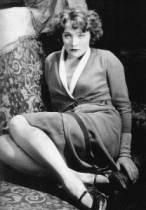 The Sunday programme includes; The Safety Curtain (Dir. Sidney A. Franklin, 1919) a romantic melodrama of epic proportions starring Norma Talmadge; Kipps (Dir. Harold Shaw, 1921) an early adaption of the H G Wells novel; The Three Lovers (Dir. Curtis Bernhard, 1929) starring Marlene Dietrich (right) at her femme fatale best; Feel My Pulse (Dir. Gregory La Cava, 1926) a sparkling comedy about an inherited health sanatorium and rum-runners starring Bebe Daniels and William Powell; and The Unholy Three (Dir. Tod Browning 1925) a seriously odd film
The Sunday programme includes; The Safety Curtain (Dir. Sidney A. Franklin, 1919) a romantic melodrama of epic proportions starring Norma Talmadge; Kipps (Dir. Harold Shaw, 1921) an early adaption of the H G Wells novel; The Three Lovers (Dir. Curtis Bernhard, 1929) starring Marlene Dietrich (right) at her femme fatale best; Feel My Pulse (Dir. Gregory La Cava, 1926) a sparkling comedy about an inherited health sanatorium and rum-runners starring Bebe Daniels and William Powell; and The Unholy Three (Dir. Tod Browning 1925) a seriously odd film  about a crime trio (left) comprising ventriloquist, circus strongman and midget who set about selling parrots, it naturally stars Lon Chaney! Also being screened are a series of comedy shorts featuring female stars Florence Turner, Henny Porten and Viola Dana.
about a crime trio (left) comprising ventriloquist, circus strongman and midget who set about selling parrots, it naturally stars Lon Chaney! Also being screened are a series of comedy shorts featuring female stars Florence Turner, Henny Porten and Viola Dana.
As always with the KenBio, the emphasis will be on 35/16mm projection, with films coming from both the BFI and Kevin Brownlow’s own collection. Kevin will also be providing the introductions along with Tony Fletcher and the BFI’s Bryony Dixon. The films with have live piano accompaniment by the country’s leading silent film musicians. All in all, a weekend to look forward too. Watch out for full details appearing shortly on our listings pages.
1 April
 Yorkshire Silent Film Festival – 2017 Programme. Full programme details have now been released for the second annual Yorkshire Silent Film Festival. Building on the success of last year’s event, this year’s programme features 37 screenings spread across the county throughout the month of May. The various screenings include both British and international pictures, comedies, melodramas, thrillers and animation. As well as popular
Yorkshire Silent Film Festival – 2017 Programme. Full programme details have now been released for the second annual Yorkshire Silent Film Festival. Building on the success of last year’s event, this year’s programme features 37 screenings spread across the county throughout the month of May. The various screenings include both British and international pictures, comedies, melodramas, thrillers and animation. As well as popular  classics, there are a number of little seen titles getting a rare outing. British thrillers Blackmail (1929) and The Lodger (1927) are to the fore. Hollywood gets a look-in with the likes of Ben Hur (1925), Chicago
classics, there are a number of little seen titles getting a rare outing. British thrillers Blackmail (1929) and The Lodger (1927) are to the fore. Hollywood gets a look-in with the likes of Ben Hur (1925), Chicago (1927) and 7th Heaven (1927) while Gilbert and Garbo also feature in Flesh and the Devil (1926) and Buster Keaton is represented by Sherlock Jr (1924) and The Cameraman (1928). But of perhaps more interest are some of the rarities. Japanese master director Yasujiro Ozu’s classic crime drama Dragnet Girl
(1927) and 7th Heaven (1927) while Gilbert and Garbo also feature in Flesh and the Devil (1926) and Buster Keaton is represented by Sherlock Jr (1924) and The Cameraman (1928). But of perhaps more interest are some of the rarities. Japanese master director Yasujiro Ozu’s classic crime drama Dragnet Girl  (1933) gets a rare screening as do two simply delightful comedies from Russian director Boris Barnet, Girl With A Hat Box (1927) and House on Trubnaya (1928), both of which are just a joy to watch. A little known but apparently well-regarded Danish
(1933) gets a rare screening as do two simply delightful comedies from Russian director Boris Barnet, Girl With A Hat Box (1927) and House on Trubnaya (1928), both of which are just a joy to watch. A little known but apparently well-regarded Danish  melodrama The Golden Clown (1926) looks particularly intriguing while a newly re-edited and restored print of Behind The Door (1919), possibly the ‘darkest’ silent film you will ever see, gets only its third UK screening. And there is much else besides.
melodrama The Golden Clown (1926) looks particularly intriguing while a newly re-edited and restored print of Behind The Door (1919), possibly the ‘darkest’ silent film you will ever see, gets only its third UK screening. And there is much else besides.
As with last year the emphasis will be on screenings of 35mm prints and all of the films come with live musical accompaniment from a range of top-notch accompanists. So clearly May is a great month to be in Yorkshire but even if you can’t get to see everything there is at least something to see for everyone here. Full programme details can be found at the festival website here or on the silentfilmcalendar.org May listing page here.
9 March
A Silent Marathon At The Flatpack Festival Details have now been revealed of further silent film screenings scheduled for this year’s Flatpack Film Festival in Birmingham, running from 4-9 April. Screenings already announced include a look at the work of Spanish film pioneer Segundo de Chomon whose quite brilliant films have been largely overshadowed by those of his better known contemporary Georges Méliès as well as Around China With A Movie Camera, a compilation of some of the oldest surviving film shot in China – much of it unseen for 115 years. Newly announced additions to the programme include that rarity, a modern silent called The Red Turtle, a beautifully drawn wordless animation. Also being screened is the Frank Borzage directed drama Lucky Star with Charles Farrell and Janet Gaynor. Long thought lost a copy of the film was rediscovered in the 1990s. There is also a modern documentary, entitled Minute Bodies, on the work of Percy Smith an early nature documentary film-maker who from 1909 pioneered the use of time lapse and micro cinematography. But the most intriguing event is a screening of the 1923 French film serial House of Mystery, all 383 minutes of it. The plot is pure melodrama: a mill owner is framed for murder, escapes from a penal colony, and spends years trying to clear his name, while the real killer woos his wife. As well as all of the usual action and suspense, the serial has the time to delve into sophisticated character development and is also beautifully shot. It stars silent movie hunk Ivan Mosjoukine, probably best known for the title role in the 1926 epic Michel Strogoff. Live piano accompaniment for the whole six and a half hour marathon will be provided by renowned silent film accompanist John Sweeney. Full details of all silent screenings at the festival can be foundHere
1 March
British Silent Film Festival Symposium Details Programme details have just been released for this year’s British Silent Film Festival Symposium, due to take place at King’s College, London on 6-7 April. Intended to complement the Silent Film Festival itself, the symposium presents an opportunity for scholars, archivists and enthusiasts to consider the achievements and the key debates brought to light by the festival, and to discuss the new directions that future research may take. The full symposium programme can be viewed here and speakers will include the BFI’s Bryony Dixon, Silent London’s Pamela Hutchinson, Author Ellen Cheshire and film academics and historians including Laraine Porter, Tony Fletcher and Geoff Brown. As well as shorter film clips used to highlight presentations there will also be three more substantive films screened during the symposium; A Lowland Cinderella (Dir. Sidney Morgan, 1921) starring Joan Morgan in a romance set in Scotland but filmed on the English south coast; The Unsleeping Eye (Dir. Alexander Macdonald, 1928) an adventure film shot by a Scottish production company; and, A Light Woman (Dir. Adrian Brunel, 1928) which was previously thought lost, but has now been discovered in a truncated home-market version. It is likely that the films will be screened with live musical accompaniment but no details are yet available. Further details of the films being screened can be found on silentfilmcalendar.org’s listings pages.
28 February
London Film Festival Archive Gala Presentation Announced The BFI’s National Archive announced this morning that the film to be presented as the Archive Gala event at this year’s 61st London Film Festival will be the 1928 Indian/British/German silent co-production Shiraz. The film will be screened on 14th October at the Barbican accompanied by a live performance of a specially commissioned score by the Indian composer and sitar player Anoushka Shankar. The early announcement of this screening is a welcome development and should help avoid a repeat of last year’s LFF gala event which was scheduled late in the year and clashed with the Barbican’s own long-planned principal annual silent film screening.
Based on a play by Indian author Niranjan Pal, Shiraz tells the fictionalised love story of the 17th-century princess who inspired the construction of the Taj Mahal. It was directed by Germany’s Franz Osten, one of at least 17 films he made in India between 1925 and 1939, best known of which are The Light of Asia (1925) and A Throw of Dice (1929). The film was photographed entirely on location in India and all the actors are Indian although the crew were mostly German. Upon its release Shiraz was a considerable critical and popular success. Find out more atsilentfilm.org. The film’s producer and leading man, Himansu Rai, along with Pal and Osten subsequently became major influences in Indian filmmaking with the formation of the Bombay Talkies film studios in 1934.
The restoration and screening of Shiraz is part of a wider season of Indian films scheduled for screening at the BFI which is, in turn, part of the UK India Year of Culture, a celebration of the long-standing relationship between the UK and India. As part of this festival, Shiraz will also be released in India including a screening with live musical accompaniment at the Taj Mahal itself. Additionally the BFI will also release some 300 newly digitised films that were shot in India during the early 20th century, including the oldest surviving footage of India on film from 1899, on the BFI player with a highlights collection available for cinema and DVD release as a companion piece to last year’s Around China With A Movie Camera compilation.
24 February
Cowgirls at the Kennington Bioscope If you’re a regular reader of our news page you’ll already know of the forthcoming Kennington Bioscope Silent Western Saturday, due to take place on March 11 and featuring films such as Thundering Hoofs (1924), The Narrow Trail (1917) and The Winning of Barbara Worth (1926). But news comes now of a fascinating additional item on the programme, Women Out West, a look at some early cowgirl stars of the silent era as selected by Michelle from @best2vilmabanky. Featuring prominently in this presentation will be the wonderfully named Texas Guinan. Born in Waco, Texas in 1884 Mary Louise Cecilia Guinan initially found work as a singer, dancer and vaudeville star but, with the arrival of the movies the now self-renamed Texas Guinan achieved national acclaim as “The Queen of the West” or even “The Female William S. Hart” , eventually making some 36 mainly b-westerns. But as her film career faded Texas Guinan was to achieve even greater notoriety as New York’s “Queen of the Nightclubs”, happily flouting America’s prohibition laws with a string of up-market nightclubs and leading to long-running and highly publicised battles with the police and licensing authorities. But much of Guinan’s true life story was obscured by her own self-inflated publicity campaign. So we will leave it to Michelle to try and disentangle the story from the legend. Further details and tickets for the Kennington Bioscope Silent Western Saturday are availablehere .
23 February
Remembering Britain’s First Purpose Built Film Studios On 1 May you can have the chance to take part in a bit of film history with the unveiling of a Waltham Forest Heritage Blue Plaque on the site of the first purpose built film studio in Britain. The Precision Film Studio was opened in 1910 on Wood Street in Walthamstow by UK film pioneers the Gobbert Brothers. A number of other studios subsequently opened in the same neighbourhood making this area an important early hub for UK film production and distribution. However it was to be a short-lived presence as newer and bigger rival studios came to dominate and sadly virtually all of the studiobuildings in Walthamstow have long been demolished. A campaign to recognise the importance of this area of London to the early British film industry was championed by local film director and scriptwriter Barry Bliss. The Blue Plaque will be unveiled at midday on 1 May by actor Paul McGann (Withnail & I, Doctor Who, The Monocled Mutineer) at the studio’s former location on the junction of Wood Street and Lea Bridge Road.
22 February
Silents at the Flatpack Festival First programme details of Birmingham’s Flatpack Film Festival have now been released. The festival runs at venues across the city from 4-11 April and features a small but interesting selection of silent film events. There are two silent events scheduled so far. The first is a selection of works by Spanish film pioneer Segundo de Chomon. His work has often been overshadowed by his contemporary Georges Méliès, but is arguably just as brilliant. This event has the added bonus of being held in Birmingham’s Grand Hotel. Closed since 2002, this may be the last chance to explore the hotel’s historic Grosvenor Suite before the refurbished Grand re-opens to paying customers. The second event is entitled Around China With A Movie Camera and explores 50 years of Chinese history through an extraordinary collection of rare and beautiful travelogues, newsreels and home movies from the archives of the British Film Institute including what could well be the oldest surviving film shot in China – unseen for 115 years. The footage will be accompanied by a five-piece band brought together by Midlands based composer Ruth Chan. Full details of these screenings and other silent film screenings at the Flatpack Festival can be found on the April 2017 page of silentfilmcalendar.org
9 February
Cinema Release For Another Silent Film Classic If the recent theatrical re-release of a beautifully restored version of Able Gance’s epic Napoleon achieved nothing else (other, that is, than giving a lot of people a lot of enjoyment) it may have convinced both film distributors and cinema operators that there is a viable audience for re-released silent films. Because news now comes that Eureka Entertainment have announced not only the release of a newly restored version of Fritz Lange’s 1921 classic Der Müde Tod (aka Destiny, aka Behind the Wall) on BluRay and DVD but also a theatrical release of the film in cinemas across Britain and Ireland. Lange (image, left) is probably better known for his later cinematic masterpieces such as Metropolis (1927), Spione (1928) and M (1931) and Der Müde Tod (literally The Weary Death) has often been overlooked even amongst Lang’s earlier work but it is a film rich in expressionist imagery and featuring innovative special effects work. It has been hugely influential, with directors such as Alfred Hitchcock, Ingmar Bergman and Luis Buñuel citing it as a direct influence on their own work
In the film, a young woman (Lil Dagover) confronts the personification of Death (Bernhard Goetzke), in an effort to save the life of her fiancé (Walter Janssen). Death weaves three romantic tragedies and offers to unite the girl with her lover, if she can prevent the death of the lovers in at least one of the episodes. Thus begin three exotic scenarios of ill-fated love, in which the woman must somehow reverse the course of destiny: Persia, Renaissance Venice, and a fancifully rendered ancient China.
The new restoration of Der Müde Tod by Anke Wilkening on behalf of the Friedrich-Wilhelm-Murnau-Stiftung preserves the original German intertitles and simulates the historic colour tinting and toning of its initial release. The film is accompanied by a recently-composed score by Cornelius Schwehr as a commissioned composition by ZDF / ARTE which was originally performed by the 70-member Berlin Rundfunk Symphony Orchestra under the direction of conductor Frank Strobel, at Berlinale 2016. Der müde Tod will be released in selected cinemas nationwide (UK & Ireland) and on Digital HD from 9 June 2017. There are already plans to screen the film in London, Manchester, Edinburgh, Glasgow and Dublin. Full details on these and further screenings will appear in silentfilmcalendar.co.uk as soon as they are confirmed.
8 February
Silent Film Listings in Ireland What’s this, silentfilmcalendar.org going all international? No, not really, just expanding our borders a little to include listings of silent films being screened in the Republic of Ireland. We don’t often get to hear about silent film screenings in Ireland but one we recently came across looked particularly fascinating which is what prompted us to expand our coverage just this little bit. On 19 March St Patrick’s Cathedral in Dublin is hosting a presentation by the Irish Film Institure of silent films with an Irish theme made by the Kalem Film Company of New York , including The Lad From Old Ireland, the first film made by a US company outside America. The company, fondly referred to as The O’Kalems, first came to Ireland in 1910 and during several visits over the following years made almost 30 films there. An excellent introduction to the story of the Kalem Company in Ireland can be found at irishamerica.com . Most of Kalem’s films in Ireland were directed by Toronto-born Sidney Olcott (image below, right), (seesidneyolcott.com– in French), using a small, stock cast usually centred around Gene Gauntier (image left) and Jack J Clark. The films being screened on 19 March include The Lad From Old Ireland (Sidney Olcott, 1910) , You Remember Ellen (Dir. Sidney Olcott, 1912) and The Colleen Bawn (Sidney Olcott, 1911) Details on all of them can be found at an excellent Trinity College, Dublin websitehereand all of the films are accompanied by an original score by Bernard Reilly, commissioned for the 2014 Kerry Film Festival, and performed live by the Irish CineTheatre Ensemble. Further details of the 19 March screening can be foundhereand if you know of any other silent films being screened in Ireland, let us know so we can include them in our silentfilmcalendar.org listings.
8 February
Festivals, Festivals and More Festivals There are plenty of opportunities coming up to see silent films at festivals across the country. First up, the Hippodrome Festival of Silent Film (HippFest) at Bo’Ness in Scotland has just released full details of its programme. The festival runs from 22-26 March. Highlights include the little-seen Nell Shipman wilderness drama The Grub Stake (1923), the BFI’s recently restored print of The Informer (1929), Conrad Veidt in the classic Hands of Orlac (1924), the little known Chinese silent superstar Ruan Lingyu in The Goddess (1934), a Soviet ‘western’ By The Law (1926) and a cracking good Marion Davis comedy The Patsy (1928). There are also some interesting looking illustrated discussions on women in silent film, both in the West and in China as well as the usual cache of silent comedies. The festival finishes with that old favourite Chicago (1927). Familiar faces providing film accompaniment include Stephen Horne, John Sweeney, Frank Bockius and Gunter Buchwald while musicians making their festival debut include Netherlands’ Filmorchestra The Sprockets and multi-award-winning, post-rock, Scottish composer and song-writer R.M. Hubbert (aka Hubby). Oh, and remember that the Hippodrome Cinema is still looking to purchase a new piano for its silent screenings. You can help by contributinghere.
Next up is the Fashion in Film Festival, a biennial event now in its tenth year, which takes place across London from 11-26 March. The festival features a number of silent films including Soviet science fiction classic Aelita (1924) with its visually stunning sets and costumes and the recently rediscovered Beyond The Rocks (1922) featuring two of the biggest stars of the silent screen, Gloria Swanson and Rudolph Valentino in what remains the only film where the pair appeared together. She plays a habitual clotheshorse, showcasing numerous glamorous gowns, while he cuts a picture of elegance in a wardrobe designed by his then-lover Natacha Rambova. Both films feature live accompaniment from Stephen Horne. Also of note is a linked exhibition featuring a number of short, silent films made between 1909 and 1920 to highlight aspects of fashion and dress. In order to meet all of its festival targets, Fashion in Film has launched a fund-raiser on Kickstarter and in return is offering some excellent gifts including various subscriptions to MUBI, the curated online cinema, showing cult, classic, independent, and award-winning movies. You can contributehere.
Last but not least, the fifteenth annual Borderlines Film Festival runs in the Shropshire, Hereford and Marches areas from 24 February to 12 March. Silent films being screened at the festival include the Keaton classic The General (1926), Danish silent screen superstar Asta Nielsen in Hamlet (1921), probably the best (albeit rather loose) silent screen adaption of a Shakespeare play, and Shoes (1916) a key film from little known female silent film pioneer Lois Weber. Live musical accompaniment for these screenings will be provided by Paul Shallcross, Lillian Henley and John Sweeney respectively. There will also be another chance to catch up with Able Gance’s classic Napoleon (1927) featuring Carl Davis’ recorded score.
Full details of all of these screenings can be found in the silentfilmcalendar.org monthly listings pages.
6 February
First Re-Discovered Silent of the Year? The EYE Film Institute in the Netherlands has announced the rediscovery of what is thought to be one of the oldest extant Hungarian silent films, A Munkászubbony(aka The Work Jacket). Directed by Istvan Brody and originally released in 1915, the film had been thought lost for decades. The re-discovery is particularly important given that only a tiny handful of films from Hungary’s silent film era survive, many of which are incomplete or damaged. Little is known of the plot of A Munkászubbony but it will now be sent to the Hungarian National Film Archives’ collection, where, once restored and digitalized, it will be re-released. Find out morehere.
25 January
British Silent Film Festival 2017 Dates have just been announced for the 19th British Silent Film Festival which is due to take place on 14th – 17th September. The venue will once again be the Phoenix Cinema in Leicester which is great news given their superb hosting of the last festival in 2015. There are no details yet as to the programme but, based on previous festivals, we can expect some real treats, all screened with live musical accompaniment from the foremost national and international silent film accompanists. We’ll be adding full details to our listings as soon as we hear more.
15 January
Silent Films Down Under Although we’re primarily a UK focused listing site its always nice to see silentfilmcalendar.org picking up a few more followers overseas. In Australia there certainly seems to be a bustling silent film scene, in the Sydney area at least. The Australia’s Silent Film Festival group are responsible for screening a broad range of mainstream as well as lesser known silent films in the city, throughout the year. For example, on 4th February they are putting on a day of silents including Chaplin’s Dough and Dynamite (1914), Harold Lloyd’s Number Please (1920), Charley Chase in Innocent Husbands (1925) and the Max Linder classic Seven Years Bad Luck (1921). The highpoint of the evening is the Australian premier of a new, digitally restored version of The Phantom of the Opera (1925). All of the films are screened with live musical accompaniment. On 12th February they are putting on a trio of Chaplin shorts, on March 8th (International Women’s Day) they’re showing Lois Weber’s Where Are My Children (1916) and further screenings include Berlin: Symphony For A City (1927), The Moth of Moonbi (1926) and The Ghost That Never Returns (1930). Find out more about their activitieshere .
14 January
Silent Western Saturday At The KenBio Those bad hombres at the Kennington Bioscope are certainly getting the New Year off to a great start. Not content with their own Silent Film Festival (seehere) and their own Silent Laughter Weekend (seehere) they have now decided to put on a Silent Western Saturday. Put Saturday 11th March in your diaries because on that day they aim to screen at least four westerns all with top quality live musical accompaniment. The main evening event is a showing of Henry King’s classic rip roaring horse opera The Winning of Barbara Worth (1926), with the popular romantic pairing of Ronald Colman and Vilma Banky, together with Gary Cooper in his first major screen role. Get set for romantic rivalry, backstabbing, an epic flood and last minute rescue. Also showing are Thundering Hoofs (surely ‘Hooves’, ed.) (Dir. Albert Rogell, 1924) with Fred Thompson and Silver King the horse and The Narrow Trail (Dir. Lambert Hillyer, 1917) starring William S Hart. But the one I’m really looking forward to seeing is The Devil Horse (Dir. Fred Jackman, 1926) in which star Yakima Canutt has to take second billing to Rex the Wonder Horse. But by all accounts Rex really was more devil horse than wonder horse, supposedly the biggest, baddest horse in Hollywood, known variously as mean … ornery … dangerous … vicious … a killer and not averse to attacking his co-stars, even attempting to drag one out from beneath the car under which he was hiding! Sort of Russell Crowe of the equine world! So this looks like a great way to spend a Saturday. Hope Silent Western Saturday becomes a regular feature at the Ken Bio. Find out morehereor on silentfilmcalendar.org’s regular listing pages.
13 January
Yorkshire Silent Film Festival Happening in May. Word comes that the second annual Yorkshire Silent Film Festival will take place this year in May. Building on last years highly successful event, it is anticipated that there will be thirty plus silent film screenings at various venues across the county during the month, hopefully mixing popular classics with some rarer titles and with an emphasis on live musical accompaniment and 35mm screenings. The first two screenings announced are The Lodger: A Story of the London Fog (Dir. Alfred Hitchcock, 1927) plus a selection of early works from early film pioneers George Méliès and Segundo de Chomón, both events screening at National Centre for Early Music, York. Check back with silentfilmcalendar.co.uk for details of further screenings as they are announced.
9 January
Epic Seven Hour Version Of Les Miserables (1925) To Screen In Britain For First Time Ever For those silent film ultra-athletes not content with sitting through a mere 332 minutes of Able Gance’s Napoleon (1927), good news! The Barbican has announced plans to screen a fully restored version of Henri Fescourt’s 1925 version of Les Miserables, running for an eye watering 397 minutes!
Victor Hugo’s epic nineteenth century novel Les Misérables, the story of Jean Valjean, an ex-convict struggling to redeem himself, with his attempts continually frustrated by the intrusion of the cruel, ruthless police inspector Javert has been the subject of numerous adaptions, on film, radio, stage-play, musical, even manga comic! Amongst film adaptions, the first feature length version was from France in 1912 directed by Alberto Cappellani and much praised in its time. Another much feted French version came from director Raymond Bernard in 1934. Hollywood got in on the act in 1935 with a version starring Fredric March and Charles Laughton. Further French versions followed in 1958 with Jean Gabin and 1995 starring Jean Paul Belmondo, while Hollywood renewed its interest in 1998 with a vehicle for Liam Neeson and a musical version in 2012 with Hugh Jackman and Russell Crowe (!) But amongst these various adaptions, one has gone virtually unseen in its original form since its first release in 1925. Directed in France by Henri Fescourt it was originally produced in a fully tinted version lasting almost seven hours. Despite being a resounding critical and public success at the time, this original version largely disappeared from view, to be replaced by a much shorter black and white edit. The original version was never ‘lost’; it merely languished in various film vaults. But this all changed in late 2014 when, following a four year restoration process, the film was screened in its original tinted and full length version and in 2015 it got a showing at the Pordenone silent film festival. And now the film is coming to Britain, to be shown in this country for the very first time, being screened at the Barbican in London on 23 April. The screening will be accompanied live on piano by the renowned silent film accompanist Neil Brand (who deserves a medal for even contemplating such a feat).
Fescourt (1880-1956)’s work is generally under-rated and largely forgotten today, a result, it has been argued, of his output being focused mainly on film serials which although popular were scorned by intellectuals. But Fescourt’s experience in turning out multi-episode serials often with complex and long drawn-out plot structures and his willingness to devote sufficient screen time to telling Hugo’s complex story is probably a key reason in ensuring his version of Les Miserables was a success, enabling his seven hour version to follow a lucid and cogent plot which captured the essential spirit of Hugo’s writing and avoided being just a series of largely unconnected tableaux highlighting key points of the book. So, despite the plethora of Les Miserables adaptions around, amongst those who have been lucky enough to see this restored version “…it is not too much to surmise that Henri Fescourt’s 1925 cinéroman is the most faithful in every sense – to the narrative, the philosophy, the humanity, and the morality. This is Hugo.” Find out morehere . No link to the Barbican as yet.
4 January
Some Classics Coming Up At The Electric, Birmingham. As part of their ‘Cinematic Time Machine’ programme Birmingham’s Electric cinema will be showing a number of classic silent films over the next couple of months. First up on 21 January is Chaplin’s 1925 classic, The Gold Rush. The film contains many of Chaplin’s most celebrated comedy sequences, including the boiling and eating of his boot, the dance of the rolls, and the teetering cabin. The film was made on location and on a scale that Chaplin had never attempted. The Gold Rush was 17 months in the making with 235 days of actual filming, it cost $923,886.45, making it the most expensive comedy of the silent-film era and 230,000 feet of rushes were edited down to 10,000 feet for release. But The Gold Rush proved to be one of Chaplin’s greatest critical and commercial successes. In complete contrast the following day, 22 January, they are screening Eisenstein’s Battleship Potemkin (1925), one of the most renowned films in the history of cinema. Commemorating the failed 1905 revolution, this was one of a series of films commissioned to tell the full story of the Soviet revolution along with, for example, Strike (1924) and October (1928). The Odessa steps sequence remains one of the most powerful images of politically orchestrated violence ever put on film.
On 29 January Carl Theodor Dreyer’s 1928 masterpiece The Passion of Joan of Arc is being shown. Focusing on the trial and eventual execution of Joan of Arc after she is captured by the English, and based on the actual trial transcripts, the film is dominated by the little known Renee Jeanne Falconetti as Joan (in her first and only starring role) in what is now widely held to be one of the finest acting performances ever recorded on film. This is a film more to be experienced than enjoyed, with an almost visceral intensity. Finally, on 21 February comes the 1926 Fritz Lang classic Metropolis, one of the greatest science fiction films not just of the silent era but of all time and a powerful influence on film making right up to the present day. Filmed on a colossal scale, actual shooting lasted over a year, the film went almost four-fold over budget and its female lead, Brigitte Helm, apparently regarded making it as the worst experience of her life! After being released in a heavily edited version against Lang’s wishes the film was not an initial success but is now regarded as a classic, particularly with the 2008 re-discovery of 30 minutes of missing footage which has almost restored the film to Lang’s original cut. All screening details can be found here or check out our regular listing pages. For those interested not only in silent classics, The Electric’s ‘Cinematic Time Machine’ series also includes Sunset Boulevard (1950) (incidentally starring silent movie star Gloria Swanson), 42nd Street (1933), The Wizard of Oz (1939), La Grande Illusion (1937) and Duck Soup (1933).
The Electric in Birmingham has the distinction of being Britain’s oldest working cinema, having been opened in December 1909. It pre-dates its namesake, The Electric, Notting Hill by just two months. But since its first opening it has had something of a chequered history. In 1920 it was brought out and renamed The Select. Sound equipment was added in 1930 and the first sound screening was one of the popular Bulldog Drummond detective series. But The Select closed just a year later. After a spell as an amusement arcade, the cinema was largely rebuilt and re-opened in 1937 as The Tatler News Theatre. Further changes of ownership saw the cinema become The Jacey, The Classic and The Tivoli before reverting to The Electric in 1993. That cinema was closed and resold in 2003. Its new owners restored the building as far as possible to its original art-deco style (sadly much of this was irretrievably lost in the 1937 rebuild) and The Electric has since operated successfully as a luxury art-house venue, celebrating its centenary in 2009.
